Author: Bao Ngan Nguyen
เมื่อต้องการแสดงอารมณ์เป็นภาษาอังกฤษ คุณมักจะใช้คำ ว่า wow, oh no, well,… คำเหล่านี้เรียกว่าคำอุทาน คำอุทานคืออะไร? คำอุทานจะใช้อย่างไร? มาดูรายละเอียดกับ ELSA Speak ได้ในบทความด้านล่างนี้กันเลย!
Interjection คืออะไร?
Interjection (คำอุทาน) คือคำที่ใช้เพื่อแสดงอารมณ์ของผู้พูด คำอุทานมักจะใช้เพียงอย่างเดียวและสามารถตามหลังด้วยเครื่องหมายอัศเจรีย์
Interjection ตัวอย่างประโยค :
- Oh my God! You are so beautiful! (โอ้โห! สวยจังเลย!)
- Dear me! That’s a surprise! (โอ้โห ฉันเซอร์ไพรส์นะเนี่ย!)

หน้าที่ของคำอุทาน (Interjection)
| อธิบาย | ตัวอย่าง | |
| แสดงอารมณ์ | แสดงอารมณ์ เช่น ประหลาดใจ สุข เศร้า ความสุข… | Oh wow! This dish is so delicious! (โอ้โห! เมนูนี้น่าทานมากๆ!) → Oh wow แสดงความประหลาดใจและยินดี |
| เสริมสร้างภาษาพูด | อย่าเปลี่ยนความหมายของประโยคต้นฉบับ แต่ให้เพิ่มคำอุทานเพื่อทำให้ประโยคมีความชัดเจนมากขึ้น | Oops, I didn’t mean to drop that. (อุ๊ย ฉันไม่ได้ตั้งใจจะทิ้งมัน) → Oops ช่วยให้พูดได้อย่างเป็นธรรมชาติและแสดงความสำนึกผิด |
| ช่วยให้การสื่อสารน่าสนใจและน่าดึงดูดยิ่งขึ้น | ทำให้การสนทนามีชีวิตชีวา แสดงอารมณ์และสื่ออารมณ์ส่วนตัว | Yay! We finally finished the project! (เย้! ในที่สุดเราก็ทำโครงการนี้เสร็จ) → Yay แสดงความดีใจและตื่นเต้น |
| แสดงออกถึงคำสั่งหรือคำขอ | บางครั้งใช้เพื่อแสดงคำขอหรือความเร่งด่วนในสถานการณ์เฉพาะ | Hey! Listen to me carefully. (เฮ้! ฟังฉันดีๆนะ) → Hey เน้นย้ำคำขอ ดึงดูดความสนใจ |
| เป็นการแสดงออกถึงการตกลงหรือการปฏิเสธ | คำอุทานใช้เพื่อตอบสั้น ๆ และชัดเพื่อแจ้งแสดงความเห็นด้วยหรือไม่เห็นด้วย | Uh-huh, I agree with you. (อืม ฉันเห็นด้วยกับคุณ) → Uh-huh แสดงข้อตกลงในลักษณะที่เป็นมิตร |
| ส่งต่อความคิด | คำอุทานสามารถช่วยถ่ายทอดความคิดหรือสร้างการพักสั้นๆ เพื่อคิดต่อไปในบทสนทนา | Well, I think we should reconsider the plan. (ฉันคิดว่าเราควรพิจารณาแผนนี้อีกครั้ง) → Well ช่วยถ่ายทอดความคิด |
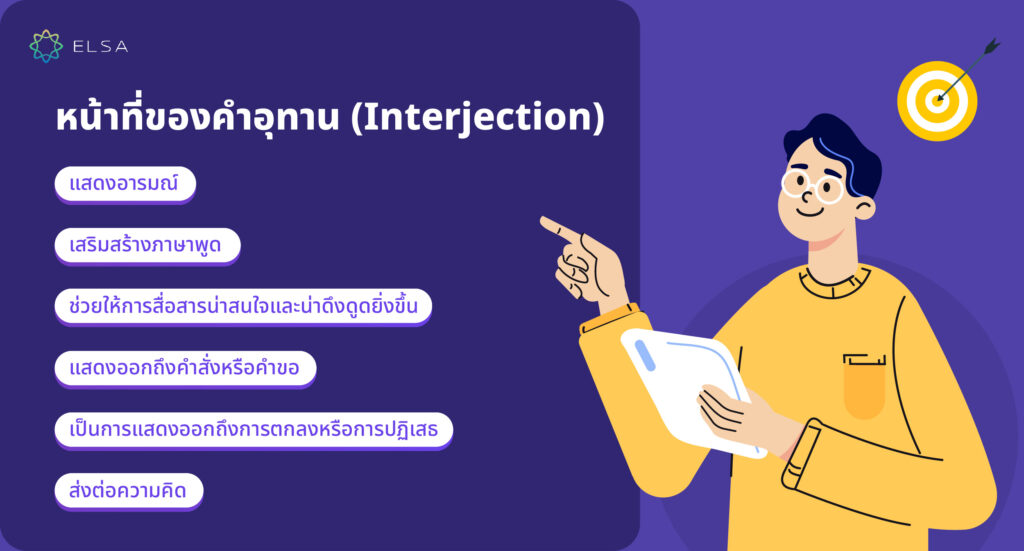
>>> Read more: 40+ ประโยคบอกว่าเห็นด้วยภาษาอังกฤษในการสื่อสารแบบไม่เป็นทางการและเป็นทางการ
หลักการใช้คำอุทาน
| Interjection หลักการใช้ | ตัวอย่าง |
| คำอุทานสามารถปรากฏที่จุดเริ่มต้นหรือจุดสิ้นสุดของประโยคได้อย่างเป็นธรรมชาติ | My mom told me to buy some milk on my way home. Oops, I forgot to do it. (แม่บอกให้ซื้อนมก่อนกลับบ้าน อุ๊ยลืมเลย) |
| เมื่อวางคำอุทานไว้ตรงกลางประโยคจะต้องคั่นด้วยเครื่องหมายจุลภาคหรือยัติภังค์ | I, uhm, want to tell you that, uhm I hate it when you slurp ramen loudly in the office. (ฉันอยากจะบอกคุณว่า ฉันเกลียดเวลาที่คุณซดราเม็งดังๆ ในออฟฟิศ) |
| หลีกเลี่ยงการใช้คำอุทานในบริบทที่เป็นทางการ เช่น การเขียนเชิงวิชาการหรือรายงานการทำงาน เพื่อรักษาความเป็นกลาง | ห้ามใช้คำอุทานในรายงานการทำงาน เอกสารวิจัยทางวิทยาศาสตร์ หรือเอกสารที่เป็นทางการ |
| ใส่ใจกับน้ำเสียงของคุณเมื่อถ่ายทอดอารมณ์ผ่านคำอุทานเพื่อให้ผู้ฟังเข้าใจอารมณ์ที่คุณต้องการถ่ายทอดได้ชัดเจน | Ah, I know what you mean. (อ๋อ ฉันรู้ว่าคุณหมายถึงอะไร) |
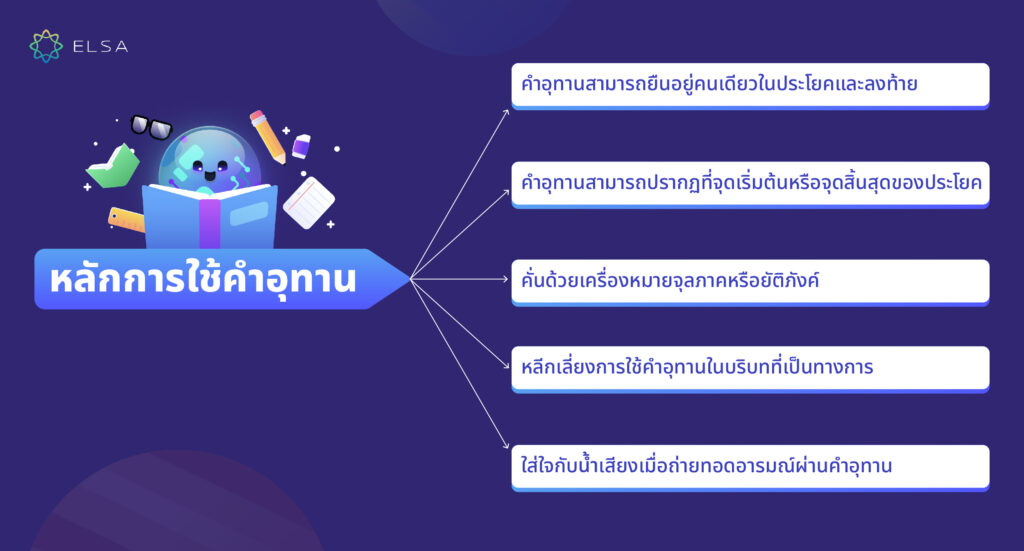
Interjection มีกี่ประเภท
คำอุทานแสดงความประหลาดใจ
| คำอุทาน | การสะกดคำ | ความหมาย | ตัวอย่าง |
| Crikey | /ˈkraɪki/ | โอ้ | Crikey! I never thought I’d see you again. (โอ้พระเจ้า! ฉันไม่เคยคิดว่าจะได้เจอคุณอีกครั้ง) |
| Hmm | /həm/ | เอ่อ… (นึกไม่ออก ไม่แน่ใจ) | Hmm… what shall we do today? (เอ่อ…วันนี้เราจะทำอะไรกันดีล่ะ?) |
| Golly | /ˈɡɒli/ | โอ้โห (คำอุทานแสดงความสงสัย / ประหลาดใจ) | Golly, it’s really raining hard! (โอ้โห ฝนตกหนักจริงๆ เลย!) |
| Egad | /ɪˈɡæd/ | คำอุทานแสดงความตกใจหรือแปลกใจ (คำโบราณ) | Egad, I didn’t expect that to happen! (โอ้พระเจ้า ฉันไม่คาดคิดว่าจะเกิดขึ้น!) |
| Indeed | /ɪnˈdiːd/ | อย่างแท้จริง โดยแท้จริง | Indeed, he has improved so much! (เขาพัฒนาขึ้นมากจริงๆ!) |
| Oh! | /oʊ/ | คำอุทานแสดงความตกใจ | Oh! I can’t believe this is happening! (โอ้! ฉันไม่เชื่อว่าสิ่งนี้จะเกิดขึ้น!) |
| Eh! | /eɪ/ | เอ๊ะ (คำอุทานแสดงความประหลาดใจ) | Eh! You mean you’ve finished it already? (เอ๊ะ! ทำเสร็จไปแล้วเหรอ?) |
| Oho! | /oʊˈhoʊ/ | โอ้โห (คำอุทานแสดงความประหลาดใจ ความปีติยินดีหรืออื่น ๆ) | Oho! That’s the spirit! (โอ้โห! นั่นคือจิตวิญญาณ!) |
| Wow! | /waʊ/ | ว้าว (คำอุทานประหลาดใจหรือยินดี) | Wow! This place is amazing! (ว้าว! ที่นี่น่าทึ่งมาก!) |
| Gee | /dʒiː/ | คำอุทานแสดงความประหลาดใจ ความกระตือรือร้นหรือการย้ำ | Gee, I didn’t know you could do that! (โอ้ ฉันไม่รู้ว่าคุณสามารถทำแบบนั้นได้!) |
| Ho | /hoʊ/ | คำอุทานแสดงความประหลาดใจ ดีใจ เรียกร้องความสนใจ | Ho, there’s a rainbow over there! (เฮ้ย มีรุ้งอยู่ตรงนั้น!) |
| Uh | /ʌ/ | คำอุทานแสดงความสงสัยหรือความแปลกใจ | Uh, are you sure about that? (เอ่อ คุณแน่ใจแล้วเหรอ?) |
| Oh my | /oʊ maɪ/ | คำอุทานแสดงความสงสารเวทนา | Oh my, I can’t believe she said that! (โอ้พระเจ้า ฉันไม่เชื่อเลยว่าเธอพูดแบบนั้น!) |
| Oh my god | /oʊ maɪ ɡɒd/ | โอ้พระเจ้า | Oh my god! I’ve never seen anything like this before! (โอ้พระเจ้า! ฉันไม่เคยเห็นอะไรแบบนี้มาก่อน!) |
| Oh my goodness | /oʊ maɪ ˈɡʊdnəs/ | พระเจ้าช่วย โอ้ว พระเจ้า | Oh my goodness, look at how big it’s grown! (โอ้พระเจ้า ดูสิว่ามันใหญ่ขนาดไหน) |

คำอุทานแสดงความดีใจ
| คำอุทาน | การสะกดคำ | ความหมาย | ตัวอย่าง |
| Yay | /jeɪ/ | เสียงหัวเราะ เสียงเฮ | Yay! We’re going to the beach tomorrow! (เย้! พรุ่งนี้เราจะไปเที่ยวทะเลกันแล้ว !) |
| Woohoo | /ˈwuːˌhuː/ | คำอุทานแสดงความตื่นเต้นมีความสุข | Woohoo! We finally did it! (ว้าว! ในที่สุดเราก็ทำสำเร็จแล้ว!) |
| Hooray | /hʊˈreɪ/ | คำอุทานแสดงความยินดี | Hooray! Our team won the championship! (เย้ๆ ทีมเราชนะเลิศแล้ว!) |
| Yippee | /ˈjɪpi/ | คำอุทานแสดงความปีติยินดี ประหลาดใจ | Yippee! School’s out for the summer! (เย้! โรงเรียนปิดเทอมแล้ว!) |
| Bravo | /ˈbrɑːvoʊ/ | ไชโย เก่งจริง | Bravo! That was an amazing performance! (เยี่ยมมาก! การแสดงสุดยอดจริงๆ!) |
| Hallelujah | /ˌhælɪˈluːjə/ | คำอุทานสรรเสริญพระผู้เป็นเจ้า / แสดงความโล่งใจ | Hallelujah! The test results are all good. (ฮัลเลลูยาห์ ขอให้ผลสอบออกมาดีนะ ทุกคน) |
| Whee | /wiː/ | คำอุทานแสดงถึงความดีใจ ตื่นเต้น หรือสนุกสนาน | Whee! This roller coaster is amazing! (ว้าว! รถไฟเหาะนี้สุดยอดจริงๆ!) |
| Yayness | /jeɪnəs/ | คำอุทานแสดงถึงความยินดี | Yayness! I got the job! (เย้ๆ ได้งานแล้ว!) |
| Yesss | /jɛs/ | คำอุทานแสดงออกถึงความพึงพอใจอย่างมีอารมณ์ขัน | Yesss! I got the highest score in class! (เย้ๆ! ได้คะแนนสูงสุดในชั้นเรียนแล้ว เย้!) |
| Hip hip hooray | /hɪp hɪp hʊˈreɪ/ | คำอุทานแสดงความปีติยินดี | Hip hip hooray! We’re so proud of you! (ฮู ฮู่ เย่ เย้! เราภูมิใจในตัวคุณมาก!) |
| Yahoo | /ˈjæhu/ | คำอุทานแสดงความยินดี | Yahoo! I passed my exams! (ย่ะฮู้!! ฉันสอบผ่านแล้ว!) |
| Alright | /ɔːlˈraɪt/ | สุดยอด เยี่ยม (พอใจ) | Alright! Everything is going as planned. (โอเค! ทุกอย่างเป็นไปตามแผน) |
| Fantastic | /fænˈtæstɪk/ | มหัศจรรย์ เยี่ยมยอด | Fantastic! You got the promotion! (เยี่ยมมาก! คุณได้รับการเลื่อนตำแหน่ง!) |
| Sweet | /swiːt/ | คำอุทานแสดงความดีใจและความพึงพอใจ | Sweet! I got tickets to the concert! (เย้! ได้บัตรคอนเสิร์ตแล้ว!) |
| Awesome | /ˈɔːsəm/ | สุดยอด (แสดงความชื่นชม) | Awesome! Let’s celebrate tonight. (เยี่ยมเลย! งั้นเรามาฉลองกันเลยคืนนี้) |
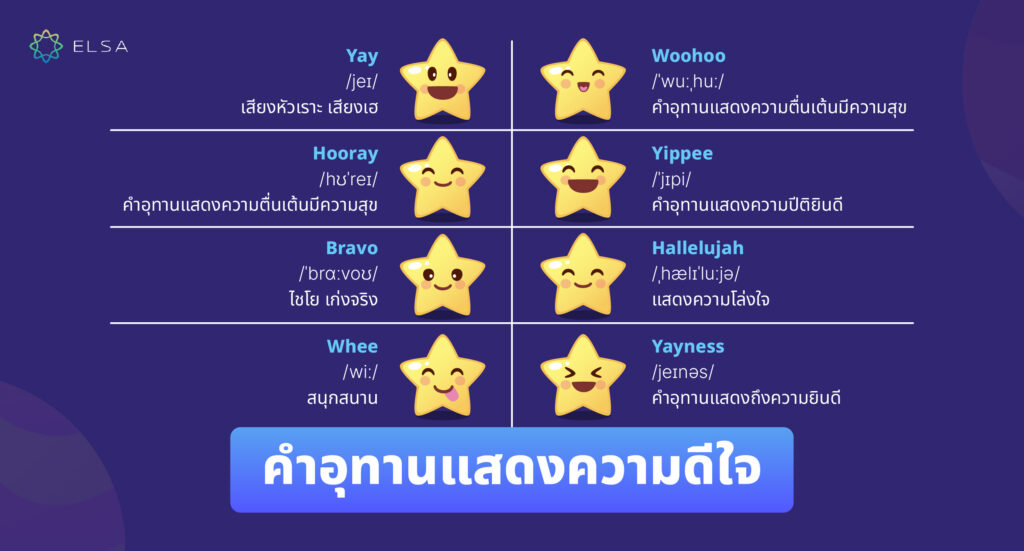
คำอุทานแสดงความโกรธ
| คำอุทาน | การสะกดคำ | ความหมาย | ตัวอย่าง |
| Ugh | /ʌɡ/ | คำอุทานแสดงความรังเกียจไม่พอใจหรืออื่น ๆ | Ugh! I can’t believe it’s raining again! (โอ้ย! ไม่น่าเชื่อว่าฝนจะตกอีกแล้ว!) |
| Argh | /ɑːɡ/ | เสียงโวยวาย แสดงความไม่พอใจ | Argh! I forgot my keys at home! (อ๊าก! ฉันลืมกุญแจไว้ที่บ้าน!) |
| Grr | /ɡɜːr/ | โกรธ | Grr! Why won’t this work?! (โอ๊ย ทำไมมันถึงไม่ได้ผลล่ะ?!) |
| Darn | /dɑːrn/ | คำที่เปล่งออกมาแสดงอาการรังเกียจสิ่งใดสิ่งหนึ่ง | Darn! I missed the bus! (บ้าเอ้ย! ฉันมาไม่ทันรถบัส!) |
| Shoot | /ʃuːt/ | เฮ้ย | Shoot! I left my wallet at home. (เฮ้ย! ฉันลืมกระเป๋าสตางค์ไว้ที่บ้าน) |
| Drat | /dræt/ | คำอุทานแสดงความรำคาญ / สับสน | Drat! The printer’s out of ink again! (โถ่! หมึกปริ้นเตอร์หมดอีกแล้ว!) |
| Blast | /blæst/ | คำอุทานแสดงความโกรธ | Blast! I forgot my password! (เฮ้ย! ฉันลืมรหัสผ่านแล้ว!) |
| Rats | /ræts/ | คำอุทานแสดงความผิดหวัง ความรังเกียจหรืออื่น ๆ | Rats! My phone just died. (เฮ้อ! โทรศัพท์ของฉันเพิ่งจะพัง) |
| Dang | /dæŋ/ | โอ้ย | Dang! I spilled coffee on my shirt. (โอ้ย! กาแฟหกใส่เสื้อฉัน) |
| For Pete’s sake | /fɔːr piːts seɪk/ | แสดงความแปลกใจ ไม่พอใจ | For Pete’s sake! Can you be quiet?! (ฮื้อ! เงียบได้ไหม?!) |
| Oh, come on | /oʊ kʌm ɒn/ | เฮ้ย | Oh, come on! That’s just unfair! (เฮ้ย! มันไม่ยุติธรรมเลย!!) |
| Jeez | /dʒiːz/ | แสดงถึงความประหลาดใจ หรือรำคาญ | Jeez! How many times do I have to tell you? (โอ้พระเจ้า ฉันบอกคุณกี่ครั้งแล้ว?) |
| Bother | /ˈbɒðər/ | วุ้ย (โกรธ) | Bother! I forgot to save the document. (วุ้ย! ลืมบันทึกไฟล์) |
| D’oh | /doʊ/ | คำที่เน้นมุมมองความรู้สึกเจ็บปวด | D’oh! I left my phone at work. (โธ่! ฉันลืมโทรศัพท์ไว้ที่ที่ทำงาน) |
| Tsk | /tsk/ | แสดงความไม่พอใจ | Tsk! This is not what I expected at all. (อ้าว! นี่ไม่ใช่สิ่งที่ฉันคาดหวังเลย) |

คำอุทานแสดงความโศกเศร้า
| คำอุทาน | การสะกดคำ | ความหมาย | ตัวอย่าง |
| Oh no | /oʊ noʊ/ | โอ้ไม่ | Oh no! I lost my favorite bracelet. (โอ้ไม่! ฉันทำสร้อยข้อมือเส้นโปรดของฉันหาย) |
| Sigh | /saɪ/ | เฮ้อ | Sigh… I really miss those days. (เฮ้อ…คิดถึงวันเก่าๆจังเลย) |
| Alas | /əˈlæs/ | อนิจจา โถ | Alas, I couldn’t make it in time. (โถ! ฉันมาไม่ทันเวลา) |
| Oh dear | /oʊ dɪr/ | โอ้ โธ่ | Oh dear, I’m sorry to hear that. (โอ้! ฉันเสียใจที่ได้ยินเช่นนั้น) |
| Poor me | /pʊr miː/ | เฮ้อ | Poor me, I have no one to talk to. (เฮ้อ! ฉันไม่มีใครคุยด้วยเลย) |
| Boohoo | /ˈbuːhuː/ | คำแทนเสียงร้องในภาษาเขียน | Boohoo! I really wanted to go to that concert. (ฮืออออ! ฉันอยากไปคอนเสิร์ตนั้นจริงๆ) |
| Oh well | /oʊ wɛl/ | เอาล่ะ | Oh well, I guess it wasn’t meant to be. (เอาล่ะ! ฉันเดาว่ามันคงไม่ใช่แบบนั้น) |
| Aw man | /ɔː mæn/ | โอ้โห โธ่เอ๊ย | Aw man, I forgot my wallet at home. (โอ้โห! ฉันลืมกระเป๋าสตางค์ไว้ที่บ้าน) |
| Oh bother | /oʊ ˈbɒðər/ | โธ่เอ๊ย | Oh bother! I missed the deadline. (โธ่เอ๊ย! ฉันลืมกำหนดเวลา) |
| Bummer | /ˈbʌmər/ | น่าเสียดาย เสียใจ | Bummer, we won’t have a vacation this year. (โอ้โหน่าเสียดาย! ปีนี้เราจะไม่ได้พักร้อนเลย) |
| So sad | /soʊ sæd/ | เศร้ามาก | So sad… he didn’t get the job. (เศร้านะ!… เขาไม่ได้รับงาน) |
| Too bad | /tuː bæd/ | เสียใจมาก | Too bad you can’t join us tonight. (เสียใจมากที่คุณไม่สามารถเข้าร่วมกับเราคืนนี้ได้) |
| What a pity | /wɒt ə ˈpɪti/ | น่าเสียดาย | What a pity you missed the show. (ปัทโธ่ คุณเสียใจการแสดง) |
| Sob | /sɒb/ | สะอื้นสะอื้น | Sob… I can’t believe it’s over. (ฮือ…ไม่น่าเชื่อว่าจะจบแล้ว) |
| Oh, alas | /oʊ əˈlæs/ | คำอุทานแสดงความเศร้าหรือเสียใจ | Oh, alas, I am left with nothing. (โอ้ เสียดายที่ฉันไม่เหลืออะไรเลย) |
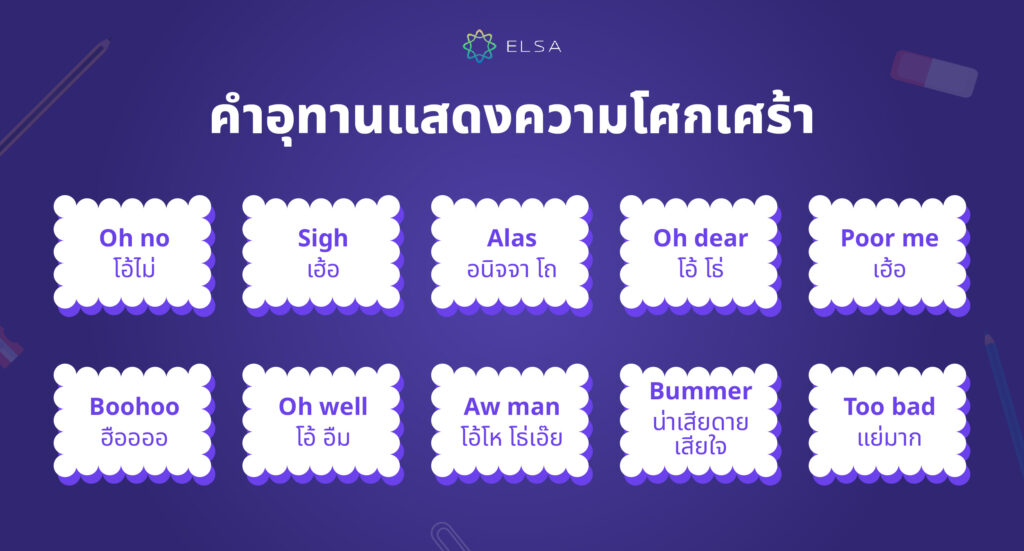
คำอุทานแสดงถึงความไม่สบาย
| Interjection คําศัพท์ | การสะกดคำ | ความหมาย | ตัวอย่าง |
| Eww | /ɛu/ | อี๋ | Eww, what is that smell? (เอ๋ย นั่นกลิ่นอะไรนะ?) |
| Yuck | /jʌk/ | ยี้ | Yuck! I don’t want to eat that. (ยี้! ฉันไม่อยากกินมัน) |
| Phew | /pjuː/ | ว้า | Phew, that was a close call! (ว้า! เกือบไปแล้ว) |
| Faugh | /fɔː/ | คำอุทานแสดงความรังเกียจ | Faugh! This is disgusting! (ฮึ่ม! นี่มันน่ารังเกียจ!) |
| Bah | /bɑː/ | คำอุทานแสดงความดูถูก หรือความรำคาญ | Bah! This is not what I expected. (เฮ้ย! นี่ไม่ใช่สิ่งที่ฉันคาดหวังไว้) |
| Pooh | /puː/ | คำอุทานแสดงการดูถูกเหยียดหยาม | Pooh! That’s ridiculous! (บ้า! ไร้สาระมาก!) |
| Shoo | /ʃuː/ | คำอุทานเพื่อขับไล่หรือตะเพิด | Shoo! Get away from me! (เห้ย! ออกไป!) |
| Yah | /jɑː/ | คำอุทานแสดงความรังเกียจหรือรำคาญ | Yah, that’s just gross! (ฮึ่ม! น่ารังเกียจมาก!!) |
| Oi | /ɔɪ/ | คำอุทานแสดงความไม่พอใจ | Oi, that’s not right! (เฮ้ย! ไม่ถูกต้องนะ!) |

คำอุทานแสดงน้ำเสียง
| คำอุทาน | การสะกดคำ | ความหมาย | ตัวอย่าง |
| Mmm | /mː/ | ใช้เมื่อไม่เห็นด้วยกับบางสิ่ง แสดงความไม่แน่ใจ | Mmm, this cake is delicious! (อืม เค้กอันนี้อร่อยจังเลย!) |
| Shhh | /ʃ/ | ใช้เวลาที่จะบอกให้อีกฝ่ายเงียบ ๆ คล้ายภาษาไทยคือ “ชู่ว” | Shhh! Be quiet during the movie. (ชู่ว ระหว่างดูหนังเงียบๆ หน่อยนะ) |
| Ouch | /aʊtʃ/ | คำอุทานแสดงความเจ็บปวดอย่างกะทันหัน | Ouch! That hurts! (โอ๊ยยย เจ็บจังเลย!) |
| Ah | /ɑː/ | คำอุทานแสดงความเข้าใจ ความประหลาดใจ | Ah, now I understand! (อ๋อ เข้าใจแล้ว!) |
| Gasp | /ɡæsp/ | คำอุทานแสดงความตกใจความ ความเจ็บปวด | Gasp! Did you see that? (อุ๊ย! คุณเห็นไหมว่า?) |
| Hooray | /həˈreɪ/ | เย้ ไชโย | Hooray! We won the game! (เย้! เราชนะแล้ว!) |
| Whoops | /wʊps/ | คำอุทานแสดงความประหลาดใจ ความอาย | Whoops! I dropped the glass. (อุ๊ย! ฉันทำแก้วหล่น) |
| Yay | /jeɪ/ | คำอุทานของการเฉลิมฉลองหรือชัยชนะ | Yay! It’s my birthday! (เย้ๆ วันเกิดฉันแล้ว!) |
| Ahem | /əˈhɛm/ | คำอุทานเรียกความสนใจ | Ahem! Can I have your attention, please? (อะแฮ่ม! โปรดฟังผมหน่อยได้ไหม?) |
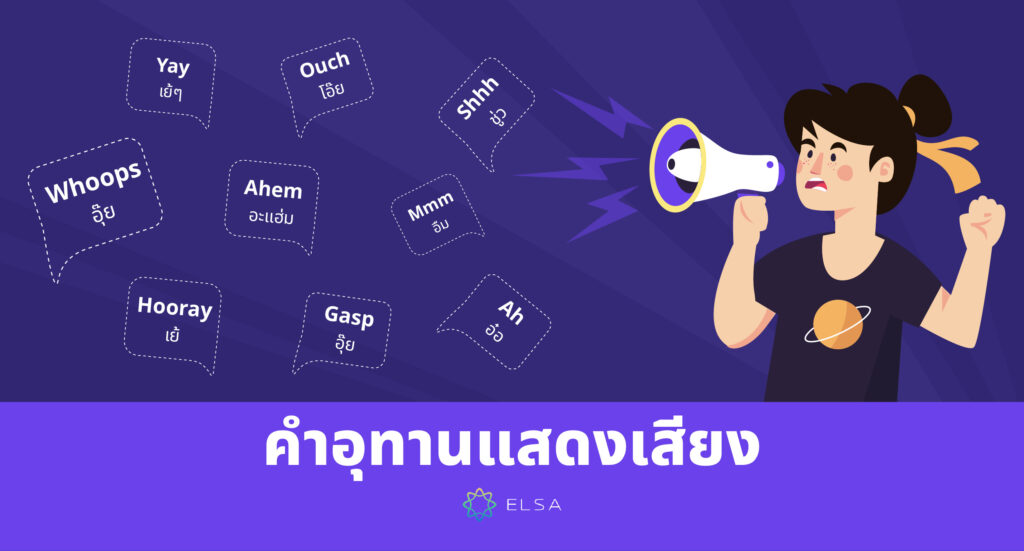
คำอุทานทั่วไป
| คำอุทาน | การสะกดคำ | ความหมาย | ตัวอย่าง |
| Thank God | /θæŋk ɡɒd/ | ขอบคุณพระเจ้า | Thank God you’re safe! (ขอบคุณพระเจ้าที่คุณปลอดภัย!) |
| Oh dear | /oʊ dɪr/ | อุ๊ยตาย | Oh dear, what happened to your car? (อุ๊ยตาย! รถของคุณเกิดอะไรขึ้น?) |
| Oh boy | /oʊ bɔɪ/ | โอ้วว | Oh boy, that’s a lot of work. (โอ้วว! งานหนักมาก) |
| Heavens | /ˈhɛvənz/ | คำอุทานแสดงความตกใจ ประหลาดใจ | Heavens, that was a loud noise! (อุ๊ย! เสียงดังมาก) |
| Help | /hɛlp/ | คำอุทานขอความช่วยเหลือ | Help! I can’t swim! (ช่วยด้วย! ฉันว่ายน้ำไม่เป็น!) |
| Oh my God | /oʊ maɪ ɡɒd/ | โอ้ พระเจ้า | Oh my God, I can’t believe it! (โอ้พระเจ้า ฉันไม่เชื่อเลย!) |
| My goodness | /maɪ ˈɡʊdnəs/ | โอ้ | My goodness, you look amazing! (โอ้ คุณดูดีมาก!) |
| Well done | /wɛl dʌn/ | ดีจริง | Well done on passing the exam! ดีจังเลย! สอบผ่านแล้วนะ) |
| Cool | /kuːl/ | ดีจัง เท่จัง เจ๋ง | Cool! That’s a great idea. (เจ๋งมาก! เป็นความคิดที่ดี) |
| No way | /noʊ weɪ/ | ไม่มีทาง หมดหนทาง | No way, did that really happen? (ไม่มีทางเลย มันเกิดขึ้นจริงๆ เหรอ?) |
| Sweet! | /swiːt/ | เจ๋ง | Sweet! We got tickets to the concert! (เจ๋ง! ได้ตั๋วคอนเสิร์ตแล้ว!) |
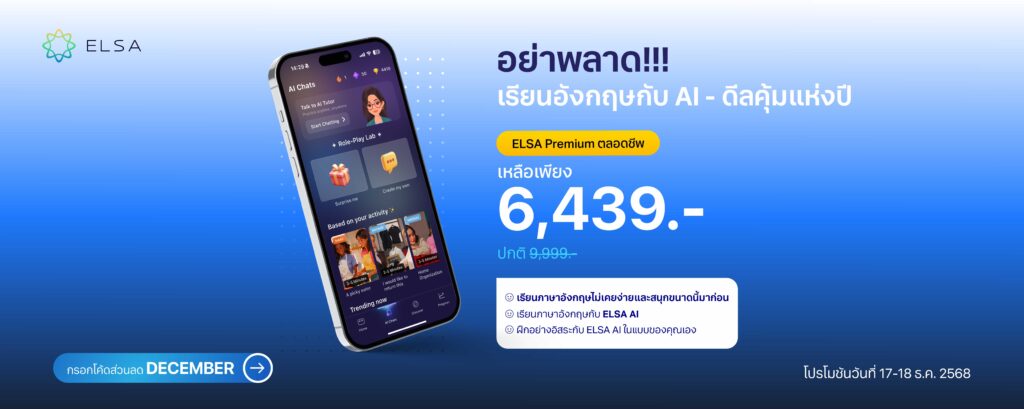
คำอุทานถือเป็นกลุ่มคำ
| วลี | ความหมาย |
| What a beautiful day! | วันนี้เป็นวันที่สวยงามจริงๆ! |
| How wonderful it is! | สุดยอดเลย! |
| What a great idea! | ไอเดียดีมาก! |
| How exciting this is! | น่าตื่นเต้นจัง! |
| What an interesting book! | หนังสือเล่มนี้น่าสนใจจริงๆ! |
| How lovely the flowers are! | สวยจังเนาะดอกไม้อ่ะ! |
| What a nice surprise! | เป็นเซอร์ไพรส์ที่ดีมาก! |
| How terrible the weather is! | อากาศแย่มากเลย! |
| What a shame it is! | น่าเสียดายจัง! |
| How sweet she is! | เธอช่างน่ารักจริงๆ! |

ประโยคอุทานภาษาอังกฤษเริ่มต้นด้วย What
| โครงสร้าง | ตัวอย่าง |
| What + a + คำนามนับไม่ได้เอกพจน์! | What a shame! (น่าเสียดายจัง!) |
| What + a (an) + คำคุณศัพท์ + คำนามนับได้เอกพจน์ + (S + Verb)! | What an amazing view (it is)! (ทำไมวิวสวยแบบนี้!!) |
| What + Adj + คำนามนับไม่ได้ + (S + Verb)! | What good luck they had! (พวกเขาโชคดีจริงๆ!) |
| What + Adj + คำนามพหูพจน์ + (S + Verb)! | What interesting books they are! หนังสือเล่มนี้น่าสนใจจริงๆ!) |
ประโยคอุทานภาษาอังกฤษเริ่มต้นด้วย How
| โครงสร้าง | ตัวอย่าง |
| How + Adj! | How nice! (ดีจริง!) |
| How + Adj/Adv + S+ Verb! | How fast that dog runs! (สุนัขตัวนั้นวิ่งเร็วมาก!) |
| How + Adj + Verb + S! | How beautiful am I! (ฉันดูสวยจัง!) |
ประโยคอุทานภาษาอังกฤษเริ่มต้นด้วย Such
| โครงสร้าง | ตัวอย่าง |
| Such + a/an + Adj + คำนามนับได้เอกพจน์ | She is such a nice girl! (เธอเป็นผู้หญิงที่น่ารักมาก!) |
| Such + Adj + คำนามนับไม่ได้ / คำนามพหูพจน์! | They are such difficult examinations! (การสอบช่างยากเหลือเกิน!) |
>>> Read more: รวบรวมความรู้ทั้งหมดเกี่ยวกับคำอุทานภาษาอังกฤษ
แบบฝึกหัดเกี่ยวกับ Interjection (คำอุทาน)
แบบฝึกหัด

แบบฝึกหัดที่ 1: เลือกคำอุทาน (interjection) ที่เหมาะสมและเติมลงในช่องว่างในแต่ละประโยคต่อไปนี้:
1. ______, I can’t believe it’s already the weekend!
2. _____, that was a close call!
3. _____, this cake tastes delicious!
4. ______, I’m so excited about our upcoming vacation.
5. _____, that was a terrible accident.
แบบฝึกหัดที่ 2: เติมคำอุทาน (interjection) ที่เหมาะสมลงในประโยคต่อไปนี้:
1. ______! I just won the lottery!
2. ______, I burned my hand on the stove.
3. ______, this book is absolutely fascinating!
4. ______, that movie was so scary.
5. ______, I can’t believe you did that!
แบบฝึกหัดที่ 3: เติมคำอุทาน (interjection) ที่เหมาะสมในประโยคต่อไปนี้เพื่อแสดงอารมณ์:
1. _____, what a surprise to see you here!
2. _____, I’m so sorry to hear about your loss.
3. _____, this is the best news I’ve heard all day!
4. _____, be careful on that icy sidewalk!
5. _____, I can’t believe we finally made it!
แบบฝึกหัดที่ 4: ค้นหาและจดคำอุทาน interjection ทั้งหมดไว้ในย่อหน้าต่อไปนี้:
Wow! Today is truly a fantastic day to explore nature. Oh, the sky is so deep blue, the clouds are floating gently, and the lush greenery is just beautiful! Look over there, there’s a flock of birds soaring on top of the mountain. Hooray! It’s such an amazing feeling to see them flying high in the sky.
I step into the woods, and Eww, there’s a worm hiding under a leaf. Ouch! Well, it’s a part of nature too, I suppose. I feel a cool breeze on my skin, making me feel refreshed. Ouch! But then, I stumble upon a tree root and almost fall. Wow, I’m lucky I didn’t get hurt!
I continue my journey, and suddenly, Alas, an unexpected rain shower begins. Nevertheless, nothing can stop me from exploring. I keep walking in the rain, and it’s such an exhilarating feeling. Bravo, Mother Nature, your beauty is endlessly marvelous!
Finally, when I reach the mountaintop, I’m amazed by the breathtaking scenery. Oh, the vast and green mountain peak, it feels like I’m on top of the world. I feel like I’m a part of nature, and I can’t help but exclaim, “Wow, this journey is truly wonderful!”
เฉลย
แบบฝึกหัดที่ 1:
1. Wow, I can’t believe it’s already the weekend!
2. Phew, that was a close call!
3. Yum, this cake tastes delicious!
4. Hooray, I’m so excited about our upcoming vacation.
5. Oh no, that was a terrible accident.
แบบฝึกหัดที่ 2:
1. Eureka! I just won the lottery!
2. Ouch, I burned my hand on the stove.
3. Fascinating, this book is absolutely fascinating!
4. Yikes, that movie was so scary.
5. Gosh, I can’t believe you did that!
แบบฝึกหัดที่ 3:
1. Oh my goodness, what a surprise to see you here!
2. Condolences, I’m so sorry to hear about your loss.
3. Hurrah, this is the best news I’ve heard all day!
4. Caution, be careful on that icy sidewalk!
5. Congratulations, I can’t believe we finally made it!
แบบฝึกหัดที่ 4:
คำอุทาน (interjection) ในย่อหน้า: Wow, Hooray, Eww, Ouch, Alas, Phew, Yikes, Gosh, Hurrah, Congratulations
ข้างต้นเป็นความรู้เกี่ยวกับคำอุทาน (Interjection) และวิธีใช้ที่นำมาให้เพื่อนๆ ทุกคน หวังว่าการแบ่งปันข้างต้นจะช่วยให้การสื่อสารภาษาอังกฤษมีประสิทธืภาพมากขึ้น นอกจากนี้อย่าลืมเข้ามาชม ELSA Speak เพื่ออัปเดทความรู้ด้านภาษาอังกฤษล่าสุดทุกวัน!
คำนำหน้านามคือคำที่มีบทบาทในการกำหนด การนับ การระบุ หรือจำกัดความหมายของคำนาม นี่เป็นองค์ประกอบที่ขาดไม่ได้ในประโยคเพราะช่วยให้ผู้พูดและผู้เขียนถ่ายทอดข้อมูลได้อย่างชัดเจนและถูกต้อง determiner มีอะไรบ้าง วิธีใช้ Determiner (คำนำหน้านาม) อย่างไร? มาเรียนรู้อย่างละเอียดกับ ELSA Speak ในบทความด้านล่างเลย!
Determiner คืออะไร
Determiners ในภาษาอังกฤษคือคำนำหน้านามหรือได้เรียกว่าคำบ่งชี้ คือคำที่ใช้ก่อนคำนามหรือคำนามวลีในประโยค วัตถุประสงค์ของคำนำหน้านามเพื่อระบุบุคคล สิ่งของ หรือปรากฏการณ์ที่ถูกกล่าวถึงในประโยค
คำนาม นามวลี หรือคำคุณศัพท์ มักจะอยู่หน้าคำเหล่านี้ ดังนั้นจึงไม่สามารถยืนอยู่คนเดียวได้แต่จะมีส่วนประกอบอื่นๆ คอยติดตามอยู่เสมอ
Determiner ตัวอย่างประโยค : There are seven books on the shelf. (บนชั้นวางมีหนังสืออยู่เจ็ดเล่ม)

Determiner ใช้ยังไง และการจำแนก
Article
Article ในภาษาอังกฤษเป็นกลุ่มคำนำหน้านามทั่วไป ในภาษาอังกฤษ Article ได้แก่ a, an, the
- The เป็น Article เฉพาะเจาะจง
- A/An เป็น Article ไม่เฉพาะเจาะจง
หน้าที่ของ Article เหล่านี้คือการพิจารณาว่าคำนามที่ตามหลังคำเหล่านี้เป็นเอกพจน์หรือพหูพจน์ และเพื่อพิจารณาว่าคำนามนั้นเฉพาะเจาะจงหรือไม่เฉพาะเจาะจง
| Article ไม่เฉพาะเจาะจง a/an | Article เฉพาะเจาะจง the | |
| วิธีใช้ | A/an + N เอกพจน์ = N ไม่เฉพาะเจาะจง | The + N (เป็นเอกพจน์นับได้/เป็นพหูพจน์นับได้/นับไม่ได้) = N เฉพาะเจาะจง |
| หน้าที่ | พูดถึงคำนามที่ผู้รับข้อมูลยังไม่รู้หรือรู้โดยทั่วไป และถูกกล่าวถึงเป็นครั้งแรกโดยผู้พูด/เขียน → จากนั้นคำนามจะถือว่าไม่เฉพาะเจาะจง | พูดเกี่ยวกับคำนามที่ผู้พูด/เขียนและผู้รับต่างรู้ชัดเจนว่าเป็นใครหรืออะไร → จากนั้นคำนามจะถือว่าเฉพาะเจาะจง |
| ตัวอย่าง | A cake is delicious. (เค้กอร่อยมาก) → ผู้พูดใช้คำ a/an พร้อมกับคำนาม cake เพื่อบอกถึงเค้กอันใดก็ตาม ดังนั้นในประโยคนี้สามารถเข้าใจได้ว่าแค่เป็นเค้กมันก็อร่อยมาก | The cake is delicious. (เค้กอันนั้นอร่อยมาก) → คำ the พร้อมกับคำนาม cake เพื่อบอกถึงเค้กโดยเฉพาะ ดังนั้น ประโยคนี้เข้าใจได้ว่าหมายถึงเค้กที่ผู้พูดและผู้รับรู้อยู่แล้วว่าอร่อย |
* ข้อควรรู้:
- เมื่อใช้ Article ไม่ชี้เฉพาะกับคำนามเอกพจน์ เราใช้ a เมื่อคำนามขึ้นต้นด้วยพยัญชนะ และใช้ an เมื่อคำนามขึ้นต้นด้วยสระ (u, e, o, a, i) ตัวอย่าง: a T-shirt, an example
- คำนามจะถูกระบุโดยการออกเสียง ไม่ใช่โดยการเขียน
ตัวอย่าง:
- Hour (ชั่วโมง) ขึ้นต้นด้วยพยัญชนะ h, แต่ออกเสียงขึ้นต้นด้วยเสียงสระ /aʊ/ (/ˈaʊər/) → an hour.
- Uniform (ชุดแต่งกาย) ขึ้นต้นด้วยสระ u, แต่เมื่อออกเสียงคำนี้เริ่มต้นด้วยพยัญชนะ /j/ (/juːnɪfɔːrm/) → a uniform.
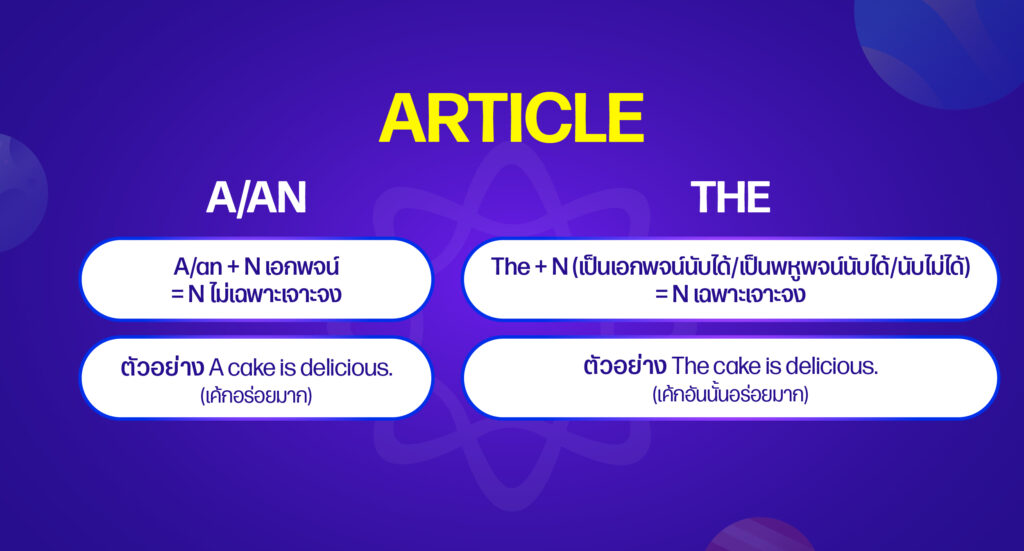
>>> Read more: A An The ใช้ยังไง ทฤษฎีและแบบฝึกหัดในภาษาอังกฤษ
คำนำหน้านามชี้เฉพาะ (Demonstrative Determiners)
คำนำหน้านามชี้เฉพาะ (Demonstrative Determiners) มีหน้าที่บอกถึงระยะห่างระหว่างวัตถุที่กำลังพูดถึง ซึ่งอยู่ห่างจากผู้พูดไกลหรือใกล้แค่ไหน นอกจากนั้น คำนำหน้านามได้แบ่งเป็น 2 ประเภท: หนึ่งคือไปพร้อมกับคำนามพหูพจน์ และสองคือไปพร้อมกับคำนามเอกพจน์หรือคำนามที่นับไม่ได้
ด้านล่างนี้คือละเอียดเกี่ยวกับโครงสร้าง วิธีใช้ของคำนำหน้านาม (Demonstrative Determiners) เพื่อให้คุณอ้างอิง:
| คำชี้เฉพาะระบุถึงสิ่งที่ใกล้ตัว This/These | คำชี้เฉพาะระบุถึงสิ่งที่ไกลตัว That/Those | |
| หน้าที่ | ระบุตำแหน่งของวัตถุนามใกล้กับผู้พูด | ระบุตำแหน่งของวัตถุนามไกลกับผู้พูด |
| วิธีใช้ + ตัวอย่าง | This + N เอกพจน์ (คนนี้/สิ่งของนี้) ตัวอย่าง: I need this book. (ฉันต้องการหนังสือเล่มนี้) → คำ this (นี้) แสดงให้เห็นว่าระยะใกล้ของผู้พูดกับหนังสือเล่มหนึ่ง ซึ่งเป็นหนังสือที่ทั้งผู้พูดและผู้ฟังเข้าใจได้ว่าคือหนังสือเล่มใด | That + N เอกพจน์ (คนนั้น/สิ่งของนั้น) ตัวอย่าง: I hate that dog. It often bites me. (ฉันไม่ชอบสุนัขตัวนั้น เพราะมันกัดฉันบ่อยๆ) → คำ that (นั้น) แสดงให้เห็นว่าระยะไกลของผู้พูดกับสุนัขตัวหนึ่งที่ทั้งผู้พูดและผู้ฟังระบุได้ว่าสุนัขตัวไหนอยู่ไกล |
| These + N พหูพจน์ (คนนี้/สิ่งของนี้) ตัวอย่าง: I need these books. (ฉันต้องการหนังสือเหล่านี้) → คำ these (นี้) แสดงให้เห็นว่าระยะใกล้ของผู้พูดกับหนังสือเหล่านี้ ซึ่งเป็นหนังสือที่ทั้งผู้พูดและผู้ฟังเข้าใจได้ว่าคือหนังสือพวกไหน | Those + N พหูพจน์ (คนนั้น/สิ่งของนั้น) ตัวอย่าง: I hate those dogs. They often bite me. (ฉันไม่ชอบสุนัขพวกนั้น พวกมันกัดฉันบ่อยๆ) → คำ those (นั้น) แสดงให้เห็นว่าระยะไกลของผู้พูดกับสุนัขหลายตัวที่ทั้งผู้พูดและผู้ฟังระบุได้ว่าสุนัขตัวใดอยู่ไกล |
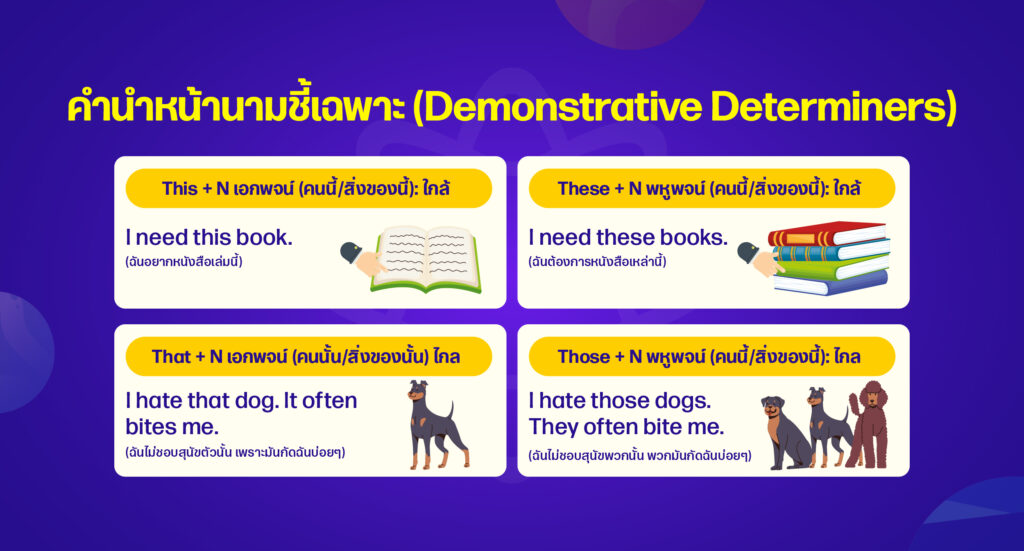
คำนำหน้านามแสดงความเป็นเจ้าของ (Possessive Determiners)
คำนำหน้านาม (Possessive Determiners) เป็นคำที่ใช้ระบุถึงความเป็นเจ้าของของบุคคล สิ่งของ สำหรับบุคคล สิ่งของอื่น ดังนั้นหลังคำนำหน้านามมักใช้คำนาม คำนำหน้านามแสดงความเป็นเจ้าของ (Possessive determiners) ได้แก่: my, his, her, your, our, their, its, เทียบเท่ากับคำศัพท์ส่วนตัว 7 คำในภาษาอังกฤษ I, he, she, you, we, they, it.
ตัวอย่าง: What is it? – It’s my book (นั้นคืออะไร? – นั้นคือหนังสือของฉัน)
→ My (ของฉัน) ถือเป็นผู้กำหนดความเป็นเจ้าของในการยืนยันความเป็นเจ้าของหนังสือว่าเป็นของฉัน
คำนำหน้านามแสดงความเป็นเจ้าของ ได้แก่ คำคุณศัพท์แสดงความเป็นเจ้าของของบุคคลและสัมพันธการกสำหรับคำนามและชื่อเฉพาะ คำคุณศัพท์แสดงความเป็นเจ้าของและ
วิธีสร้างความเป็นเจ้าของ ได้แก่
| คำนำหน้านามแสดงความเป็นเจ้าของ | แปล | ตัวอย่าง |
| My | ของฉัน | This is my car. (นี่เป็นรถของฉัน) |
| His | ของเขา (ผู้ชาย) | I met a friend at the park. His name is Tom. (ฉันพบเพื่อนที่สวนสาธารณะ ชื่อของเขาคือทอม) |
| Her | ของเขา (ผู้หญิง) | I admire her dedication to her work. (ฉันชื่นชมความทุ่มเทของเขากับการทำงานของเขา) |
| Their | ของเขาเหล่านั้น | The Smiths love to decorate their house for the holidays. (ครอบครัว Smith ชอบตกแต่งบ้านของเขาในช่วงวันหยุด) |
| Our | ของเรา | We are going on vacation with our friends next month. (เราจะไปเที่ยวพักผ่อนกับเพื่อนของเราในเดือนหน้า) |
| Its | ของมัน | The cat is cleaning its fur. (แมวกำลังทำความสะอาดขนของมัน) |
*ข้อควรรู้: คำนำหน้านามแสดงความเป็นเจ้าของหรือที่เรียกว่าคำคุณศัพท์แสดงความเป็นเจ้าของนั้นแตกต่างกับคำสรรพนามแสดงความเป็นเจ้าของ คำนำหน้านามแสดงความเป็นเจ้าของจะอยู่หน้าคำนามเสมอ (my + N), ส่วนคำสรรพนามแสดงความเป็นเจ้าของใช้แทนนามวลี (mine = my + N)
ตัวอย่าง:
- These are his shoes. (คำนำหน้านามแสดงความเป็นเจ้าของ)
- These shoes are his. (คำสรรพนามแสดงความเป็นเจ้าของ)
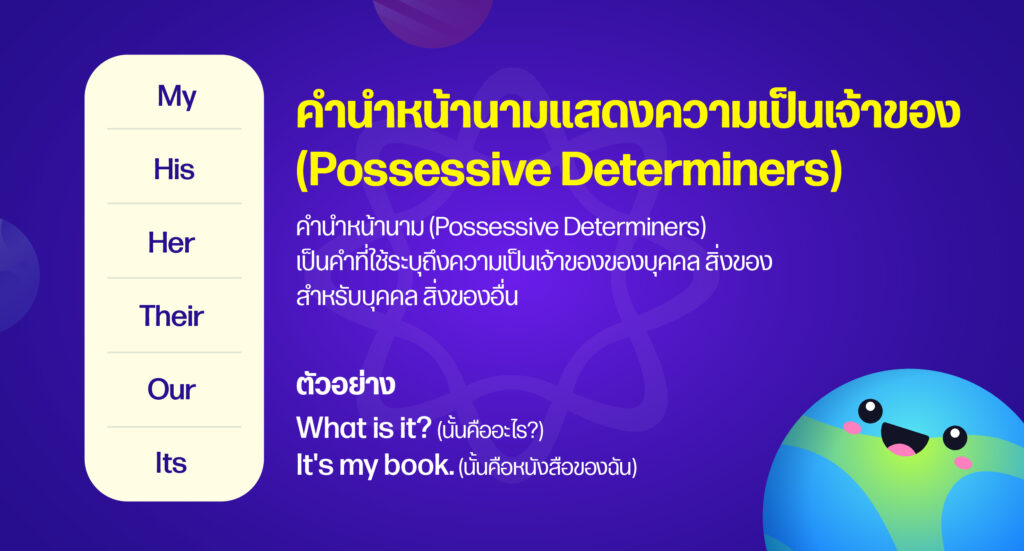
>>> Read more: รวบรวมความรู้เกี่ยวกับคุณศัพท์เจ้าของในภาษาอังกฤษ (Possessive adjectives)
คำนำหน้านามเพื่อบอกปริมาณ (Quantifiers)
คำนำหน้านามเพื่อบอกปริมาณมีมีลักษณะดังต่อไปนี้
- คำนำหน้านามระบุปริมาณเฉพาะ เช่น จำนวนนับและเลขลำดับ: one (หนึ่ง), two (สอง), three (สาม), first (ที่แรก), second (ที่สอง), third (ที่สาม)…คำเหล่านี้เรียกว่าคำตัวเลข
- คำนำหน้านามระบุปริมาณมาก/น้อยโดยทั่วไป เช่น: (a) few (น้อย), fewer (น้อยกว่า), (a) little (น้อย), many (มาก), much (มาก), plenty (มาก), any (ไม่มี), some (บางส่วน), enough (พอ), … คำเหล่านี้เรียกว่าปริมาณ
ในแง่ของฟังก์ชัน คำนำหน้านามระบุปริมาณช่วยระบุจำนวนเฉพาะหรือไม่ทราบแน่ชัดของคำนามที่มาพร้อมกับคำนามนั้น ดังนั้น คำเชิงปริมาณและตัวเลขจะต้องอยู่หน้าคำนามที่ไม่ชี้กำหนดเสมอเพื่อระบุปริมาณเฉพาะของคำนามนั้น หรือคำเชิงปริมาณและตัวเลขจะมาพร้อมกับตัวกำหนดอื่นๆ แล้วจะรวมกับคำนาม
ด้านล่างนี้เป็นรายละเอียดเกี่ยวกับโครงสร้างและการใช้คำสรรพนามสาธิตเพื่อให้คุณอ้างอิง
| ตัวเลข | ปริมาณ | |
| หน้าที่ | หมายถึงปริมาณเฉพาะของคำนามที่มาพร้อมกับมัน | หมายถึงจำนวนไม่แน่นอนของคำนามหลักที่มาพร้อมกับมัน |
| วิธีใช้ + ตัวอย่าง | ตัวเลข (นับ)+ คำนามนับได้ (เอกพจน์/พหูพจน์) • ตัวอย่าง: One paper (กระดาษหนึ่งแผ่น) → One คือเลขลำดับ The + จำนวนคำ (เลขลำดับ) + คำนามนับได้ (เอกพจน์/พหูพจน์) • ตัวอย่าง: The second dogs (สุนัขตัวที่สอง)→ Second (ที่สอง) เป็นตัวกำหนดจำนวนนับ | ปริมาณ (a) few, many, plenty, any, some, enough,…) + คำนามนับได้พหูพจน์ • ตัวอย่าง: Many chairs (เก้าอี้หลายตัว) • ตัวอย่าง: Some people (บางคน) คำปริมาณ (a) little, much, plenty, any, some, enough,…) + คำนามนับไม่ได้ • ตัวอย่าง: Enough water (น้ำเพียงพอ), Much food (อาหารเยอะ) |
| จำนวนคำ + of + จำนวนคำ/the/these/those/คำเป็นเจ้าของ + คำนามนับได้พหูพจน์ ตัวอย่าง: One of the students (หนึ่งในนักเรียน) Three of 20 people agreed with your idea. (ผู้สามคนใน 20 คนเห็นด้วยกับความคิดเห็นของคุณ) | คำปริมาณ + of + the/these/those/คำเป็นเจ้าของ +คำนามนับได้พหูพจน์/ คำนามนับไม่ได้ ตัวอย่าง: Some of my friends (เพื่อนของฉันบางคน) Much of the food on the table has already been eaten. (อาหารบนโต๊ะถูกกินไปมากแล้ว) |
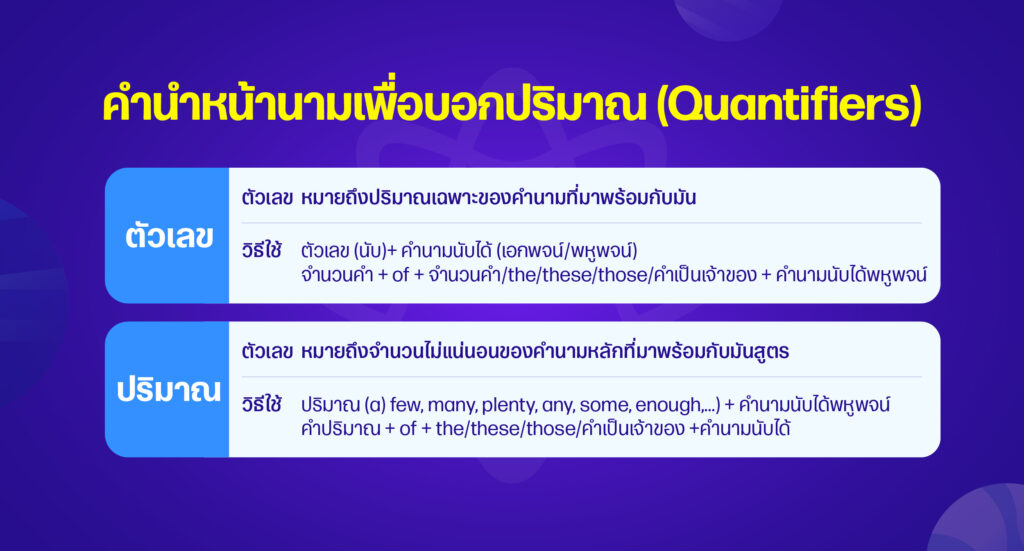
คำนำหน้านามใช้ถาม (Interrogative Determiners)
คำนำหน้านามใช้ถาม (interrogative determiners) ใช้ในการถามเพื่อหาข้อมูลเพิ่มเติมเกี่ยวกับคำนามที่อยู่ข้างหน้า มีทั้หมด 3 คำ ได้แก่
| คำนำหน้านามใช้ถาม | ความหมายและวิธีใช้ | ตัวอย่าง |
| Whose | ใช้แสดงความเป็นเจ้าของ มักใช้ในอนุประโยคสัมพัทธ์ – คำสรรพนามสัมพัทธ์ | Whose car is parked in front of the house? (รถของใครจอดอยู่หน้าบ้าน?) |
| What | ใช้เพื่อขอข้อมูลเฉพาะเกี่ยวกับบุคคล สิ่งของ หรือเหตุการณ์ | What movie are you planning to watch tonight? (คืนนี้คุณวางแผนที่จะดูหนังเรื่องไหน?) |
| Which | คล้ายกับ What, แต่ใช้เพื่อถามเกี่ยวกับข้อมูลเฉพาะของกลุ่มที่เจาะจง | Among the five paintings, which one is your favorite? (จากภาพวาดทั้งห้าภาพ คุณชอบภาพไหนมากที่สุด?) |

>>> Read more: WH question คืออะไร วิธีการใช้ WH question พร้อมตัวอย่างแบบละเอียด
คำนำหน้านามเพื่อบอกการแบ่งส่วน
คำนำหน้านามเพื่อบอกการแบ่งส่วน เป็นคำที่อ้างถึงบางส่วน ทั้งหมด หรือไม่มีเลยของบุคคลในกลุ่มวัตถุ คำนำหน้านามเพื่อบอกการแบ่งส่วนทั่วไปในกลุ่มนี้ได้แก่
- Either (หนึ่งในระหว่างสอง)
- Neither (ไม่ทั้งสอง)
- Both (ทั้งสอง)
- Each (แต่ละ)
- Every (ทุก)
- Most (ส่วนใหญ่)
- All (ทั้งหมด)…
คำนำหน้านามเพื่อบอกการแบ่งส่วนสามารถใช้ร่วมกับคำนามเอกพจน์หรือทั้งเอกพจน์และพหูพจน์ก็ได้ ขึ้นอยู่กับวิธีการใช้ของคำนั้น
คุณสามารถดูวิธีใช้ที่เฉพาะเจาะจงมากขึ้นและตัวอย่างที่ชัดเจนสำหรับคำนำหน้านามเพื่อบอกการแบ่งส่วนได้ในตารางด้านล่าง
| คำนำหน้านามเพื่อบอกการแบ่งส่วน | |
| หน้าที่ | ระบุส่วนหนึ่ง ทั้งหมด หรือไม่มีเลยในกลุ่มคำนามที่ตามหลังคำนำหน้านามเหล่านี้ |
| วิธีใช้ + ตัวอย่าง | Either/Neither/Each/Every + คำนามเอกพจน์ • Every day is a gift. (ทุกวันคือของขวัญ) • Neither student was good at Math. (ไม่มีนักเรียนที่เก่งคณิตศาสตร์เลย) Either/Neither/Each/Every one + of + จำนวนคำ/the/these/those/คำแสดงความเป็นเจ้าของ + คำนามพหูพจน์ • Each of the houses is different. (บ้านแต่ละหลังมีความแตกต่างกัน) • Every one of the students is here. (นักเรียนทุกคนอยู่ที่นี่) • Either of the two books is fine. (หนึ่งในสองเล่มก็ได้) • Neither of the boys wants to go. (เด็กชายทั้งสองคนไม่อยากไป) ข้อควรรู้ : Either แค่ใช้เพื่อพูดคุยเกี่ยวกับสองสิ่งหรือสองทางเลือกเท่านั้น เมื่อมีมากกว่าสองตัวเลือก เราจะใช้คำที่แตกต่างกัน เช่น some any หรือ one of ขึ้นอยู่กับบริบท ตัวอย่าง : • We have chocolate and vanilla ice cream. You can choose either flavor. (เรามีไอศกรีมช็อกโกแลตและวานิลลา คุณสามารถเลือกหนึ่งในสองรสชาติ) → ใช้ either เมื่อพูดเกี่ยวกับ 2 ตัวเลือก • We have chocolate, vanilla, and strawberry ice cream. You can choose one of them. (เรามีไอศกรีมช็อกโกแลต วานิลลา และสตรอเบอร์รี่ คุณสามารถเลือกรสชาติได้) → One of ใช้แทนให้ either เมื่อจำนวนตัวเลือกมากกว่า 2 เพื่อแสดงความหมายที่เหมาะสม |
| Both + คำนามพหูพจน์ ตัวอย่าง: Both students are tall. (นักเรียนทั้งสองตัวสูง) Both + of + the/these/those/คำแสดงความเป็นเจ้าของ/สรรพนามกรรม + คำนามพหูพจน์ ตัวอย่าง: Both of your sons are friendly. (ลูกชายทั้งสองของคุณเป็นมิตรมาก) |
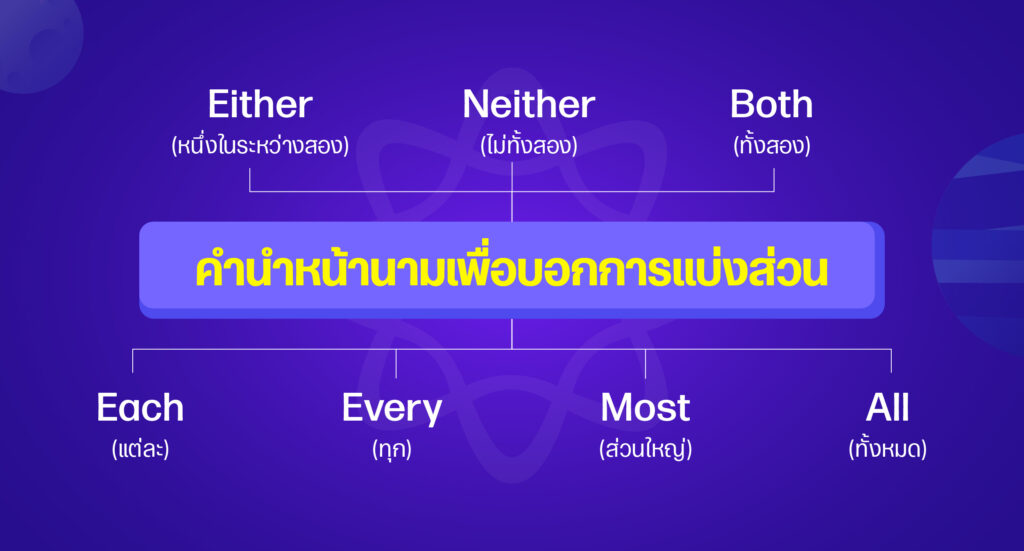
คำนำหน้านามเพื่อบอกความแตกต่าง
กลุ่มคำนำหน้านามแสดงถึงความแตกต่างประกอบด้วย 3 คำที่มีความหมายต่างกัน ได้แก่: Another, other, the other ทั้ง 3 คำนี้หมายถึงคนหรือสิ่งของอื่นที่ไม่ใช่วัตถุ/สิ่งของประเภทเดียวกัน แต่มีความแตกต่างในวิธีการใช้ในประโยค
| Another | Other | The other | |
| หน้าที่ | ระบุถึงสิ่งอื่นๆ ได้เติมในสิ่งที่กล่าวไว้ก่อนหน้านี้ | ระบุถึงสิ่งที่แตกต่างจากที่กล่าวไว้ก่อนหน้านี้ | ระบุถึงสิ่งที่เหลือจากที่ระบุไว้ก่อนหน้านี้ |
| วิธีใช้ | Another + คำนามนับได้เอกพจน์ I need another pen. (ฉันอยากได้ปากกาอีกด้าม) → another (อีกอันหนึ่ง) บ่งบอกว่าผู้พูดมีปากกาอยู่แล้วและต้องการปากกาอีกอัน | Other + คำนามพหูพจน์ Besides teaching, I have other things to do. (นอกจากสอนแล้วผมยังมีอย่างอื่นต้องทำอีก) → other (อื่นๆ อีกมากมาย) แสดงว่าผู้พูดมีกิจกรรมอื่นๆ มากมาย นอกเหนือจากการสอน | The other + คำนามพหูพจน์ = คนหรือสิ่งของที่เหลืออยู่ในกลุ่ม Besides your 2 best friends, you don’t seem to care about the other people in the class. (นอกจากเพื่อนสนิทสองคนของคุณแล้ว ดูเหมือนว่าคุณจะไม่สนใจคนอื่นๆ ในชั้นเรียนเลย) |
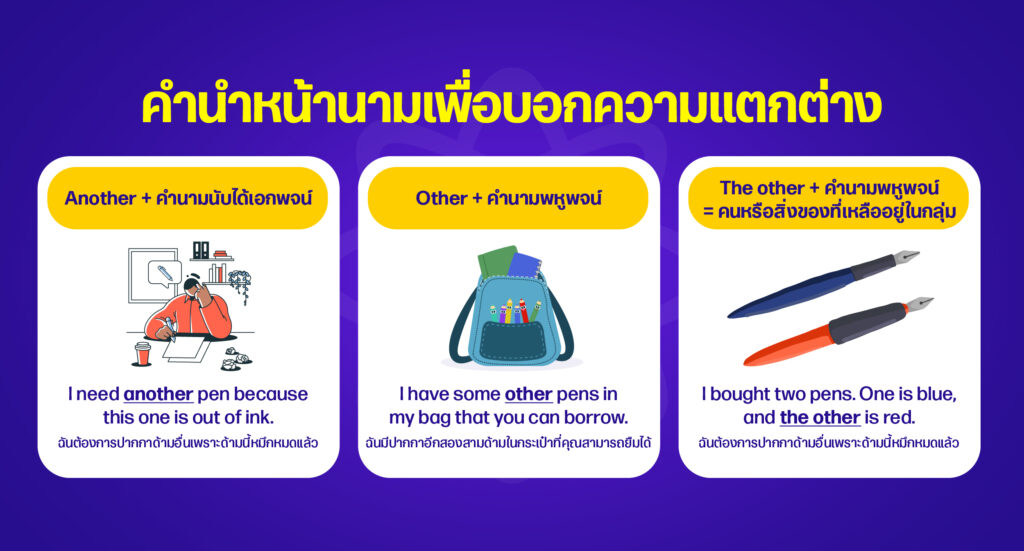
หน้าที่และตำแหน่งของ Determiner (คำนำหน้านาม)
หน้าที่ของคำนำหน้านาม (Determiner)
| หน้าที่ | ตัวอย่าง |
| แนะนำเกี่ยวกับคำนามทั่วไปที่อยู่หลังคำนำหน้านามและคำนามนั้นถือว่าไม่เฉพาะเจาะจง | I want to buy an apple. (ฉันอยากซื้อแอปเปิ้ลหนึ่งลูก) → An คือคำนำหน้านามและใช้เพื่อแนะนำคำนาม apple เพราะผู้ที่ได้รับข้อมูลในประโยคนี้ไม่รู้ว่าแอปเปิ้ลที่ถูกพูดถึงนั้นคือแอปเปิ้ลใด ดังนั้น แอปเปิลจึงถือเป็นคำนามไม่เฉพาะเจาะจง |
| ระบุและชี้แจงคำนามประกอบและคำนามที่ถือว่าเจาะจง | I like this cat. (ฉันชอบแมวตัวนี้) → This (นี้) คือคำนำหน้านามและใช้เพื่อระบุคำนาม cat (แมว) ซึ่งเป็นแมวตัวนี้ คำนำหน้านาม this ช่วยผู้พูดและผู้ฟังมุ่งไปแมวที่กำลังพูดถึง เพราะฉะนั้น this cat ถือเป็นคำนามที่เจาะจง |

ตำแหน่งของคำนำหน้านาม (Determiner)
คำนำหน้านามในภาษาอังกฤษมี 2 ตำแหน่งเฉพาะ คือ อยู่หน้าคำนามหรืออยู่หน้านามวลี ตัวอย่าง:
- หน้าคำนาม ตัวอย่าง: Each student is required to submit their assignment by Friday. (นักเรียนแต่ละคนจะต้องส่งการบ้านภายในวันศุกร์)
- หน้านามวลี ตัวอย่าง: Some of the best ideas come from collaborative work between departments. (แนวคิดที่ดีที่สุดบางส่วนมาจากการทำงานร่วมกันระหว่างแผนกต่างๆ)

การแยกแยะระหว่างคำนำหน้านามและคำสรรพนาม
| จำแนก | ลักษณะเฉพาะ | ตัวอย่าง |
| คำสรรพนาม | สามารถยืนอยู่คนเดียว โดยทำหน้าที่เป็นประธาน/กรรมในประโยค โดยไม่จำเป็นต้องใช้ร่วมกับคำนาม/วลีอื่น | They completed the project on time. (พวกเขาทำโครงการเสร็จตรงเวลา) -> They คือคำสรรพนาม ไม่จำเป็นต้องใช้ร่วมกับคำนาม |
| คำนำหน้านาม | ต้องใช้ร่วมกับคำนาม/นามวลีบางคำในประโยคเพื่อขยายความให้กับคำนามนั้น | Their project received positive feedback. (โครงการของพวกเขาได้รับการตอบรับเชิงบวก) -> Their คือคำนำหน้านาม ขยายความให้ project |
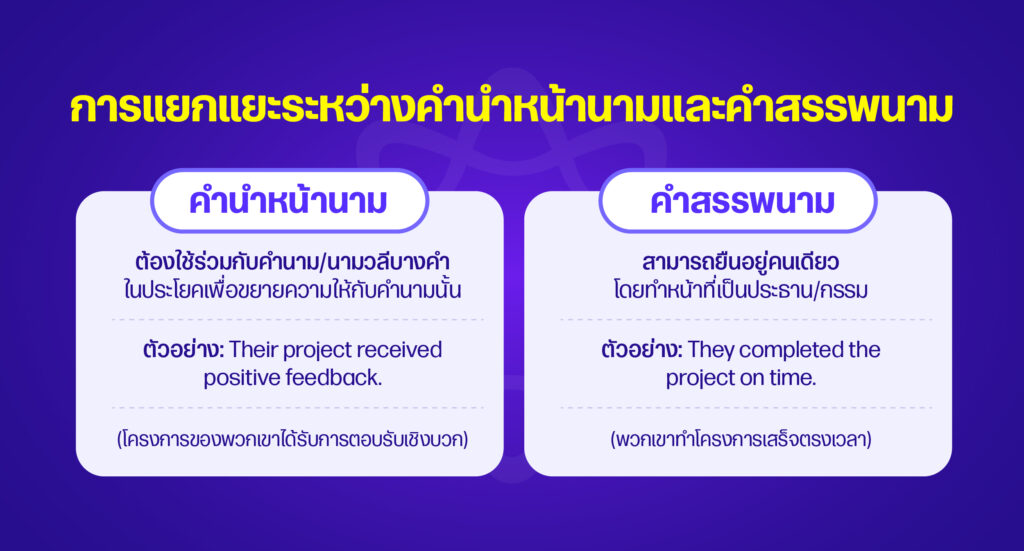
คำถามที่พบบ่อย
Determiner มีกี่ประเภท
คำนำหน้านามมี 7 ประเภทหลัก ได้แก่
- Article (คำนำหน้านาม)
- คำนำหน้านามชี้เฉพาะ (Demonstrative Determiners)
- คำนำหน้านามแสดงความเป็นเจ้าของ (Possessive Determiners)
- คำนำหน้านามเพื่อบอกปริมาณ (Quantifiers)
- คำนำหน้านามใช้ถาม (Interrogative Determiners)
- คำนำหน้านามเพื่อบอกการแบ่งส่วน
- คำนำหน้านามเพื่อบอกความแตกต่าง
วิธีอ่านคำนำหน้านาม
Determiner อ่านว่ายังไง ด้านล่างนี้เป็นตารางสรุปวิธีการอ่านคำนำหน้านามทั่วไป
| คำนำหน้านาม | วิธีการอ่านคำนำหน้านาม | แปล |
| the | /ðə/ (หน้าพยัญชนะ) หรือ /ðiː/ (หน้าสระ) | สิ่งของ, คน (เจาะจง) |
| a | /ə/ | หนึ่ง (ไม่เฉพาะเจาะจง) |
| an | /æn/ | หนึ่ง (ไม่เฉพาะเจาะจง, หน้าสระ) |
| some | /sʌm/ | บางส่วน, บางอัน |
| any | /ˈɛni/ | ใครก็ได้, อะไรก็ได้ |
| much | /mʌtʃ/ | มาก (ใช้กับคำนามนับไม่ได้) |
| many | /ˈmɛni/ | มาก (ใช้กับคำนามนับได้) |
| few | /fjuː/ | น้อย (ใช้กับคำนามนับได้) |
| a few | /ə fjuː/ | บางส่วน (ใช้กับคำนามนับได้) |
| a little | /ə ˈlɪtəl/ | น้อยมาก (ใช้กับคำนามนับไม่ได้) |
| a lot of | /ə lɒt əv/ | มากๆ |
| all | /ɔːl/ | ทั้งหมด |
| several | /ˈsɛvrəl/ | บาง |
| each | /iːtʃ/ | แต่ละ |
| every | /ˈɛvri/ | ทุก ทั้งหมด |
| this | /ðɪs/ | อันนี้ |
| that | /ðæt/ | อันนั้น |
| these | /ðiːz/ | เหล่านี้ |
| those | /ðoʊz/ | เหล่านั้น |

ELSA Premium Lifetime
9,999 บาท ->6,439 บาท

ELSA Pro Lifetime
3,659 บาท ->2,799 บาท

ELSA Premium 1 year
8,497 บาท ->2,885 บาท

ELSA Pro 1 year
2,499 บาท ->1,528 บาท
แบบฝึกหัดเกี่ยวกับคำนำหน้านาม
แบบฝึกหัด
แบบฝึกหัดที่ 1: เติมคำลงในช่องว่างด้วยคำนำหน้านามที่เหมาะสมในประโยคต่อไปนี้
a) Could you pass me _____ salt, please? (a, the, some)
b) She bought _____ new dress for the party. (a, the, some)
c) I need to buy _____ groceries on my way home. (a, the, some)
d) We saw _____ beautiful sunset on our vacation. (a, the, some)
e) He gave me _____ advice on how to fix my computer. (a, the, some)
แบบฝึกหัดที่ 2: เติมคำ other, another หรือ the other ในช่องว่างในประโยคต่อไปนี้
a) I have two cups of coffee. Would you like _____ one?
b) I have a red pen, but I need _____ one.
c) There are two cats in the room. _____ cat is sleeping.
d) She has two brothers. _____ brother is an engineer.
e) I bought one book, but I want to buy _____ book as well.
แบบฝึกหัดที่ 3: เลือกคำบอกปริมาณที่เหมาะสมเพื่อเติมลงในช่องว่างในประโยคต่อไปนี้
a) I have _____ apples in my bag. (a few, a little, many)
b) We need _____ chairs for the meeting. (a few, a little, many)
c) There is _____ sugar left in the container. (a few, a little, much)
d) She has _____ friends coming to her party. (a few, a little, many)
e) He has _____ experience in this field. (a few, a little, much)
เฉลย
แบบฝึกหัดที่ 1
| a) | b) | c) | d) | e) |
| the | a | some | a | some |
แบบฝึกหัดที่ 2
| a) | b) | c) | d) | e) |
| another | the other | The other | The other | the other |
แบบฝึกหัดที่ 3
| a) | b) | c) | d) | e) |
| a few | a few | a little | many | a little |
คำนำหน้านาม (Determiner) เป็นองค์ประกอบสำคัญในภาษาอังกฤษที่มีส่วนช่วยในด้านไวยากรณ์และอรรถศาสตร์เพื่อช่วยให้ประโยคถูกต้องและสมบุรณ์ หวังว่าบทความนี้จะช่วยให้คุณเข้าใจเพิ่มเติมเกี่ยวกับ Determiner (คำนำหน้านาม) และวิธีใช้คำนำหน้านามในภาษาอังกฤษ นอกจากนี้อย่าลืมเข้าชม ELSA Speak เพื่อเรียนภาษาอังกฤษทุกวันนะ!
คําศัพท์ในโรงเรียน ภาษาอังกฤษ เป็นพื้นฐานที่สำคัญ ซึ่งไม่เพียงสนับสนุนนักนักเรียนและนักศึกษาในการอ่านเพื่อความเข้าใจและการทำการบ้านเท่านั้น แต่ยังช่วยให้พวกเขาสื่อสารกับครูและเพื่อน ๆ ได้อย่างมั่นใจอีกด้วย มาเรียนรู้คําศัพท์ต่าง ๆ เพื่อพัฒนาทักษะภาษาอังกฤษของคุณกับ ELSA Speak กันนะ
แนะนําคำศัพท์ภาษาอังกฤษเกี่ยวกับโรงเรียน
การเรียนรู้คำศัพท์เกี่ยวกับโรงเรียนในภาษาอังกฤษเป็นขั้นตอนสำคัญที่จะช่วยให้ผู้เรียนมีความมั่นใจและยืดหยุ่นสําหรับการสื่อสารในสภาพแวดล้อมการเรียนรู้ หมวดคำศัพท์นี้ประกอบด้วยคำศัพท์ที่พบบ่อย เช่น ชื่อวิชา อุปกรณ์ในห้องเรียน ชื่อโรงเรียน และกิจกรรมการเรียนรู้ประจำวัน
คำศัพท์เกี่ยวกับโรงเรียนจะมีประโยชน์อย่างยิ่งไม่เพียงแต่สำหรับนักเรียนเท่านั้น แต่ยังสำหรับใครก็ตามที่ต้องการขยายคลังคําศัพท์ภาษาอังกฤษเพื่อสื่อสารอย่างมีประสิทธิภาพในบริบททางวิชาการและสังคมด้วย

คำศัพท์เกี่ยวกับ สถานที่ในโรงเรียน ภาษาอังกฤษ
เมื่อเรียนคำศัพท์ภาษาอังกฤษที่ใช้ในโรงเรียน การเรียนรู้คำศัพท์เกี่ยวกับสถานที่เรียนในโรงเรียนจะช่วยให้คุณเข้าใจและนำไปใช้ในการสื่อสารได้ดีขึ้น
| สถานที่เรียนในโรงเรียน | แปล | การออกเสียง | ตัวอย่างและความหมาย |
| Schoolhouse | อาคารเรียน | /ˈskuːl.haʊs/ | The old schoolhouse still stands. (อาคารเรียนเก่ายังคงตั้งอยู่) |
| Schoolyard | สนามโรงเรียน | /ˈskuːl.jɑːrd/ | Students gather in the schoolyard. (นักเรียนรวมตัวกันในสนามโรงเรียน) |
| The music room | ห้องดนตรี | /ðə ˈmjuː.zɪk ruːm/ | She practices piano in the music room. (เธอฝึกเล่นเปียโนในห้องดนตรี) |
| The art room | ห้องศิลปะ | /ðə ɑːrt ruːm/ | The art room is filled with paintings. (ห้องศิลปะเต็มไปด้วยภาพวาด) |
| The computer room | ห้องคอมพิวเตอร์ | /ðə kəmˈpjuː.tər ruːm/ | Students use the computer room for research. (นักเรียนใช้ห้องคอมพิวเตอร์เพื่อทําการวิจัย) |
| The lockers | ตู้เก็บของ | /ðə ˈlɑː.kərz/ | They keep their books in the lockers. (พวกเขาเก็บหนังสือของพวกเขาไว้ในตู้ล็อคเกอร์) |
| The pool | สระว่ายน้ำ | /ðə puːl/ | The pool is used for swimming lessons. (สระว่ายน้ำนี้ใช้สำหรับการเรียนว่ายน้ำ) |
| The baseball field | สนามเบสบอล | /ðə ˈbeɪs.bɔːl fiːld/ | We practice on the baseball field. (เรากำลังฝึกซ้อมกันที่สนามเบสบอล) |
| The toilet | ห้องน้ำ | /ðə ˈtɔɪ.lɪt/ | The toilet is near the classroom. (ห้องน้ำอยู่ใกล้ห้องเรียน) |
| Supervisor room | ห้องหัวหน้า | /ˈsuː.pər.vaɪ.zər ruːm/ | Teachers meet in the supervisor room. (ครูพบกันที่ห้องหัวหน้า) |
| Office of Academic Affairs | สำนักงานวิชาการ | /ˈɒf.ɪs əv ˌæk.əˈdɛm.ɪk əˈfeəz/ | The Office of Academic Affairs assists students. (สำนักงานวิชาการ ทำหน้าที่เป็นผู้ให้ความช่วยเหลือนักเรียน) |
| Clerical department | แผนกธุรการ | /ˈkler.ɪ.kəl dɪˈpɑːrt.mənt/ | Documents are handled by the clerical department. (เอกสารต่าง ๆ จะถูกจัดการโดยแผนกธุรการ) |
| Principal’s office | ห้องทำงานผู้อํานวยการ | /ˈprɪn.sə.pəlz ˈɒf.ɪs/ | The principal’s office is on the second floor. (ห้องทํางานผู้อำนวยการอยู่ชั้นสอง) |
| Security section | แผนกรักษาความปลอดภัย | /sɪˈkjʊər.ɪ.ti ˈsɛk.ʃən/ | The security section monitors the school entrance. (แผนกรักษาความปลอดภัยคอยดูแลบริเวณทางเข้าโรงเรียน) |
| The Youth Union room | ห้องสมาพันธ์เยาวชน | /ðə juːθ ˈjuː.njən ruːm/ | Meetings are held in the Youth Union room. (การประชุมจัดขึ้นที่ห้องสมาพันธ์เยาวชน) |
| Traditional room | ห้องประเพณี | /trəˈdɪʃ.ən.əl ruːm/ | Photos of alumni are displayed in the traditional room. (ภาพถ่ายของศิษย์เก่าถูกจัดแสดงไว้ในห้องประเพณี) |
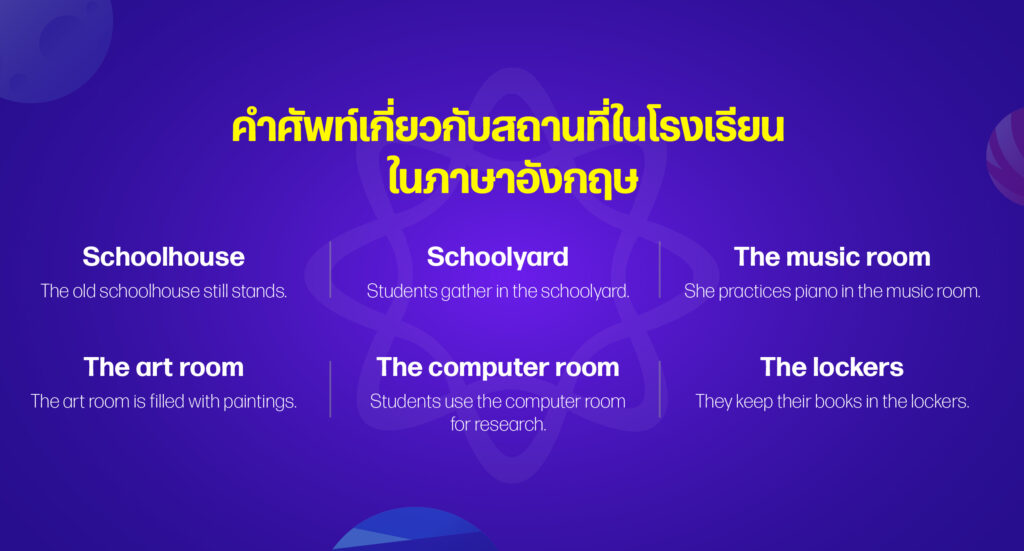
คำศัพท์ภาษาอังกฤษเกี่ยวกับสิ่งของในโรงเรียนและอุปกรณ์การเรียน
คำศัพท์ภาษาอังกฤษเกี่ยวกับสิ่งของในโรงเรียนเป็นแหล่งการเรียนรู้ที่จำเป็นเพื่อช่วยให้คุณพูดคุยเกี่ยวกับสิ่งของต่าง ๆ เช่น ดินสอ สมุดบันทึก ไม้บรรทัด และอื่น ๆ การรู้ชื่อและการออกเสียงของสิ่งของเหล่านี้จะช่วยทำให้การเรียนรู้ง่ายขึ้นและสนุกยิ่งขึ้น มาเรียนรู้คำศัพท์ที่จำเป็นต่อไปนี้เพื่อการสื่อสารในห้องเรียนอย่างมั่นใจกันนะ
| คําศัพท์ | แปล | การออกเสียง | ตัวอย่างและความหมาย |
| Blackboard | กระดานดำ | /ˈblæk.bɔːrd/ | The teacher wrote on the blackboard. (ครูเขียนบนกระดานดำ) |
| Attendance | การเข้าเรียน | /əˈtɛn.dəns/ | Attendance is very important for students. (การเข้าเรียนเป็นเรื่องสำคัญมากสำหรับนักเรียน) |
| Course | คอร์สเรียน | /kɔːrs/ | I am taking a math course. (ฉันกำลังเรียนคาบเรียนของวิชาคณิตศาสตร์) |
| Projector | โปรเจ็กเตอร์ | /prəˈdʒɛk.tər/ | We watched a video using the projector. (เราชมวิดีโอโดยใช้โปรเจ็กเตอร์) |
| Subject | วิชาเรียน | /ˈsʌb.dʒɪkt/ | Math is my favorite subject. (คณิตศาสตร์เป็นวิชาเรียนโปรดของฉัน) |
| Chalk | ชอล์ก | /tʃɔːk/ | The teacher used chalk to write on the board. (ครูใช้ชอล์กเขียนบนกระดาน) |
| Semester | ภาคเรียน | /sɪˈmɛs.tər/ | The semester will end in December. (ภาคเรียนนี้จะสิ้นสุดในเดือนธันวาคม) |
| Timetable | ตารางเรียน | /ˈtaɪmˌteɪ.bəl/ | I follow my timetable to organize my classes. (ฉันทำตามตารางเวลาเพื่อจัดชั้นเรียนของฉัน) |
| Homework | การบ้าน | /ˈhoʊmˌwɜrk/ | We have math homework to complete. (เรามีการบ้านคณิตศาสตร์ที่ต้องทำ) |
| Exercise book | สมุดแบบฝึกหัด | /ˈɛk.sər.saɪz bʊk/ | Please bring your exercise book to class. (กรุณานำสมุดแบบฝึกหัดของคุณมาเรียนด้วย) |
| Test paper | กระดาษข้อสอบ | /tɛst ˈpeɪ.pər/ | We need test paper for the exam. (เราจำเป็นต้องมีกระดาษข้อสอบสำหรับการสอบ) |
| Sound system | เครื่องเสียง | /saʊnd ˈsɪs.təm/ | The sound system is ready for the event. (ระบบเสียงพร้อมสำหรับงานแล้ว) |
| Pencil case | กล่องใส่ดินสอ | /ˈpɛn.səl keɪs/ | She keeps her pens in a pencil case. (เธอเก็บปากกาของเธอไว้ในกล่องดินสอ) |
| Paint | สีวาดรูป | /peɪnt/ | The art room has various colors of paint. (ห้องศิลปะมีสีวาดรูปหลากหลายสี) |
| Protractor | ไม้บรรทัด | /prəˈtræk.tər/ | Use the protractor to measure the angle. (ใช้ไม้บรรทัดวัดมุม) |
| Fountain pen | ปากกาหมึกซึม | /ˈfaʊn.tɪn pɛn/ | She prefers writing with a fountain pen. (เธอชอบเขียนด้วยปากกาหมึกซึม) |
| Ballpoint pen | ปากกาลูกลื่น | /ˈbɔːl.pɔɪnt pɛn/ | I bought a new ballpoint pen. (ฉันซื้อปากกาลูกลื่นใหม่) |
| Correction pen | ปากกาลบคำผิด | /kəˈrɛk.ʃən pɛn/ | Use the correction pen to cover mistakes. (ใช้ปากกาลบคําผิดเพื่อปกปิดข้อผิดพลาด) |
| Crayon | ดินสอสีเทียน | /ˈkreɪ.ɒn/ | The children are drawing with crayons. (เด็ก ๆ กำลังวาดรูปด้วยดินสอสีเทียน) |
| Stapler | แม็กเย็บกระดาษ | /ˈsteɪ.plər/ | Please use the stapler to bind the papers. (กรุณาใช้แม็กเย็บกระดาษเพื่อเข้าเล่มเอกสาร) |
| Coloured pencil | ดินสอสี | /ˈkʌl.ərd ˈpɛn.səl/ | She uses coloured pencils for her art. (เธอใช้ดินสอสีสําหรับงานศิลปะของเธอ) |
| Set square | ไม้ฉากสามเหลี่ยม | /sɛt skweər/ | We used a set square in geometry class. (เราใช้ไม้ฉากสามเหลี่ยมจัตุรัสในชั้นเรียนเรขาคณิต) |
| Push pin | หมุด | /ˈpʊʃ ˌpɪn/ | I used a push pin to attach the note. (ฉันใช้หมุดเพื่อติดกระดาษโน้ต) |
| Paper clips | ลวดหนีบกระดาษ | /ˈpeɪ.pər klɪps/ | She used paper clips to keep her notes together. (เธอใช้ลวดหนีบกระดาษเพื่อรวบรวมโน๊ตของเธอไว้ด้วยกัน) |
| Sticky notes | กระดาษโน้ต (โพสต์อิท) | /ˈstɪk.i nəʊts/ | Write it down on a sticky note. (เขียนมันลงบนกระดาษโน้ต (โพสต์อิท)) |
| Binder clip | คลิปหนีบกระดาษ | /ˈbaɪn.dər klɪp/ | Use a binder clip to hold the documents. (ใช้คลิปหนีบกระดาษเพื่อยึดเอกสาร) |
| Lanyard | สายคล้องคอ | /ˈlæn.jərd/ | Each student has a lanyard for their ID card. (นักเรียนแต่ละคนมีสายคล้องคอสําหรับ ID card ของตนเอง) |
| Calculator | เครื่องคิดเลข | /ˈkæl.kjəˌleɪ.tər/ | We use a calculator for math problems. (เราใช้เครื่องคิดเลขเพื่อแก้ปัญหาทางคณิตศาสตร์) |
| Folder | แฟ้มเอกสาร | /ˈfəʊl.dər/ | Put these papers in the folder. (ใส่เอกสารเหล่านี้ลงในแฟ้มเอกสาร) |
| Pencil sharpener | กบเหลาดินสอ | /ˈpɛn.səl ˈʃɑːrp.nər/ | Use the pencil sharpener if your pencil is dull. (ถ้าดินสอของคุณทื่อ ให้ใช้เครื่องเหลาดินสอ) |
| Tape | เทป | /teɪp/ | I used tape to seal the package. (ฉันใช้เทปปิดผนึกบรรจุภัณฑ์) |
| Tape dispenser | แท่นวางสก๊อตเทป | /teɪp dɪˈspɛnsər/ | The tape dispenser is on the desk. (แท่นวางสก๊อตเทปอยู่บนโต๊ะ) |
| Name tag | ป้ายชื่อติดสมุด | /neɪm tæɡ/ | Write your name on the name tag. (เขียนชื่อของคุณบนป้ายชื่อติดสมุด) |
| Swivel chair | เก้าอี้ล้อเลื่อน | /ˈswɪv.əl tʃɛər/ | The teacher’s desk has a swivel chair. (ที่โต๊ะครูมีเก้าอี้ล้อเลื่อนหนึ่งตัว) |
| Waste basket | ถังขยะ | /ˈweɪst ˌbæs.kɪt/ | Throw the paper in the waste basket. (ทิ้งกระดาษลงในถังขยะ) |
| Glue | กาว | /ɡluː/ | We used glue for the art project. (เราใช้กาวสำหรับโครงการศิลปะ) |
| School bag | กระเป๋านักเรียน | /ˈskuːl bæɡ/ | He carries his books in his school bag. (เขาพกหนังสือไว้ในกระเป๋านักเรียนของเขา) |
| Map | แผนที่ | /mæp/ | There’s a map of the world in the classroom. (มีแผนที่โลกอยู่ในห้องเรียน) |
| Globe | ลูกโลก | /ɡloʊb/ | The globe helps us learn geography. (ลูกโลกช่วยให้เราเรียนรู้ภูมิศาสตร์) |
| Magnifying glass | แว่นขยาย | /ˈmæɡ.nɪˌfaɪ.ɪŋ ɡlæs/ | We used a magnifying glass to examine the details. (เราใช้แว่นขยายเพื่อตรวจสอบรายละเอียด) |
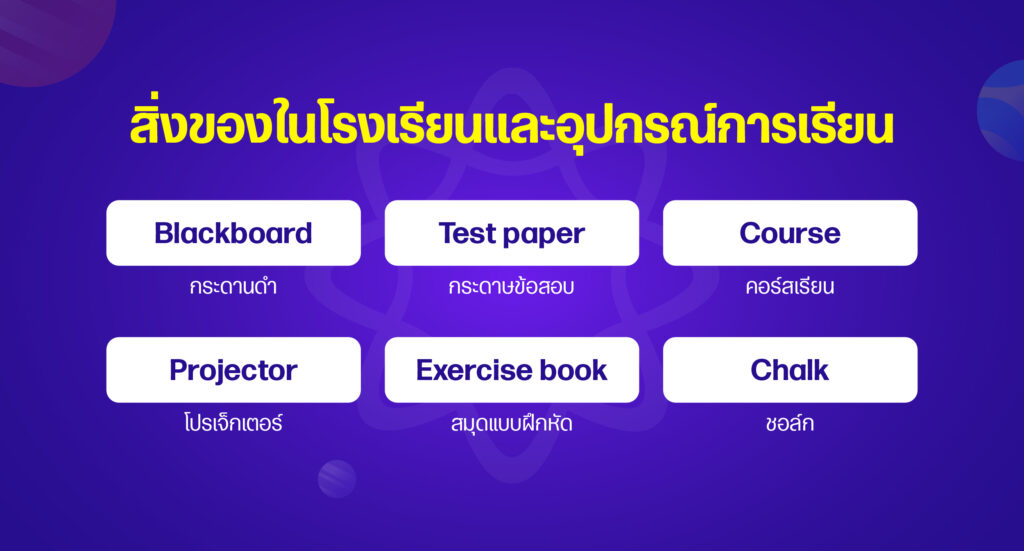
>>> Read more: รวบรวม 150+ คำศัพท์เครื่องเขียนภาษาอังกฤษที่ใช้บ่อยที่สุด
คำศัพท์ที่แสดงบทบาทและตำแหน่งในโรงเรียน
คำศัพท์ที่แสดงบทบาทและตำแหน่งในโรงเรียน ที่เกี่ยวข้องกับตำแหน่งและบทบาทในโรงเรียนจะช่วยให้คุณระบุและตั้งชื่อตำแหน่งที่คุ้นเคย เช่น ครู ครูใหญ่ หรือหัวหน้าห้องได้อย่างง่ายดาย คำศัพท์เหล่านี้เป็นคำศัพท์ที่ขาดไม่ได้ ซึ่งจะช่วยคุณในการแนะนำบุคลากรและบทบาทของพวกเขาในสภาพแวดล้อมการเรียน นอกจากนี้ การทำความเข้าใจแต่ละบทบาทยังช่วยให้คุณใช้คำศัพท์ได้อย่างถูกต้องในการสื่อสารอีกด้วย
| บทบาทและตำแหน่งในโรงเรียน | แปล | การออกเสียง | ตัวอย่างและความหมาย |
| Teacher | ครู | /ˈtiː.tʃər/ | My teacher is very helpful. (ครูของฉันช่วยเหลือฉันมากมาย) |
| Principal | ครูใหญ่/อาจารย์ใหญ่ | /ˈprɪn.sɪ.pəl/ | The principal gave a speech at the assembly. (ครูใหญ่กล่าวสุนทรพจน์ในที่ประชุม) |
| Counselor | ผู้ให้คําปรึกษา | /ˈkaʊn.səl.ər/ | I spoke to the counselor about my career choices. (ฉันพูดคุยกับผู้ให้คําปรึกษาเกี่ยวกับทางเลือกอาชีพของฉัน) |
| Librarian | บรรณารักษ์ | /laɪˈbrɛər.i.ən/ | The librarian helped me find a book. (บรรณารักษ์ช่วยฉันหาหนังสือ) |
| Janitor | นักการภารโรง | /ˈdʒæn.ɪ.tər/ | The janitor cleans the school every evening. (นักการภารโรงทำความสะอาดโรงเรียนทุกเย็น) |
| Student | นักเรียน/นักศึกษา | /ˈstjuː.dənt/ | Every student must attend class. (นักเรียนทุกคนจะต้องเข้าเรียน) |
| Class President | หัวหน้าห้อง | /klæs ˈprɛz.ɪ.dənt/ | She was elected as the class president. (เธอได้รับเลือกให้เป็นหัวหน้าห้อง) |
| Teaching Assistant | ผู้ช่วยสอน | /ˈtiː.tʃɪŋ əˈsɪs.tənt/ | The teaching assistant helps with grading. (ผู้ช่วยสอนจะช่วยเรื่องการให้คะแนน) |

คำศัพท์เกี่ยวกับระดับการศึกษาและวุฒิการศึกษาในภาษาอังกฤษ
การเรียนรู้คำศัพท์ภาษาอังกฤษที่ใช้ในโรงเรียนเกี่ยวกับระดับการศึกษาและปริญญาจะช่วยให้คุณเข้าใจระบบการศึกษามากขึ้น ตั้งแต่โรงเรียนประถมศึกษา มัธยมปลาย ไปจนถึงมหาวิทยาลัย และระดับปริญญาต่าง ๆ จากคำศัพท์พื้นฐานเหล่านี้ คุณจะเข้าใจแต่ละระดับการศึกษามากขึ้น และสามารถแบ่งปันข้อมูลเกี่ยวกับการศึกษาของคุณได้อย่างมั่นใจ
| ระดับการศึกษาและวุฒิการศึกษา | แปล | การออกเสียง | ตัวอย่างและความหมาย |
| Nursery School | ศูนย์เด็กเล็ก | /ˈnɜː.sər.i skuːl/ | Children start at nursery school as early as age three. (เด็ก ๆ เริ่มเข้าเรียนที่ศูนย์เด็กเล็กตั้งแต่อายุ 3 ขวบ) |
| Kindergarten | โรงเรียนอนุบาล | /ˈkɪn.dəˌɡɑː.tən/ | She teaches at a local kindergarten. (เธอสอนอยู่ที่โรงเรียนอนุบาลแห่งหนึ่งในท้องถิ่น) |
| Primary School | โรงเรียนประถมศึกษา | /ˈpraɪ.mər.i skuːl/ | Children start at primary school at age six. (เด็ก ๆ เริ่มเข้าเรียนชั้นประถมศึกษาเมื่ออายุ 6 ขวบ) |
| Secondary School | โรงเรียนมัธยมศึกษาตอนต้น | /ˈsɛk.ən.dri skuːl/ | He graduated from secondary school last year. (เขาจบมัธยมศึกษาตอนต้นเมื่อปีที่แล้ว) |
| High School | โรงเรียนมัธยมตอนปลาย | /haɪ skuːl/ | She is in her final year of high school. (เธออยู่ปีสุดท้ายของโรงเรียนมัธยมตอนปลาย) |
| College | วิทยาลัย | /ˈkɒl.ɪdʒ/ | He is attending college to study engineering. (เขาเข้าเรียนวิทยาลัยเพื่อศึกษาสาขาวิศวกรรม) |
| University | มหาวิทยาลัย | /ˌjuː.nɪˈvɜː.sɪ.ti/ | She hopes to get into a prestigious university. (เธอหวังว่าเธอจะเข้าเรียนในมหาวิทยาลัยที่มีชื่อเสียง) |
| Academy | สถาบันการศึกษา | /əˈkæd.ə.mi/ | He graduated from a military academy. (เขาสำเร็จการศึกษาจากโรงเรียนเตรียมทหาร) |
| Bachelor’s Degree | ปริญญาตรี | /ˈbætʃ.əl.ərz dɪˈɡriː/ | He earned his bachelor’s degree in biology. (เขาจบปริญญาตรีสาขาวิชาชีววิทยา) |
| Master’s Degree | ปริญญาโท | /ˈmɑː.stərz dɪˈɡriː/ | She is pursuing a master’s degree in education. (เธอกําลังศึกษาในระดับปริญญาโททางด้านการศึกษา) |
| Doctorate | ปริญญาเอก | /ˈdɒk.tər.ɪt/ | He received his doctorate in physics. (เขาจบปริญญาเอกสาขาวิชาฟิสิกส์) |
| Qualification | คุณสมบัติ | /ˌkwɒl.ɪ.fɪˈkeɪ.ʃən/ | He has a teaching qualification. (เขามีคุณสมบัติในด้านการสอน) |
| Certificate | ใบรับรอง | /sərˈtɪf.ɪ.kət/ | She received a certificate in English. (เธอได้รับใบรับรองภาษาอังกฤษ) |

คำศัพท์ภาษาอังกฤษเกี่ยวกับวิชาเรียน
การทำความคุ้นเคยกับคำศัพท์ภาษาอังกฤษในชั้นเรียนเกี่ยวกับวิชาต่าง ๆ จะช่วยให้คุณมีความมั่นใจมากขึ้นในการหารือเกี่ยวกับรายวิชา ชุดคำศัพท์นี้ประกอบด้วยวิชายอดนิยม เช่น คณิตศาสตร์ วิทยาศาสตร์ ประวัติศาสตร์ และอื่น ๆ อีกมากมาย ทำให้การมีส่วนร่วมในการอภิปรายเชิงวิชาการง่ายขึ้น เรียนรู้คำศัพท์ที่เป็นประโยชน์เหล่านี้ทันทีเพื่อเตรียมพร้อมสำหรับการศึกษาและการสื่อสาร!
| วิชาเรียน | แปล | การออกเสียง | ตัวอย่างและความหมาย |
| Math | คณิตศาสตร์ | /mæθ/ | I love studying math. (ฉันชอบเรียนคณิตศาสตร์) |
| Science | วิทยาศาสตร์ | /ˈsaɪ.əns/ | In science class, we learn about nature. (ในวิชาวิทยาศาสตร์ เราเรียนรู้เกี่ยวกับธรรมชาติ) |
| English | ภาษาอังกฤษ | /ˈɪŋ.ɡlɪʃ/ | She is fluent in English. (เธอพูดภาษาอังกฤษได้อย่างคล่องแคล่ว) |
| History | ประวัติศาสตร์ | /ˈhɪs.tər.i/ | We study history to understand the past. (เราศึกษาประวัติศาสตร์เพื่อทำความเข้าใจอดีต) |
| Geography | ภูมิศาสตร์ | /dʒiˈɒɡ.rə.fi/ | He enjoys learning about geography. (เขาชอบเรียนรู้เกี่ยวกับภูมิศาสตร์) |
| Art | ศิลปะ | /ɑːrt/ | She is very talented in art. (เธอมีความสามารถด้านศิลปะมาก) |
| Physical Education | พลศึกษา | /ˈfɪz.ɪ.kəl ˌɛdʒʊˈkeɪ.ʃən/ | We have Physical Education class every Friday. (เรามีเรียนพลศึกษาทุกวันศุกร์) |
| Music | ดนตรี | /ˈmjuː.zɪk/ | He plays the guitar in music class. (เขาเล่นกีตาร์ในชั้นเรียนดนตรี) |
| Information Technology | เทคโนโลยีสารสนเทศ | /ˌɪn.fəˈmeɪ.ʃən tɛkˈnɒl.ə.dʒi/ | Students learn programming in Information Technology class. (นักเรียนได้เรียนรู้การเขียนโปรแกรมในชั้นเรียนเทคโนโลยีสารสนเทศ) |
| Biology | ชีววิทยา | /baɪˈɒl.ə.dʒi/ | Biology helps us understand living organisms. (ชีววิทยาช่วยให้เราเข้าใจสิ่งมีชีวิต) |
| Drama | ละคร | /ˈdrɑː.mə/ | We perform plays in drama class. (เราแสดงละครในชั้นเรียนศิลปการละคร) |
| Swimming | ว่ายน้ำ | /ˈswɪm.ɪŋ/ | She enjoys swimming every weekend. (เธอชอบว่ายน้ำทุกสุดสัปดาห์) |

>>> Read more: คำศัพท์เกี่ยวกับชื่อวิชาภาษาอังกฤษ (subject) ที่พบบ่อยพร้อมวิธีอ่าน
คำศัพท์ภาษาอังกฤษเกี่ยวกับสาขาวิชา
| คําศัพท์ | แปล | การออกเสียง | ตัวอย่างและความหมาย |
| Architecture | สถาปัตยกรรมศาสตร์ | /ˈɑːrkɪˌtɛkʧər/ | She studied architecture at university. (เธอเรียนสถาปัตยกรรมศาสตร์ที่มหาวิทยาลัย) |
| Medicine/ Veterinary Medicine | แพทยศาสตร์/สัตวแพทย์ | /ˈmɛdɪsɪn/ /ˌvɛtərɪˈnɛri ˈmɛdɪsɪn/ | He wants to pursue medicine. (เขาต้องการที่จะเรียนแพทยศาสตร์) |
| Nursing | พยาบาลศาสตร์ | /ˈnɜːrsɪŋ/ | Nursing is a demanding field. (พยาบาลศาสตร์เป็นสาขาที่มีความต้องการสูง) |
| Orthodontics | ทันตกรรมจัดฟัน | /ˌɔːrθəˈdɒntɪks/ | She specializes in orthodontics. (เธอมีความเชี่ยวชาญด้านทันตกรรมจัดฟัน) |
| Hotel management | การจัดการโรงแรม | /hoʊˈtɛl ˈmænɪʤmənt/ | He is studying hotel management. (เขากำลังศึกษาสาขาการจัดการโรงแรม) |
| Pedagogy | การสอน | /ˈpɛdəˌɡɒʤi/ | Pedagogy is essential for teachers. (การเรียนการสอนถือเป็นสิ่งสำคัญสำหรับครู) |
| Geography/ Physics/ Linguistic and Literature Teacher Education | การศึกษาครูผู้สอนภาษาศาสตร์และวรรณคดี | /ʤiˈɒɡrəfi/ /ˈfɪzɪks/ /ˈlɪŋɡwɪstɪk/ | She is majoring in teacher education. (เธอเรียนเอกครุศาสตร์) |
| Psychology | จิตวิทยา | /saɪˈkɒlədʒi/ | Psychology helps understand behavior. (จิตวิทยาช่วยให้เข้าใจพฤติกรรม) |
| Politics | รัฐศาสตร์ | /ˈpɒlɪtɪks/ | He is interested in politics. (เขาสนใจเรื่องรัฐศาสตร์) |
| Economic/ International/etc Law | สาขากฎหมายอุตสาหกรรม กฎหมายระหว่างประเทศ เศรษฐศาสตร์ ฯลฯ… | /ˌɛkəˈnɒmɪk/ /ˌɪntəˈnæʃənəl/ /lɔː/ | She is studying international law. (เธอศึกษาเกี่ยวกับกฎหมายระหว่างประเทศ) |
| Civil/ Electrical Engineering | วิศวกรรมโยธา/ไฟฟ้า | /ˈsɪvəl/ /ɪˈlɛktrɪkəl ˌɛnʤɪˈnɪərɪŋ/ | He’s pursuing electrical engineering. (เขาเรียนวิศวกรรมไฟฟ้า) |
| Chemical/ Environmental Engineering | วิศวกรรมเคมี/สิ่งแวดล้อม | /ˈkɛmɪkəl/ /ɪnˌvaɪrənˈmɛntəl ˌɛnʤɪˈnɪərɪŋ/ | Environmental engineering is vital for sustainability. (วิศวกรรมสิ่งแวดล้อมมีความสำคัญต่อความยั่งยืน) |
| Mechanical Engineering Technology | สาขาวิชาเทคโนโลยีวิศวกรรมเครื่องกล | /məˈkænɪkəl ˌɛnʤɪˈnɪərɪŋ tɛkˈnɒlədʒi/ | He has a degree in mechanical engineering. (เขาสำเร็จการศึกษาในสาขาวิชาวิศวกรเครื่องกล) |
| Design | สาขาวิชาการออกแบบ | /dɪˈzaɪn/ | She works in graphic design. (เธอทำงานด้านการออกแบบกราฟิก) |
| Economics | เศรษฐศาสตร์ | /ˌiːkəˈnɒmɪks/ | Economics is a popular major. (เศรษฐศาสตร์เป็นสาขาวิชาที่ได้รับความนิยม) |
| Faculty/ Department | คณะ/ภาควิชา | /ˈfæklti/ /dɪˈpɑːtmənt/ | He is in the engineering faculty. (เขาอยู่คณะวิศวกรรมศาสตร์) |
คำศัพท์ภาษาอังกฤษเกี่ยวกับกิจกรรมในโรงเรียน
คำศัพท์ภาษาอังกฤษในโรงเรียน เกี่ยวกับกิจกรรมช่วยให้คุณพูดคุยเกี่ยวกับงานประจำวันในสภาพแวดล้อมการเรียนได้ง่ายขึ้น ตั้งแต่การเรียนและการจดบันทึกไปจนถึงการนำเสนอและการทำงานที่ได้รับมอบหมาย คำศัพท์เหล่านี้จะช่วยให้คุณอธิบายกิจกรรมได้อย่างมั่นใจ การเรียนรู้และวิธีการใช้งานอย่างคล่องแคล่วจะช่วยให้คุณเชี่ยวชาญภาษาอังกฤษในทุกสถานการณ์ที่โรงเรียน
| คำศัพท์เกี่ยวกับกิจกรรมในโรงเรียน | แปล | การออกเสียง | ตัวอย่างและความหมาย |
| Studying | การเรียน | /ˈstʌd.i.ɪŋ/ | I spend hours studying for exams. (ฉันใช้เวลาหลายชั่วโมงในการอ่านหนังสือเพื่อเตรียมสอบ) |
| Taking notes | การจดบันทึก | /ˈteɪ.kɪŋ noʊts/ | She is taking notes during the lecture. (เธอจดบันทึกในระหว่างการบรรยาย) |
| Group work | การทำงานเป็นกลุ่ม | /ɡruːp wɜːrk/ | We did a group work project on ecosystems. (เราทำโครงการงานกลุ่มเกี่ยวกับระบบนิเวศ) |
| Presenting | การนำเสนอ | /prɪˈzɛn.tɪŋ/ | He is presenting his project to the class. (เขากำลังนำเสนอโครงการของเขาหน้าชั้นเรียน) |
| Participating | การเข้าร่วม | /pɑːrˈtɪs.ɪ.peɪ.tɪŋ/ | Everyone is participating in the discussion. (ทุกคนกำลังเข้าร่วมในการอภิปราย) |
| Completing assignments | การทำการบ้าน | /kəmˈpliːtɪŋ əˈsaɪn.mənts/ | I finished completing my assignments on time. (ฉันทำการบ้านเสร็จทันเวลา) |
| Taking exams | การสอบ | /ˈteɪ.kɪŋ ɪɡˈzæmz/ | We are taking exams next week. (เราจะสอบสัปดาห์หน้า) |
| Answer | การตอบ | /ˈæn.sər/ | Please answer the question. (กรุณาตอบคำถาม) |
| Ask | การถาม | /æsk/ | She asked the teacher a question. (เธอถามคำถามกับครู) |
| Argue | การโต้เถียง | /ˈɑːrɡ.juː/ | They argued about the answer. (พวกเขาโต้เถียงกันเกี่ยวกับคำตอบ) |
| Chat | พูดคุยกัน | /tʃæt/ | Students chatted during break time. (นักเรียนพูดคุยกันในช่วงพัก) |
| Discuss | หารือ | /dɪˈskʌs/ | We discussed the project in class. (เราได้หารือกันเกี่ยวกับโครงการในห้องเรียน) |
| Learn | เรียนรู้ | /lɜːrn/ | He learns new words every day. (เขาเรียนรู้คำศัพท์ใหม่ทุกวัน) |
| Study | เรียน | /ˈstʌd.i/ | She studies at the library. (เธอเรียนอยู่ที่ห้องสมุด) |
| Review | ทบทวน | /rɪˈvjuː/ | We reviewed for the test. (เราได้ทบทวนสําหรับการสอบแล้ว) |
| Practice | ฝึกฝน | /ˈpræk.tɪs/ | He practices his pronunciation daily. (เขาฝึกฝนการออกเสียงทุกวัน) |
| Write | เขียน | /raɪt/ | She writes in her notebook. (เธอเขียนในสมุดบันทึกของเธอ) |
| Copy | คัดลอก | /ˈkɒp.i/ | Please copy the notes. (กรุณาคัดลอกหมายเหตุ) |
| Repeat | ทบทวน | /rɪˈpiːt/ | The teacher asked us to repeat. (คุณครูให้เราทบทวนอีกครั้ง) |
| Speak | พูด | /spiːk/ | She speaks clearly in front of the class. (เธอพูดชัดเจนต่อหน้าห้องเรียน) |
| Read | อ่าน | /riːd/ | He reads books in English. (เขาอ่านหนังสือเป็นภาษาอังกฤษ) |
| Listen | ฟัง | /ˈlɪs.ən/ | Listen carefully to the instructions. (จงฟังคำแนะนำอย่างตั้งใจ) |
| Work in pairs | ทำงานเป็นคู่ | /wɜːrk ɪn peərz/ | We often work in pairs in English class. (เรามักจะทำงานเป็นคู่ในชั้นเรียนภาษาอังกฤษ) |
| Work in a group | ทำงานเป็นกลุ่ม | /wɜːrk ɪn ə ɡruːp/ | They work in a group for projects. (พวกเขาทำงานเป็นกลุ่มเพื่อทําโครงการต่าง ๆ ) |
| Write on the board | เขียนบนกระดาน | /raɪt ɒn ðə bɔːrd/ | The teacher writes on the board. (ครูเขียนบนกระดาน) |
| Go to the board | ไปที่กระดาน | /ɡoʊ tə ðə bɔːrd/ | He went to the board to solve the problem. (เขาไปที่กระดานเพื่อแก้ไขปัญหา) |
| Clean the board | ทำความสะอาดกระดาน | /kliːn ðə bɔːrd/ | She cleaned the board after class. (เธอทำความสะอาดกระดานหลังเลิกเรียน) |
| Hand in | ส่ง | /hænd ɪn/ | Don’t forget to hand in your homework. (อย่าลืมส่งการบ้านของคุณนะ) |
| Raise one’s hand | ยกมือ | /reɪz wʌnz hænd/ | Raise your hand to ask a question. (ยกมือขึ้นเพื่อถามคำถาม) |
| Take a break | พักเบรค | /teɪk ə breɪk/ | We usually take a break after class. (เรามักจะพักเบรคหลังเลิกคาบเรียน) |
| Take the roll call | เรียกชื่อว่ามาครบหรือยัง | /teɪk ðə roʊl kɔːl/ | The teacher takes the roll call every morning. (ครูจะเรียกชื่อทุกเช้า) |
| To be absent | ขาดเรียน | /tuː biː ˈæb.sənt/ | He was absent from school yesterday. (เมื่อวานเขาขาดเรียน) |
| Greet teacher | ทักทายครู | /ɡriːt ˈtiː.tʃər/ | The students greet the teacher every morning. (นักเรียนทักทายครูทุกเช้า) |
| Go to class | ไปเรียน | /ɡoʊ tə klæs/ | She goes to class every day. (เธอไปเรียนทุกวัน) |
| Sit down | นั่งลง | /sɪt daʊn/ | Please sit down in your seat. (กรุณานั่งที่ที่นั่งของคุณ) |
| Close the book | ปิดหนังสือ | /kloʊz ðə bʊk/ | Close your book and listen. (ปิดหนังสือของคุณแล้วฟัง) |
| Stand up | ยืนขึ้น | /stænd ʌp/ | Everyone, stand up, please. (ทุกคนช่วยยืนขึ้นหน่อย) |
| Come in | เข้ามา | /kʌm ɪn/ | Come in and take a seat. (เข้ามานั่งก่อนสิ) |
| Open the book | เปิดหนังสือ | /ˈoʊ.pən ðə bʊk/ | Open your book to page 10. (เปิดหนังสือของคุณไปที่หน้า 10) |
| Turn to page … | เปิดไปที่หน้า … | /tɜːrn tə peɪdʒ …/ | Turn to page 20, please. (กรุณาเปิดไปที่หน้า 20 ครับ/ค่ะ) |
| Go out | ออก | /ɡoʊ aʊt/ | He went out during the break. (เขาออกไปในช่วงพัก) |
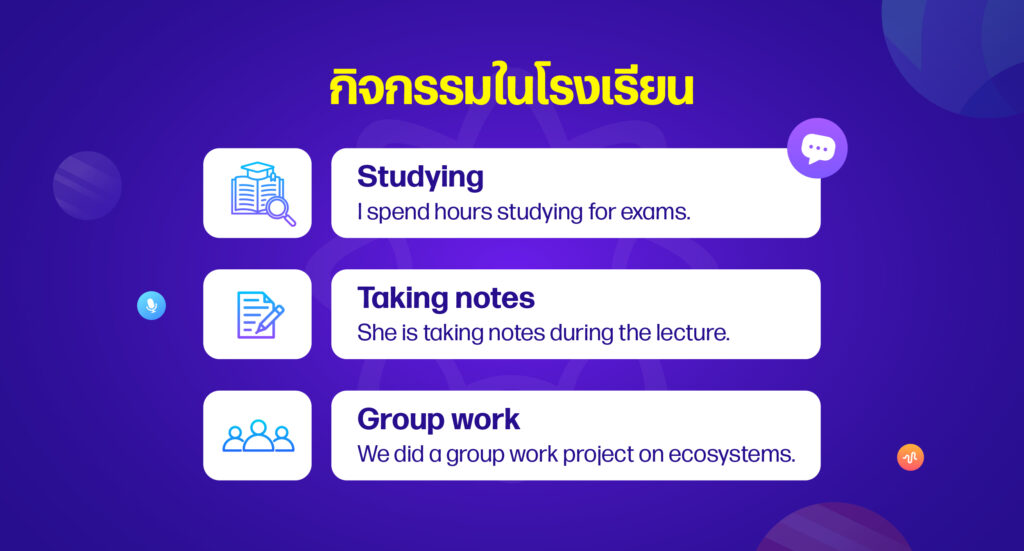
คำศัพท์ภาษาอังกฤษเกี่ยวกับเวลาและตารางเรียน
การเรียนรู้คำศัพท์ภาษาอังกฤษที่ใช้ในโรงเรียนที่เกี่ยวกับเวลาและตารางเรียนจะช่วยให้คุณจัดระเบียบและจัดการเวลาเรียนได้อย่างง่ายดาย คำศัพท์ เช่น ตารางเรียน บทเรียน และข้อสอบ จะช่วยให้คุณเข้าใจและจัดระเบียบการเรียนได้อย่างมีประสิทธิภาพ นอกจากนี้ การใช้คำศัพท์เหล่านี้อย่างคล่องแคล่วจะเป็นก้าวแรกในการทำให้คุณมั่นใจมากขึ้นในสภาพแวดล้อมการเรียน
| เวลาและตารางเรียน | แปล | การออกเสียง | ตัวอย่างและความหมาย |
| Schedule | ตารางเรียน | /ˈskɛdʒ.uːl/ | I checked my schedule for the day. (ในแต่ละวันฉันจะเช็คตารางเรียนของฉัน) |
| Lesson | บทเรียน | /ˈlɛs.ən/ | Today’s lesson is about the water cycle. (บทเรียนวันนี้เป็นเรื่องเกี่ยวกับวัฏจักรของน้ำ) |
| Break | ช่วงพัก | /breɪk/ | We have a 15-minute break between classes. (เรามีช่วงพักระหว่างคาบเรียน 15 นาที) |
| Semester | ภาคเรียน | /səˈmɛs.tər/ | The fall semester starts in September. (ภาคเรียนฤดูใบไม้ร่วงเริ่มในเดือนกันยายน) |
| Homework | การบ้าน | /ˈhoʊm.wɜːrk/ | I have math homework to complete. (ฉันมีการบ้านคณิตศาสตร์ที่ต้องทำให้เสร็จ) |
| Graduation | การสำเร็จการศึกษา | /ˌɡrædʒ.uˈeɪ.ʃən/ | She is excited for her graduation ceremony. (เธอรู้สึกตื่นเต้นกับพิธีพระราชทานปริญญาบัตรของเธอ) |

ELSA Premium Lifetime
9,999 บาท ->6,439 บาท

ELSA Pro Lifetime
3,659 บาท ->2,799 บาท

ELSA Premium 1 year
8,497 บาท ->2,885 บาท

ELSA Pro 1 year
2,499 บาท ->1,528 บาท
วลีที่ใช้ในการสื่อสารในโรงเรียน
| วลี | แปล | การออกเสียง | ตัวอย่างและความหมาย |
| Back to school | กลับไปเรียน | /bæk tuː skuːl/ | It’s back to school next week. (สัปดาห์หน้าเราก็กลับไปเรียนกันแล้ว) |
| School assignment | การบ้านจากโรงเรียน | /skuːl əˈsaɪnmənt/ | I have a school assignment due tomorrow. (ฉันมีการบ้านจากโรงเรียนที่ต้องส่งพรุ่งนี้) |
| Teacher’s pet | ศิษย์โปรดศิษย์รักของครู | /ˈtiːtʃərz pɛt/ | She’s the teacher’s pet in the class. (เธอเป็นศิษย์โปรดศิษย์รักของครูในห้องเรียน) |
| Pass with flying colors | ผ่านด้วยคะแนนดี | /pæs wɪð ˈflaɪɪŋ ˈkʌlərz/ | He passed the exam with flying colors. (เขาผ่านการทดสอบด้วยคะแนนดี) |
| Pull an all-nighter | อดนอนทั้งคืน | /pʊl ən ɔːlˈnaɪtər/ | I had to pull an all-nighter to finish the project. (ฉันต้องอดนอนทุกคืนเพื่อทําโครงการนี้ให้เสร็จ) |
| Hit the books | อ่านหนังสืออย่างหนัก | /hɪt ðə bʊks/ | I need to hit the books for my upcoming exams. (ฉันต้องอ่านหนังสืออย่างหนักเพื่อเตรียมสอบในเร็ว ๆ นี้) |
| Classroom rules | ข้อตกลงในห้องเรียน | /ˈklɑːsruːm ruːlz/ | Please follow the classroom rules. (โปรดปฏิบัติตามข้อตกลงในห้องเรียน) |
| Take attendance | เช็คชื่อ | /teɪk əˈtɛndəns/ | The teacher takes attendance every morning. (ครูเช็คชื่อทุกเช้า) |
| School supplies | อุปกรณ์การเรียน | /skuːl səˈplaɪz/ | I need to buy some school supplies. (ฉันจำเป็นต้องซื้ออุปกรณ์การเรียน) |
| Class monitor | หัวหน้าห้อง | /klæs ˈmɒnɪtər/ | She was elected as the class monitor. (เธอได้รับเลือกให้เป็นหัวหน้าห้องเรียน) |
ประโยคภาษาอังกฤษเกี่ยวกับโรงเรียนที่ใช้ในการสื่อสาร
| ประโยค | แปลการออกเสียงตัวอย่างและความหมาย | แปลการออกเสียงตัวอย่างและความหมาย | แปลการออกเสียงตัวอย่างและความหมาย |
| What is your favorite subject? | คุณชอบวิชาอะไรที่สุด? | /wɑt ɪz jʊər ˈfeɪ.vər.ɪt ˈsʌb.dʒɛkt/ | I’m very into math! (ฉันชอบเรียนคณิตมาก!) |
| How do you get to school? | คุณไปโรงเรียนอย่างไร? | /haʊ du jʊ gɛt tu skul/ | I get to school by bus. (ฉันไปโรงเรียนโดยรถบัส) |
| Do you take tutoring outside of school? | คุณมีเรียนพิเศษไหม? | /du jʊ teɪk ˈtuː.tər.ɪŋ aʊtˌsaɪd əv skul/ | Yes, I study English at one of Langmaster’s centers near my house. (มี ฉันเรียนภาษาอังกฤษที่ศูนย์ Langmaster ใกล้บ้านฉัน) |
| Do you get a lot of homework? | คุณมีการบ้านเยอะไหม? | /du jʊ gɛt ə lɒt əv ˈhoʊmˌwɝk/ | I have to solve tons of homework every day! (ฉันต้องทําการบ้านเยอะทุกวัน!) |
| Are you allowed to eat during class? | คุณได้รับอนุญาตให้ทานอาหารระหว่างเรียนไหม? | /ɑr jʊ əˈlaʊd tu it ˈdjʊr.ɪŋ klæs/ | No, we cannot bring snacks into class. (ไม่ได้ เราไม่สามารถนำขนมเข้าไปในห้องเรียนได้) |
| Have you ever been late for class? | คุณเคยไปเรียนสายไหม? | /hæv jʊ ˈɛvər bɪn leɪt fɔr klæs/ | I was late one time last semester. (ฉันไปสายครั้งหนึ่งเมื่อเทอมที่แล้ว) |
| Have you ever failed a class? | คุณเคยสอบตกไหม? | /hæv jʊ ˈɛvər feɪld ə klæs/ | No, I always cram for the exam to pass. (ไม่เคย ฉันอ่านหนังสือสอบจนผ่านตลอด) |
| What grade are you in? | คุณเรียนอยู่ชั้นไหน? | /wɑt ɡreɪd ɑr jʊ ɪn/ | I’m in grade 12. (ฉันกําลังเรียนอยู่ ม.6) |
| How many subjects will you take this year? | คุณจะเรียนกี่วิชาในปีนี้? | /haʊ ˈmɛni ˈsʌb.dʒɛkts wɪl jʊ teɪk ðɪs jɪr/ | Our class has 6 subjects in total this year. (ปีนี้ชั้นเรียนของเรามีทั้งหมด 6 วิชา) |
| Have you kept in contact with old friends? | คุณยังติดต่อกับเพื่อนเก่า ๆ บ้างไหม? | /hæv jʊ kɛpt ɪn ˈkɑnˌtækt wɪθ oʊld frɛndz/ | Sadly we lost contact years ago. (น่าเสียดายที่เราขาดการติดต่อไปเมื่อหลายปีก่อนแล้ว) |
เคล็ดลับในการจำคำศัพท์เกี่ยวกับโรงเรียน

- ใช้บัตรคำศัพท์: บัตรคำศัพท์เป็นเครื่องมือที่เรียบง่ายแต่มีประสิทธิภาพในการช่วยให้คุณจำคำศัพท์ได้อย่างรวดเร็ว จงเขียนคำศัพท์และความหมายของคำลงในการ์ดแต่ละใบ พลิกซ้ำไปซํ้ามาเพื่อฝึกฝน คุณสามารถจัดเรียงพวกมันเป็นกลุ่มเพื่อให้จดจำได้ง่ายขึ้น
- Mind maps (แผนที่ความคิด): แผนที่ความคิดช่วยจัดระบบคำศัพท์ตามหัวข้อ ซึ่งจะช่วยให้ผู้เรียนเข้าใจและเชื่อมโยงข้อมูลได้อย่างง่ายดาย เมื่อเรียนคำศัพท์เกี่ยวกับโรงเรียนสามารถแบ่งคำศัพท์ออกเป็นหมวดได้ เช่น ชั้นเรียน วิชา เพื่อน กิจกรรมนอกหลักสูตร ฯลฯ จากนั้น จึงช่วยให้คุณจำคำศัพท์ได้นานและเป็นระบบมากขึ้น
- ฝึกใช้คำศัพท์ในการสนทนา: การฝึกใช้คำศัพท์ในการสนทนาเป็นวิธีที่มีประโยชน์ในการจดจำและจะช่วยให้คุณสามารถใช้คำในบริบทเฉพาะ คุณสามารถประยุกต์ใช้ในสถานการณ์ต่างๆ เช่น การสื่อสารในห้องเรียน การถามคำถามกับครู การสนทนากับเพื่อน ซึ่งจะช่วยให้คำศัพท์มีความคุ้นเคยและจดจำได้ง่ายขึ้น
- ฝึกการออกเสียงและฝึกฝนกับ ELSA Speak: ด้วย ELSA Speak คุณไม่เพียงแต่ทบทวนคำศัพท์ แต่ยังปรับปรุงการออกเสียง ช่วยให้คุณมั่นใจมากขึ้นเมื่อสื่อสาร นี่เป็นเครื่องมือที่มีประโยชน์สำหรับการเรียนรู้คำศัพท์อย่างรวดเร็วและถูกต้อง
หวังว่าชุด คำศัพท์ในโรงเรียน ภาษาอังกฤษ ที่ ELSA Speak แบ่งปันข้างต้นจะเป็นตัวช่วยที่ดีเยี่ยมในเส้นทางการเรียนรู้ของคุณ อย่าลืมฝึกฝนเป็นประจำและใช้คำศัพท์เหล่านี้ในการสื่อสารในชีวิตประจำวันเพื่อให้รู้สึกมั่นใจมากขึ้นในสภาพแวดล้อมการเรียนและในชีวิตจริง อย่าลืมติดตาม ELSA Speak เพื่อพัฒนาภาษาอังกฤษของคุณต่อไปนะ!
เมื่อได้รับคำอวยพรวันเกิด สิ่งสำคัญคือต้องแสดงความขอบคุณอย่างจริงใจต่อเพื่อน ญาติ พี่น้อง คนรัก หรือเพื่อนร่วมงาน การตอบกลับสั้น ๆ แต่อบอุ่นจะช่วยกระชับความสัมพันธ์ มาดูคําขอบคุณอวยพรวันเกิด ภาษาอังกฤษเหล่านี้ ที่สามารถใช้งานง่ายๆ ในหลายสถานการณ์กันนะ
ทำไมต้องตอบกลับคำอวยพรวันเกิด?
การตอบกลับคำอวยพรวันเกิดอาจดูเหมือนเป็นเรื่องเล็กน้อย แต่แท้จริงแล้วมีความหมายอย่างมาก การใช้ คําขอบคุณอวยพรวันเกิด ภาษาอังกฤษ ไม่เพียงแสดงถึงความสุภาพเท่านั้น แต่ยังช่วยเสริมสร้างและรักษาความสัมพันธ์ที่ดีกับคนรอบข้างได้อีกด้วย ด้านล่างนี้คือเหตุผลที่คุณควรสละเวลาตอบคำอวยพรวันเกิดด้วยความจริงใจ:
- สุภาพและแสดงความขอบคุณ: คำขอบคุณง่าย ๆ แสดงให้เห็นว่าคุณซาบซึ้งในความรู้สึกของอีกฝ่ายที่มีต่อคุณ
- แสดงความเคารพต่อความสัมพันธ์: การตอบกลับเป็นการยืนยันว่าความสัมพันธ์นั้นมีคุณค่าและคุณใส่ใจผู้ที่ส่งคำอวยพรมา
- สร้างความรู้สึกผูกพันและความใกล้ชิด: การตอบกลับอย่างจริงใจสามารถทำให้ผู้รับรู้สึกมีความสุขและผูกพันกับคุณมากขึ้น
- แสดงความอ่อนโยนและเอาใจใส่: วิธีที่คุณตอบกลับ แม้เพียงสั้น ๆ ก็สะท้อนถึงความห่วงใยและทัศนคติเชิงบวกของคุณ
- รักษาภาพลักษณ์ที่ดี: การตอบกลับคำอวยพรช่วยให้คุณดูสุภาพ เป็นมิตร และเป็นที่รักในสายตาผู้อื่นมากขึ้น

5 ขั้นตอนเพื่อสร้างคําขอบคุณสําหรับคําอวยพร ภาษาอังกฤษวันเกิดที่ดีที่สุด
หากคุณต้องการสร้างข้อความ คําขอบคุณอวยพรวันเกิด ภาษาอังกฤษ ที่สุภาพและอบอุ่น ลองทำตาม 5 ขั้นตอนง่าย ๆ ต่อไปนี้ เพื่อช่วยให้การแสดงความขอบคุณของคุณเป็นธรรมชาติและน่าประทับใจยิ่งขึ้น:
- ขั้นตอนที่ 1: เริ่มต้นด้วยคำขอบคุณที่เรียบง่ายแต่จริงใจ เช่น “Thank you so much for your wishes” เพื่อแสดงความขอบคุณทันที
- ขั้นตอนที่ 2: ปรับแต่งข้อความ ระบุชื่อผู้ส่งหรือรายละเอียดเฉพาะในข้อความ/ของขวัญเพื่อแสดงความห่วงใย
- ขั้นตอนที่ 3: เพิ่มความรู้สึก เช่น “Your words made my day even more special” เพื่อให้คำขอบคุณเป็นส่วนตัวและจริงใจยิ่งขึ้น
- ขั้นตอนที่ 4: หลังจากขอบคุณพวกเขาแล้ว ให้ส่งคำอวยพรกลับไป เช่น “Wishing you happiness and success as well”
- ขั้นตอนที่ 5: จบการสนทนาอย่างเป็นธรรมชาติและเป็นมิตรโดยใช้คำลงท้าย เช่น “Cheers”, “Lots of love” หรือ “Best regards” ขึ้นอยู่กับระดับความใกล้ชิดของความสัมพันธ์
แคปชั่นขอบคุณของขวัญวันเกิด ภาษาอังกฤษ
เพื่อนและเพื่อนร่วมงาน
- Thank you to everyone who came and rejoiced in this happy day – my birthday. (ขอขอบคุณทุกคนที่มาร่วมแสดงความยินดีกับวันแห่งความสุขนี้ – วันเกิดของฉัน)
- I sincerely thank your enthusiasm for me on today’s birthday. (ฉันขอขอบคุณจากใจจริงสำหรับความกระตือรือร้นที่คุณมีต่อฉันในวันเกิดวันนี้)
- I am very happy to receive meaningful gifts from everyone. Thank you very much. (ฉันดีใจมาก ๆ ที่ได้รับของขวัญที่มีความหมายจากทุกคน ขอบคุณมาก ๆ)
- I am very happy and happy for everyone’s presence on my birthday. I would like to thank you for the meaningful gifts that you have given me. (ฉันมีความสุขมากที่ทุกคนมาร่วมงานวันเกิดของฉัน ฉันอยากขอบคุณทุกคนสำหรับของขวัญที่มีความหมายที่คุณมอบให้ฉัน)
- Thank you for all the birthday wishes. (ขอขอบคุณสำหรับคำอวยพรวันเกิดทุก ๆ คำนะ)
- Thank you so much for birthday wishes. Wish you guys wealth, health and happiness in return. Cheers! (ขอขอบคุณสำหรับคำอวยพรวันเกิด ขอให้ทุกคนร่ำรวย สุขภาพแข็งแรง และมีความสุขเช่นกัน ชนแก้ว!)
- Working with you is my luck. For today I receive this extremely meaningful gift. Thank you very much for your kindness. (ฉันรู้สึกโชคดีมากที่ได้ร่วมงานกับคุณ วันนี้ฉันได้รับของขวัญที่มีความหมายอย่างยิ่ง ขอบคุณมากสำหรับความหวังดีของคุณ)
- Thank you boss’s meaningful gift. The boss is always healthy and successful. ( ขอบคุณบอสที่มอบของขวัญอันล้ำค่าให้ดิฉัน/ผมค่ะ/ครับ ขอให้บอสมีสุขภาพแข็งแรงและประสบความสำเร็จเสมอนะคะ/ครับ)
คู่รัก

- You are a sweet man. Thank you for the special gift you gave me. Love you. (คุณเป็นคนที่น่ารัก ขอบคุณสำหรับของขวัญพิเศษที่คุณมอบให้ฉัน รักคุณนะ)
- You are such a great lover. Thanks for that gift of yours. Love you forever. (คุณเป็นแฟนที่ดีมาก ๆ ขอบคุณสำหรับของขวัญ รักคุณตลอดไปนะ)
- Sweet gifts make me love you more every day. Thank you very much. (ของขวัญน่ารัก ๆ ทำให้ฉันหลงรักคุณมากขึ้นทุกวัน ขอบคุณมากนะ)
- You don’t need to give me expensive gifts. I like meaningful gifts like the present. Thank you for loving me. (คุณไม่จำเป็นต้องให้ของขวัญแพง ๆ กับฉัน ฉันชอบของขวัญที่มีความหมายเหมือนกับปัจจุบัน ขอบคุณที่รักฉันนะ)
- Thank you for coming to the side. You are a beautiful and caring girl. Thank you for your gift. I am so happy to have you. (ขอบคุณที่อยู่ข้าง ๆ คุณเป็นผู้หญิงที่สวยและเอาใจใส่ ขอบคุณสำหรับของขวัญ ฉันมีความสุขมากที่มีคุณ)
- Receiving this gift from you felt extremely happy. Maybe in my previous life, I did a lot of good deeds, so I just met you in this life. Love you. (การได้รับของขวัญชิ้นนี้จากคุณทำให้ฉันรู้สึกมีความสุขมาก บางทีฉันอาจทำความดีมากมายในชาติที่แล้ว ฉันจึงได้พบคุณในชาตินี้ รักคุณนะ)
- A thousand words of sweet honey is not equal to a warm act. Thank you for your extremely thoughtful gift. I love you! (คำพูดหวาน ๆ นับพันคำไม่เท่ากับการกระทำที่อบอุ่น ขอบคุณสำหรับของขวัญที่ดีที่คุณมอบให้ ฉันรักคุณนะ!)
>>> Read more: 100+ คําอวยพรวันเกิดแฟนภาษาอังกฤษน่ารักๆ สุดประทับใจ

ญาติพี่น้อง
- Thank you for always being by my side and celebrating my birthday with me.
(ขอบคุณที่อยู่เคียงข้างฉันเสมอและร่วมฉลองวันเกิดกับฉัน) - I feel so lucky to have such a caring family. Thank you for your love and support.
(ฉันรู้สึกโชคดีมากที่มีครอบครัวที่ห่วงใยกันขนาดนี้ ขอบคุณสำหรับความรักและการสนับสนุนของคุณ) - Your wishes made my day more special. Thank you so much!
(คำอวยพรของคุณทำให้วันของฉันพิเศษยิ่งขึ้น ขอบคุณมาก!) - Thank you for the thoughtful gift. It means a lot to me.
(ขอบคุณสำหรับของขวัญที่คุณตั้งใจมอบให้ฉัน มันมีความหมายกับฉันมาก) - I truly appreciate your love and blessings on my birthday.
(ฉันซาบซึ้งในความรักและพรที่คุณมอบให้ในวันเกิดของฉันจริง ๆ) - Having you as my family is the greatest gift I could ask for. Thank you!
(การมีคุณในครอบครัวเป็นของขวัญที่ดีที่สุดที่ฉันจะขอได้ ขอบคุณนะ!)
ตัวอย่างคำขอบคุณคําอวยพรวันเกิดภาษาอังกฤษตามสถานการณ์
สถานการณ์ที่ใกล้ชิด
- I truly appreciate your birthday wishes sent through private messages!
(ฉันซาบซึ้งใจมากที่คุณส่งคำอวยพรวันเกิดผ่านทางข้อความส่วนตัว!) - Your kind words made my day brighter. Thank you so much!
(คำพูดที่น่ารักของคุณทำให้วันของฉันสดใสขึ้น ขอบคุณมากนะ!) - I’m so grateful to have you in my life. Your support means a lot!
(ฉันรู้สึกขอบคุณมากที่มีคุณอยู่ในชีวิตของฉัน การสนับสนุนของคุณมีความหมายมาก!) - Thank you for your heartfelt message; it truly touched me.
(ขอบคุณสำหรับข้อความที่มาจากใจของคุณ มันทำให้ฉันซาบซึ้งใจจริง ๆ) - I loved your message and how you made me feel special!
(ฉันชอบข้อความของคุณและชอบที่คุณทำให้ฉันรู้สึกพิเศษ!) - Your wishes made my birthday even more memorable.
(คำอวยพรของคุณทำให้วันเกิดของฉันน่าจดจำยิ่งขึ้น) - I hope we can celebrate together soon!
(ฉันหวังว่าเราจะได้ฉลองกันในเร็ว ๆ นี้!) - Thank you for being such a wonderful friend.
(ขอบคุณที่เป็นเพื่อนที่ดีนะ) - Your message was the highlight of my day!
(ข้อความของคุณเป็นข้อความสำคัญในวันของฉัน!) - I appreciate your friendship and all the love you send my way.
(ฉันรู้สึกขอบคุณสําหรับมิตรภาพและความรักที่คุณมอบให้ฉัน) - I want to use this moment to truly thank you from the deepest part of my heart for remembering this Big Day of mine. I appreciate the birthday message you sent.
(ฉันอยากใช้ช่วงเวลานี้เพื่อขอบคุณคุณจากใจจริงสำหรับการจดจำวันสำคัญของฉันในครั้งนี้ ฉันซาบซึ้งใจกับข้อความอวยพรวันเกิดที่คุณส่งมานะ) - I am overwhelmed by your wishes and blessings, and I will like to thank you from the bottom of my heart for making this birthday of mine one of the most special days of my life.
(ฉันรู้สึกซาบซึ้งมากกับคำอวยพรของคุณ และฉันอยากขอบคุณคุณจากใจจริงที่ทำให้วันเกิดของฉันในครั้งนี้เป็นหนึ่งในวันที่พิเศษที่สุดในชีวิต) - I feel very lucky to have someone as special as you in my life. Thank you very much for sending me such an amazing birthday message. You are the best!
(ฉันรู้สึกโชคดีมากที่มีคนพิเศษอย่างคุณในชีวิต ขอบคุณมากที่ส่งข้อความอวยพรวันเกิดที่ดี ๆ มาให้ฉัน คุณดีที่สุดเลย!) - You have really made this Big Day of mine extremely awesome, and I want to let you know that I truly appreciate all your efforts and prayers you made on my behalf.
(คุณทำให้วันสำคัญของฉันครั้งนี้เป็นวันที่ยอดเยี่ยมมาก และฉันอยากให้คุณรู้ว่าฉันซาบซึ้งใจในความพยายามและคำอธิษฐานทั้งหมดที่คุณมอบให้ฉัน) - I just want to thank you for making my birthday just as incredible as you are. My birthday would have been joyless without your heartfelt wishes. God bless you, my dear.
(ฉันแค่อยากจะขอบคุณคุณที่ทำให้วันเกิดของฉันวิเศษเหมือนที่คุณเป็น วันเกิดของฉันคงจะไม่มีความสุขเลยถ้าไม่มีคำอวยพรจากใจจริงของคุณ ขอให้พระเจ้าคุ้มครองคุณนะ) - I cannot thank you enough for the great gifts and wishes you gave me on my birthday. I am so grateful for your love. Thank you so much.
(ฉันไม่สามารถขอบคุณคุณมากไปกว่านี้ได้สำหรับของขวัญและคำอวยพรดี ๆ ที่คุณมอบให้ฉันในวันเกิดของฉัน ฉันรู้สึกขอบคุณมากสำหรับความรักของคุณ ขอบคุณมากจริง ๆ นะ) - My birthday wouldn’t have been enjoyable without the sweet wishes I received from great friends like you.
(วันเกิดของฉันคงจะไม่มีความสุขเลยถ้าไม่มีคำอวยพรดี ๆ ที่ฉันได้รับจากเพื่อนดี ๆ อย่างคุณ) - Dear loved one, I want to express my sincerest appreciation to you for sending me such wonderful and powerful blessings. You have truly made this birthday one that will leave a lasting memory in my mind for years to come. Thank you so much!
(ที่รัก ฉันอยากแสดงความขอบคุณอย่างจริงใจที่คุณส่งพรอันทรงพลังมาให้ฉัน คุณทำให้วันเกิดครั้งนี้เป็นวันเกิดที่ฉันจะจดจำไปอีกหลายปี ขอบคุณมากนะ!) - I really enjoyed this birthday to the fullest, and I want to give special thanks to you for making this moment such a memorable one.
(ฉันสนุกกับวันเกิดครั้งนี้มาก และฉันอยากขอบคุณคุณเป็นพิเศษที่ทำให้ช่วงเวลานี้เป็นช่วงเวลาที่น่าจดจำ) - The excitement your birthday message brought me was all that I needed to make my birthday a special one. Thanks, dear. It is a pleasure to have you around.
(ความตื่นเต้นที่ฉันได้รับจากข้อความวันเกิดของคุณเป็นสิ่งเดียวที่ฉันต้องการเพื่อทำให้วันเกิดของฉันเป็นวันพิเศษ ขอบคุณนะ ฉันดีใจที่มีคุณอยู่เคียงข้าง) - I want to thank you for your birthday wishes and blessings. Incredible people like you make life very easy and fun to live.
(ฉันอยากจะขอบคุณคุณสำหรับคำอวยพรวันเกิดและคําอธิฐานของคุณ คนที่น่าทึ่งอย่างคุณทำให้ชีวิตง่ายและสนุกมากเลย) - Receiving such inspiring birthday greetings from you makes me truly excited. It is such a blessing to have you around. I really appreciate all your efforts.
(การได้รับคำอวยพรวันเกิดที่เป็นแรงบันดาลใจจากคุณทำให้ฉันรู้สึกตื่นเต้นมาก ฉันรู้สึกโชคดีมากที่มีคุณอยู่เคียงข้าง ฉันซาบซึ้งในความพยายามทั้งหมดของคุณจริง ๆ นะ) - Birthdays are one-day events but your wishes will stay with me. Thank you very much.
(วันเกิดเป็นงานวันเดียวแต่คําอวยพรของคุณจะอยู่กับฉัน ขอบคุณมาก ๆ นะ) - Good things do not last longer but your birthday wishes will be remembered throughout the whole year. I truly appreciate the love.
(สิ่งดีๆ คงอยู่ไม่นาน แต่คำอวยพรวันเกิดของคุณจะถูกจดจำตลอดทั้งปี ฉันซาบซึ้งในความรักของคุณจริง ๆ นะ) - Thank you all for making me feel super special on my birthday. Those were some really awesome messages you sent me.
(ขอบคุณทุกคนที่ทำให้ฉันรู้สึกพิเศษมากในวันเกิดของฉัน ข้อความที่คุณส่งมาให้ฉันนั้นยอดเยี่ยมมาก) - I was very surprised to receive your gift. Thanks for your kind.
(ฉันรู้สึกประหลาดใจมากที่ได้รับของขวัญจากคุณ ขอบคุณสำหรับความแสนดีของคุณ) - This beautiful gift is for me. This is wonderful. Thank you very much.
(ของขวัญที่สวยงามชิ้นนี้คุณมอบให้ฉันเหรอ? เยี่ยมมากเลย ขอบคุณมากนะ) - Your gift surprised me very much. Thank you for taking these sweet things for me.
(ของขวัญของคุณทำให้ฉันประหลาดใจมาก ขอบคุณที่นำของน่ารักเหล่านี้มาให้ฉันนะ) - Thank you very much for your meaningful gift. I like it very much.
(ขอบคุณมากสำหรับของขวัญที่มีความหมายของคุณ ฉันชอบมันมากเลย) - The first time I received such a lovely gift. You must have spent a lot of effort to choose it.
(นี่เป็นครั้งแรกที่ฉันได้รับของขวัญที่น่ารักขนาดนี้ คุณคงใช้เวลานานมากในการเลือกมัน)

>>> Read more:
- รวมประโยค ลากิจ ภาษาอังกฤษ
- 100+ คำอวยพรวันเกิดลูกชาย ภาษาอังกฤษที่อบอุ่นและมีความหมาย
- 11 วิธีพูด Thank you – ขอบคุณภาษาอังกฤษ ที่สมบูรณ์ที่สุด
สถานการณ์ที่สุภาพตอนทํางาน
- Thank you for your warm birthday wishes. I truly appreciate your thoughtfulness.
(ขอบคุณสำหรับคำอวยพรวันเกิดที่อบอุ่น ฉันซาบซึ้งใจในความใส่ใจของคุณจริง ๆ) - I am grateful for your kind words and best wishes on my birthday.
(ฉันรู้สึกขอบคุณสำหรับคำพูดดี ๆ และคำอวยพรวันเกิดของคุณมาก) - Your birthday wishes made my day even more special. Thank you so much.
(คำอวยพรวันเกิดของคุณทำให้วันนี้ของฉันยิ่งพิเศษขึ้นไปอีก ขอบคุณมาก ๆ นะ) - I really appreciate the support and kindness you’ve shown me on my birthday.
(ฉันซาบซึ้งใจในการสนับสนุนและน้ำใจที่คุณมอบให้ฉันในวันเกิดมากจริง ๆ) - It’s an honor to work with such thoughtful colleagues. Thank you for the birthday greetings.
(ฉันรู้สึกเป็นเกียรติอย่างยิ่งที่ได้ร่วมงานกับเพื่อนร่วมงานที่ใส่ใจเช่นนี้ ขอบคุณสำหรับคำอวยพรวันเกิดนะ)
สถานการณ์บนโซเชียลมีเดีย
- Thank you, everyone, for taking the time to wish me a happy birthday on Facebook.
(ขอบคุณทุกคนที่สละเวลาอวยพรวันเกิดให้ฉันบนเฟสบุ๊ค) - Your kind words made my day extra special.
(คำพูดที่น่ารักของคุณทำให้วันของฉันพิเศษยิ่งขึ้น) - I feel so lucky to have such thoughtful friends and family.
(ฉันรู้สึกโชคดีมากที่มีเพื่อนและครอบครัวที่คอยเอาใจใส่ขนาดนี้) - I appreciate every single message and the love you all shared.
(ฉันรู้สึกขอบคุณมากสําหรับทุกข้อความและความรักที่ทุกคนส่งมาให้ฉัน) - I can’t wait to celebrate together and make more memories!
(ฉันแทบจะรอไม่ไหวที่จะเฉลิมฉลองและสร้างความทรงจำดี ๆ ร่วมกันกับคุณ) - Your messages brightened my day and brought a smile to my face.
(ข้อความของคุณทำให้วันของฉันสดใสขึ้นและทำให้ฉันยิ้มได้) - Thank you for making me feel so cherished and loved.
(ขอบคุณที่ทำให้ฉันรู้สึกเป็นที่หวงแหนและเป็นที่รักของคุณ) - I’m grateful for each of you and the joy you bring to my life.
(ฉันรู้สึกขอบคุณพวกคุณทุกคนและความสุขที่คุณนำเข้ามาในชีวิตของฉัน) - Let’s catch up soon to celebrate all together!
(ไว้เจอกันใหม่เพื่อฉลองวันเกิดด้วยกันนะ!) - Your birthday wishes mean the world to me. Thank you!
(คำอวยพรวันเกิดของคุณมีความหมายกับฉันมาก ขอบคุณนะ!) - Thank you all for making me feel extra special on this unique day of mine. Your wishes will forever remain in my heart.
(ขอบคุณทุกคนที่ทำให้ฉันรู้สึกพิเศษในวันพิเศษนี้ คำอวยพรของคุณจะอยู่ในใจฉันตลอดไป) - I want to thank everyone for all the heartwarming birthday wishes sent my way. I am grateful to the Lord for giving me amazing people like you.
(ฉันอยากขอบคุณทุกคนสำหรับคำอวยพรวันครบรอบที่อบอุ่นใจที่ส่งมาให้ฉัน ฉันรู้สึกขอบคุณพระเจ้าที่ประทานคนดี ๆ อย่างพวกคุณมาให้ฉัน) - I not only want to thank the Lord for granting me another fabulous year of life but also for giving me lovely people like you. Your prayers and greetings have truly warmed my heart, and I am indeed thankful to everybody who made this possible.
(ฉันไม่เพียงแต่ต้องการขอบคุณพระเจ้าที่ประทานชีวิตที่ยอดเยี่ยมอีกปีหนึ่งให้ฉันเท่านั้น แต่ยังต้องการขอบคุณที่ประทานคนดี ๆ อย่างพวกคุณให้ฉันด้วย คำอธิษฐานและคำอวยพรของคุณทำให้หัวใจฉันอบอุ่น และฉันรู้สึกขอบคุณทุกคนที่ทำให้สิ่งนี้เกิดขึ้นได้) - Hi everybody, I sincerely appreciate all your efforts in making this birthday of mine the most special of my life. May the good Lord continue to pour His blessings on you.
(สวัสดีทุกคน ฉันซาบซึ้งในความพยายามของทุกคนมากที่ทำให้วันเกิดของฉันเป็นวันเกิดที่พิเศษที่สุดในชีวิต ขอให้พระเจ้าประทานพรแก่พวกคุณนะ) - I am overjoyed reading all your amazing birthday messages. Thank you, everyone, for making this possible.
(ฉันมีความสุขมากที่ได้อ่านข้อความอวยพรวันเกิดสุดวิเศษของคุณ ขอบคุณทุกคนที่ทำให้สิ่งนี้เกิดขึ้นได้) - Sincerely, I am grateful to each and every one of you who remembered this big day of mine. I will never forget all of your wonderful messages and compliments.
(ฉันขอขอบคุณทุกคนจากใจจริงที่จำวันสำคัญของฉันได้ ฉันจะไม่มีวันลืมข้อความและคำชมของคุณแน่นอน) - I am thankful for all the beautiful people I have around me. You all have contributed to something very exciting in my life. I thank everybody for all the fabulous birthday wishes.
(ฉันขอบคุณผู้คนดี ๆ รอบตัวฉัน พวกคุณทุกคนมีส่วนทำให้ชีวิตของฉันน่าตื่นเต้นมาก ฉันขอขอบคุณทุกคนสำหรับคำอวยพรวันเกิดสุดวิเศษนี้นะ) - I want to say the biggest of thanks to everyone who made my birthday a spectacular one. I appreciate all your wonderful messages.
(ฉันอยากจะกล่าวขอบคุณทุกคนที่ทำให้วันเกิดของฉันเป็นวันพิเศษมากเลย ฉันซาบซึ้งใจกับข้อความดี ๆ ของพวกคุณทุกคนนะ) - This birthday will forever remain in my heart, and I give credit to everyone who took out time to send me lovely messages. May God richly bless all of you.
(วันเกิดครั้งนี้จะอยู่ในความทรงจำของฉันตลอดไป และฉันขอขอบคุณทุกคนที่สละเวลาส่งข้อความดี ๆ มาให้ฉัน ขอให้พระเจ้าคุ้มครอง) - Another year means a step closer to old age. Well, I don’t mind growing old because I know I have incredible people like you around me. Thank you all for making this birthday of mine a remarkable one.
(อีกปีหนึ่งหมายถึงการก้าวเข้าสู่วัยชราอีกก้าวหนึ่ง ฉันไม่รังเกียจที่จะแก่ตัวลง เพราะฉันรู้ว่ามีคนดี ๆ อย่างคุณอยู่รอบตัวฉัน ขอบคุณทุกคนที่ทำให้วันเกิดของฉันเป็นวันที่พิเศษมากนะ) - Reading awesome birthday greetings and wishes make me feel like I am on cloud 9. I say thank you to everyone for making this birthday a unique one.
(การได้อ่านคำอวยพรวันเกิดที่ดี ๆ ทำให้ฉันรู้สึกเหมือนอยู่บนสวรรค์ ฉันขอขอบคุณทุกคนที่ทำให้วันเกิดนี้เป็นวันพิเศษ) - It has been very exciting going through all your wonderful messages and blessings for me. It is indeed a blessing to have loving and caring people like you in my existence. You are truly wonderful people.
(การได้อ่านข้อความและคำอวยพรวันเกิดที่ดี ๆ ของคุณทำให้ฉันตื่นเต้นมาก ฉันรู้สึกโชคดีจริง ๆ ที่มีคนที่รักและห่วงใยอย่างคุณอยู่ในชีวิตของฉัน คุณเป็นคนดีมากจริง ๆ) - I want to use the opportunity as good reminder of how grateful I am for your beautiful birthday wishes. Thanks for sharing in my joy.
(ฉันอยากใช้โอกาสนี้เพื่อเตือนความจําว่าฉันรู้สึกขอบคุณมากขนาดไหนสำหรับคำอวยพรวันเกิดที่สวยงามของคุณ ขอบคุณที่มาแบ่งปันความสุขกับฉันนะ) - To my friends, thank you so much for all the thoughtful words you have given me on my birthday. Hugs and kisses for everyone!
(ถึงเพื่อน ๆ ของฉัน ขอบคุณมากสำหรับคำอวยพรดี ๆ ที่คุณมอบให้ฉันในวันเกิดของฉัน กอดและจูบทุกคนนะ) - You filled my heart with so much joy with your wonderful birthday wishes. A big thank you to all of you!
(คุณทำให้หัวใจของฉันเต็มไปด้วยความสุขเพราะคำอวยพรวันเกิดที่ดีของคุณ ขอบคุณพวกคุณทุกคนมากนะ) - Yesterday was a big moment in my life, and you, guys, made it even bigger with those lovely wishes. Thank you very much.
(เมื่อวานเป็นช่วงเวลาสำคัญในชีวิตของฉัน และพวกคุณทำให้ชีวิตของฉันยิ่งใหญ่ขึ้นด้วยคำอวยพรที่น่ารักเหล่านั้น ขอบคุณมาก ๆ เลยนะ) - Thank you all for the birthday wishes. It was a birthday full of joy and happiness thanks to you – look forward to living it again next year!
(ขอขอบคุณทุกคนสำหรับคำอวยพรวันเกิดฉัน วันเกิดของฉันเต็มไปด้วยความสุขและความปิติเพราะพวกคุณเลย ฉันหวังว่าจะได้ฉลองวันเกิดนี้อีกครั้งในปีหน้านะ!) - Today I received the most awesome birthday wishes. I feel like the most important person in the world thanks to all of you! You made my day!
(วันนี้ฉันได้รับคำอวยพรวันเกิดที่ดีมาก ฉันรู้สึกว่าตัวเองเป็นคนที่สำคัญที่สุดในโลกเพราะพวกคุณทุกคนเลย! พวกคุณทำให้วันของฉันดีขึ้นมากนะ!) - Words cannot express how much happiness those sweet birthday messages of yours brought into my heart. May God bless you all for taking some time out of your busy lives to send me such thoughtful messages.
(คำพูดไม่สามารถบรรยายได้ว่าข้อความอวยพรวันเกิดที่น่ารักของคุณทำให้ฉันมีความสุขมากเพียงใด ขอพระเจ้าคุ้มครองพวกคุณทุกคนที่สละเวลาจากชีวิตที่ยุ่งวุ่นวายเพื่อส่งข้อความที่มีความหมายมาให้ฉันนะ) - My birthday was truly magical thanks to the beautiful messages and wishes you sent me. I appreciate every single wish that I received. May God bless you all. Thanks.
(วันเกิดของฉันเป็นวันเกิดที่วิเศษมากจริง ๆ ขอบคุณข้อความและคำอวยพรที่สวยงามที่คุณส่งมาให้ฉัน ฉันซาบซึ้งใจกับทุกคำอวยพรที่ฉันได้รับ ขอพระเจ้าคุ้มครองพวกคุณทุกคน ขอบคุณนะ)

สถานการณ์ทางสังคม
- How thoughtful. (คุณช่างเป็นคนเอาใจใส่จริง ๆ)
- Thanks! (ขอบคุณนะ!)
- Thanks a lot! (ขอบคุณมาก!)
- Many thanks! (ขอบคุณมาก!)
- Thanks to you! (ขอบคุณ!)
- Thank you very much! (ขอบคุณมากจริง ๆ!)
- Thank you so much! (ขอบคุณมาก ๆ !)
- I really appreciate it! (ฉันรู้สึกขอบคุณมาก!)

>>> Read more:
- 100+ Happy Birthday Wishes for Myself in English (Happy birthday to me)
- A collection of birthday wishes for adults that are meaningful and polite in English.
- 100+ คำอวยพรวันเกิดภาษาอังกฤษ มีความหมายดี ๆ พ้รอมคำแปล
- I really appreciate your help with my project !
- I’m grateful for having you as a friend !
- There are no words to show my appreciation !
- How can I ever thank you ?
- How can I ever possibly thank you ?
- Thanks a million for…! ( Thank you a million times for…! )
- Sincerely thanks. ( Thank you from the bottom of my heart .)
- Many happy returns. ( I wish you much happiness .)
- You made my birthday so special .
- It’s a perfect birthday wish.
- Thanks for your kind thoughts , everyone .
- I’m so lucky to have friends like you .
- Thanks, guys, for the awesome birthday wishes! You guys are so sweet !
- I ca n’t be happier .
- It’s been a very happy birthday because of you all .
- It is not a year older, but a year happier with you guys. ( It is a year happier (how old.. doesn’t count)
- You should n’t have .
- How can I show how grateful I am for what you did ?
- Thank you very much. ( Thank you very much (formal). )
- You’ve made my day .
- Cheers. ( Thank you (informal). )
- I am most grateful .
- We would like to express our gratitude .
- Thank you, I really enjoyed the gift .
- Your gift is special . Every time I see it, I immediately miss you. Thank you very much .
- You do not need to prepare these gifts for me. Anyway, I was very happy to receive them .
- The gift made me feel my presence in everyone’s heart. Thank you very much .
- Look how lovely the new gift is. Thank you very much .
- I cannot fully describe my emotions . Thank you for taking care of me .
- Sometimes work pressure makes me forget that we need to care more about the people around us . Thanks for your gift for helping me realize that .
- My birthday was the only time I realized some people were still alive. Thank you for sending in those beautiful wishes though .
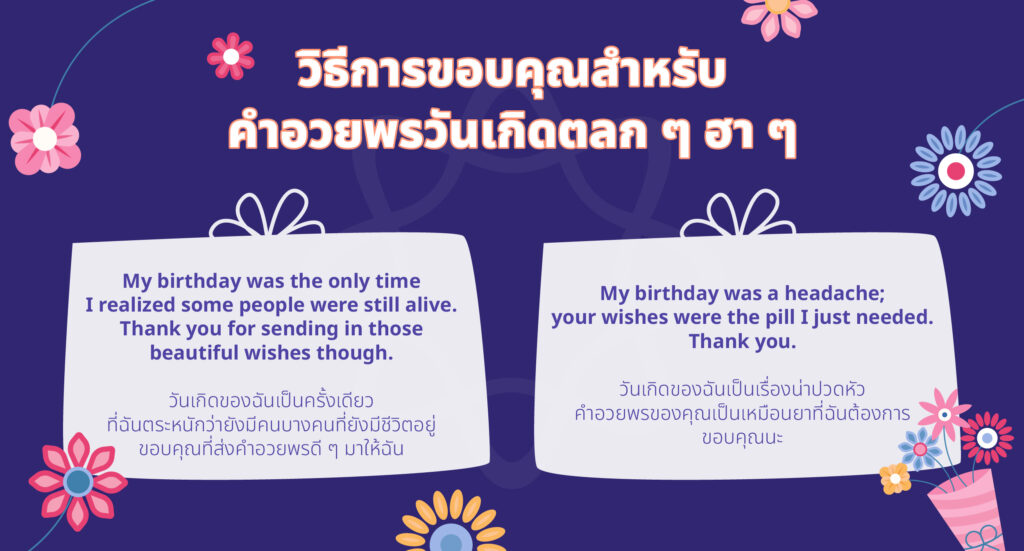
- My birthday was a headache; your wishes were the pill I just needed. Thank you. (วันเกิดของฉันเป็นเรื่องน่าปวดหัว คำอวยพรของคุณเป็นเหมือนยาที่ฉันต้องการ ขอบคุณนะ)
- Can someone call me the ambulance? I am suffering from an overdose of wishes. Thank you all. (มีใครช่วยโทรเรียกรถพยาบาลให้ฉันหน่อยได้ไหม ฉันกำลังได้รับคำอวยพรมากเกินไป ขอบคุณทุกคนนะ)
- To all who wanted to impress me on my birthday, the standards were raised a bit this year. No more wishes without gifts! All the same, I guess a little thank you is in order for your efforts. (ถึงทุกคนที่อยากสร้างความประทับใจให้ฉันในวันเกิด ปีนี้มาตรฐานก็สูงขึ้นเล็กน้อยนะ จะไม่มีคำอวยพรอีกต่อไปถ้าไม่มีของขวัญ! ถึงอย่างนั้น การขอบคุณเล็ก ๆ น้อย ๆ สำหรับความพยายามของคุณก็พอแล้ว)
- While thanking you for those lovely birthday wishes you sent me, I think it’s only fair that I also use this opportunity to extend my gratitude to Facebook for giving some of you who forgot my birthday the opportunity to remember it. (ขณะที่ฉันกำลังขอบคุณคุณสำหรับคำอวยพรวันเกิดอันแสนน่ารักที่คุณส่งมาให้ฉัน ฉันคิดว่าคงจะยุติธรรมดีถ้าฉันจะใช้โอกาสนี้เพื่อแสดงความขอบคุณต่อเฟสบุ๊ค ที่ให้โอกาสแก่บางคนที่ลืมวันเกิดของฉันได้จดจำวันเกิดของฉัน)
- Has anyone had more gifts than wishes on their birthday? The answer is a big NO. I knew I wouldn’t be the first to achieve that. Thanks for your numerous wishes though. (มีใครได้รับของขวัญมากกว่าคำอวยพรในวันเกิดบ้างไหม คำตอบคือไม่ ฉันรู้ว่าฉันจะไม่ใช่คนแรกที่ทําได้อย่างนั้น แต่ยังไงก็ขอบคุณสำหรับคำอวยพรมาก ๆ นะ)
- Thank you for your hilarious birthday wishes! You made me laugh so hard. (ขอบคุณสำหรับคำอวยพรวันเกิดที่ตลกขบขันนะ คุณทำให้ฉันหัวเราะหนักมาก)
- Your funny message was the best part of my day! (ข้อความตลก ๆ ของคุณทำให้วันของฉันเป็นช่วงเวลาที่ดีที่สุดในชีวิตเลย!)
- I really needed that laugh-thank you for cheering me up! (ฉันต้องการเสียงหัวเราะนั้นจริง ๆ ขอบคุณที่ทำให้ฉันอารมณ์ดีขึ้นนะ!)
- Your humor always brings joy to my life. (อารมณ์ขันของคุณทำให้ชีวิตของฉันมีความสนุกสนานเสมอ)
- I appreciate your witty words; they made my birthday even more fun! (ฉันซาบซึ้งในคำพูดที่เฉียบแหลมของคุณ มันทำให้วันเกิดของฉันสนุกยิ่งขึ้นเลย!)
- You know how to make someone feel special with laughter. (คุณรู้วิธีทำให้ใครสักคนรู้สึกพิเศษด้วยเสียงหัวเราะจริง ๆ)
- I can’t wait to share more laughs with you soon! (ฉันแทบรอไม่ไหวที่จะแบ่งปันเสียงหัวเราะกับคุณอีกเร็ว ๆ นี้!)
- Your funny birthday wish will definitely be remembered! (คำอวยพรวันเกิดที่ตลกขบขันของคุณจะอยู่ในความทรงจำของฉันอย่างแน่นอน!)
- I’m grateful for friends like you who know how to lighten the mood. (ฉันรู้สึกขอบคุณที่มีเพื่อนอย่างคุณที่รู้วิธีสร้างบรรยากาศให้ผ่อนคลาย)
- Thanks for making my birthday celebration even more entertaining! (ขอบคุณที่ทำให้การฉลองวันเกิดของฉันสนุกสนานยิ่งขึ้นนะ!)

คําขอบคุณที่ได้รับของขวัญวันเกิดในภาษาอังกฤษ
- Thank you so much for the wonderful birthday gift. It really made my day extra special. (ขอบคุณมากสำหรับของขวัญวันเกิดที่วิเศษมาก มันทำให้วันของฉันพิเศษขึ้นมากจริง ๆ)
- I absolutely love your gift! You know exactly what makes me happy. (ฉันชอบของขวัญของคุณมากจริง ๆ! คุณรู้ว่าอะไรทำให้ฉันมีความสุข)
- Your gift was so thoughtful and meaningful. Thank you for making me feel so loved. (ของขวัญของคุณช่างมีคุณค่าและมีความหมายมาก ขอบคุณที่ทำให้ฉันรู้สึกถึงความรักอย่างเต็มเปี่ยม)
- I can tell you put a lot of thought into this gift. I appreciate it from the bottom of my heart. (ฉันบอกได้เลยว่าคุณใส่ใจกับของขวัญชิ้นนี้มาก ฉันรู้สึกซาบซึ้งใจมากจริง ๆ นะ)
- Thank you for surprising me with such a beautiful present. It means so much to me. (ขอบคุณที่เซอร์ไพรส์ฉันด้วยของขวัญที่สวยงามแบบนี้ มันมีความหมายกับฉันมากจริง ๆ)
- This gift shows how well you know me. Thank you for being so considerate. (ของขวัญชิ้นนี้แสดงให้เห็นว่าคุณรู้จักฉันดีแค่ไหน ขอบคุณที่ใส่ใจฉันมาก)
- I’m grateful not only for the gift but also for the love and care behind it. (ฉันรู้สึกขอบคุณไม่เพียงแต่สำหรับของขวัญชิ้นนี้เท่านั้น แต่เพราะความรักและความห่วงใยที่อยู่เบื้องหลังด้วย)
- Every time I see this gift, I’ll be reminded of your kindness. Thank you so much. (ทุกครั้งที่ฉันเห็นของขวัญชิ้นนี้ ฉันจะนึกถึงความมีน้ำใจของคุณ ขอบคุณมาก)
- You really made my birthday unforgettable with this amazing gift. (คุณทำให้วันเกิดของฉันเป็นวันที่น่าจดจำด้วยของขวัญสุดพิเศษชิ้นนี้)
- Your present was perfect. Thank you for making my birthday brighter. (ของขวัญของคุณสมบูรณ์แบบมาก ขอบคุณที่ทำให้วันเกิดของฉันสดใสยิ่งขึ้น)

ข้อควรรู้เมื่อตอบคำอวยพรวันเกิดในภาษาอังกฤษ
เมื่อคุณได้รับคำอวยพรวันเกิด การตอบกลับของคุณไม่เพียงแต่แสดงถึงความสุภาพเท่านั้น แต่ยังช่วยรักษาความสัมพันธ์ที่ดีอีกด้วย สิ่งสำคัญที่ควรทราบมีดังนี้:
- ตอบกลับอย่างรวดเร็ว (หากคุณมีเวลา): การตอบกลับอย่างรวดเร็วจะทำให้ผู้ที่อวยพรวันเกิดรู้สึกขอบคุณและแสดงให้เห็นว่าคุณใส่ใจ
- ช้ายังดีกว่าไม่ตอบเลย: หากคุณยุ่งและไม่สามารถตอบกลับได้ทันที การตอบกลับช้ายังดีกว่าการเพิกเฉย
- อย่าใช้คำกว้าง ๆ เกินไป: การพูดว่า “Thanks” โดยไม่เน้นย้ำรายละเอียดส่วนตัวอาจทำให้คำขอบคุณของคุณดูผิวเผินเกินไป เพิ่มชื่อผู้ส่งหรือรายละเอียดเล็ก ๆ น้อย ๆ เพื่อทำให้การตอบกลับของคุณดูอบอุ่นขึ้น
- หลีกเลี่ยงคำที่เป็นทางการมากเกินไปหากไม่เหมาะสม: ในการสื่อสารที่ใกล้ชิด การตอบกลับที่จริงจังเกินไปจะทำให้เกิดความรู้สึกห่างเหิน จงเลือกใช้ภาษาที่เป็นธรรมชาติและใกล้ชิด
- อย่าลืมส่งโน้ตขอบคุณหากมีของขวัญ: หากคุณได้รับของขวัญ การกล่าวคำขอบคุณอย่างจริงใจจะช่วยให้ผู้ให้รู้สึกมีความสุขและได้รับการยอมรับ
- หลีกเลี่ยงข้อผิดพลาดทางไวยากรณ์หรือชื่อผู้ส่งที่ไม่ถูกต้อง: ข้อผิดพลาดเหล่านี้เป็นเพียงข้อผิดพลาดเล็ก ๆ น้อย ๆ แต่สามารถทำให้ผู้อื่นรู้สึกไม่คุณใส่ใจได้ ตรวจสอบอย่างละเอียดก่อนส่ง
คําถามที่พบบ่อย
ขอบคุณสําหรับของขวัญ ภาษาอังกฤษ แปลว่า?
Thanks so much – I love it! (ขอบคุณนะ – ฉันชอบมาก!)
ขอบคุณสําหรับของขวัญวันเกิด ภาษาอังกฤษ แปลว่า?
Thank you so much for the birthday gift – you really made my day special! (ขอบคุณมากสำหรับของขวัญวันเกิด – คุณทำให้วันของฉันพิเศษจริง ๆ!)

ในวันเกิดของคุณ การแสดงความขอบคุณต่อคำอวยพรจากเพื่อนและคนรอบข้างเป็นสิ่งสำคัญ ลองใช้ คําขอบคุณอวยพรวันเกิด ภาษาอังกฤษ เพื่อถ่ายทอดความรู้สึกอย่างจริงใจ ไม่เพียงแต่ช่วยสร้างคุณค่าทางจิตใจให้กับตัวคุณเอง แต่ยังทำให้ผู้ที่อวยพรคุณรู้สึกประทับใจและอบอุ่นใจมากขึ้น ด้วยการสนับสนุนจาก ELSA Speak คุณสามารถสื่อสารคำขอบคุณเหล่านี้ได้อย่างมั่นใจและเป็นธรรมชาติ ให้ทุกคำอวยพรกลายเป็นของขวัญที่มีความหมายในชีวิต!
What are you doing ตอบอย่างไร? What are you doing เป็นหนึ่งในประโยคสื่อสารภาษาอังกฤษที่คุ้นเคย แล้วความหมาย วิธีการใช้ โครงสร้าง และวิธีตอบของ What are you doing คืออะไร? มาดูรายละเอียดกับ ELSA Speak กันด้านล่างเลย!
What are you doing แปลว่าอะไร?
ในภาษาอังกฤษ ประโยคคำถาม What are you doing แปลว่า คุณกำลังทำอะไรอยู่? คำถามนี้แสดงออกมาในรูปปัจจุบันกาลต่อเนื่อง (Present continuous) โดยโครงสร้างไวยากรณ์ Ving นอกจากนี้ คุณยังสามารถเพิ่มคำวิเศษณ์แสดงเวลา สถานที่ หรือลักษณะการกระทำไว้ท้ายคำถามเพื่อแสดงความหมายที่สมบูรณ์ยิ่งขึ้นได้
จุดประสงค์ของคำถามนี้คือเพื่อถามเกี่ยวกับการกระทำที่เกิดขึ้นในขณะนั้นและยังคงดำเนินต่อไป ดังนั้นเมื่อถูกถาม ผู้ตอบจะอาศัยการกระทำที่พวกเขากำลังทำในคณะนั้นเพื่อตอบคำถาม
ตัวอย่าง:
- What are you doing now? (ทำอะไรกันอยู่คะ/ครับ?) – I am currently working on a project for my company. (ตอนนี้ฉันกำลังทำโปรเจ็กต์หนึ่งให้กับบริษัทของฉัน)
- What are you doing at the moment? (ตอนนี้คุณกำลังทำอะไรอยู่คะ/ครับ?) – I am preparing dinner at the moment. (ฉันกำลังเตรียมอาหารเย็นอยู่ตอนนี้)
- What are you doing in San Diego city? (คุณทำอะไรอยู่ในเมืองซานดิเอโก?) – I am visiting historical landmarks. (ฉันกำลังเยี่ยมชมอุทยานประวัติศาสตร์)

โครงสร้างไวยากรณ์ของ What are you doing
ประโยคบอกเล่าในปัจจุบันกาลต่อเนื่อง
โครงสร้าง:
| S + am/ is/ are + V-ing |
- I’m เป็นรูปแบบย่อของ I am ทั้งสองใช้เพื่ออ้างถึงประธานเป็น I.
- V-ing เป็นรูปคำกริยาที่เติม -ing ใช้เพื่ออธิบายการกระทำที่กำลังเกิดขึ้น
ตัวอย่าง:
- They are playing basketball in the park. (พวกเขากำลังเล่นบาสเก็ตบอลในสวนสาธารณะ)
- I am running on the treadmill at the gym. (ฉันกำลังวิ่งบนลู่วิ่งที่ยิม)
- We are watching a movie at the cinema. (เรากำลังดูหนังอยู่ที่โรงหนัง)
- He is playing the guitar in his room. (เขากำลังเล่นกีตาร์ในห้องของเขา)
ประโยคปฏิเสธในปัจจุบันกาลต่อเนื่อง
โครงสร้าง:
| S + am/ is/ are + not + V-ing |
ตัวอย่าง:
- I am not wearing a jacket. (ฉันไม่ได้ใส่เสื้อแจ็กเก็ตอยู่)
- They are not running in the race. (พวกเขาไม่ได้วิ่งอยู่ในสนามแข่งขัน)
- He is not working at the moment. (เขาไม่ได้ทำงานอยู่ในขณะนี้)
- They are not studying French. (พวกเขาไม่ได้เรียนภาษาฝรั่งเศสอยู่)

โครงสร้างคำถามในปัจจุบันกาลต่อเนื่อง
| โครงสร้าง | ตัวอย่าง | |
| คำที่ใช้แสดงคำถาม (Question words) | Question words + am/is/are + S + V-ing?Question words ได้แก่ : How, When, Where, Who, What, Why,… | What are you doing in school? (คุณทำอะไรอยู่ที่โรงเรียน?) How are you feeling today? (วันนี้คุณรู้สึกอย่างไรบ้าง?) Why are they laughing? (พวกเขาหัวเราะทำไม?) When are you leaving? (คุณจะออกเดินทางเมื่อไหร่?) |
| คำถาม Yes/No | Am/Is/Are + S + V-ing? | Is he watching a movie? (เขากำลังดูหนังอยู่เหรอ?) Are they playing soccer in the park? (พวกเขา เล่นฟุตบอลอยู่ในสวนสาธารณะเหรอ?) Am I interrupting you? (พวกเขาเล่นฟุตบอลอยู่ในสวนสาธารณะเหรอ?) |
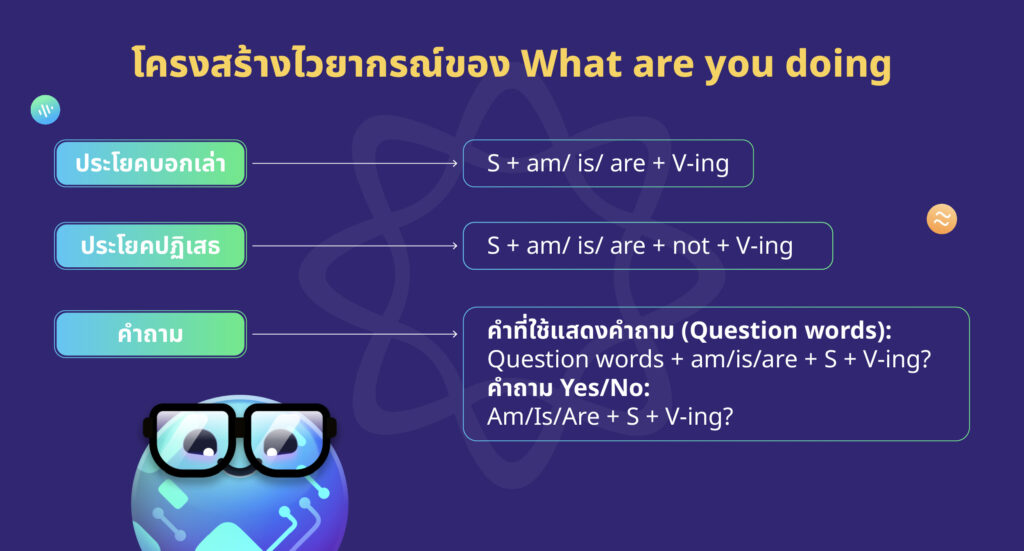
>> ดูเพิ่มเติม:
วิธีเน้นเสียงเมื่อถามคำถาม What are you doing?
คำถาม What are you doing? มีหลายวิธีในการเน้นเสียง ขึ้นอยู่กับ:
- ความสัมพันธ์ระหว่างผู้พูดและผู้ฟัง: ขึ้นอยู่กับความสัมพันธ์ที่ใกล้ชิดหรือไม่คุ้นเคย ระดับ บริบทการสื่อสาร…เสียงและความหมายของคำถามจะแตกต่างกัน เช่น เวลาถามคำถามกับเจ้านาย น้ำเสียงจะสุภาพมากกว่าถามเพื่อน
- สถานการณ์เฉพาะ: สถานการณ์การสื่อสารแต่ละสถานการณ์จะมีวิธีใช้คำถามนี้แตกต่างกัน เช่น เมื่อคุณเห็นใครทำอะไรที่เป็นอันตรายหรือคุณไม่พอใจกับการกระทำนั้น คุณจะถามด้วยน้ำเสียงเตือนหรือรำคาญ
ตัวอย่าง:
เพื่อนคนหนึ่งกำลังทำงานในคอมพิวเตอร์ และคุณเห็นพวกเขาเลื่อนดู Facebook คุณถาม: What are you doing? ด้วยน้ำเสียงที่ตำหนิหน่อยๆ และเน้นไปที่ you นี่หมายความว่าคุณคิดว่าเพื่อนคนนั้นละเลยงานของ คุณกำลังไปเดินเล่นและเห็นใครบางคนวาดภาพ คุณสงสัยและถามว่า What are you doing? ด้วยน้ำเสียงอยากรู้อยากเห็นและเน้นในคำว่า doing นี่หมายความว่าคุณต้องการรู้ว่าพวกเขากำลังวาดอะไร
วิธีถามคล้ายๆกับ What are you doing?

นอกเหนือจาก What are you doing คุณสามารถใช้โครงสร้างอื่นๆ ที่คล้ายกันด้านล่างนี้:
| คำถาม | ความหมาย | ตัวอย่าง |
| What’s keeping you busy? | อะไรที่ทำให้คุณยุ่งอยู่? | A: Hey Janice, it’s been so long! How are you doing? What’s keeping you busy these days? (หวัดดี เจนิส นานมากเลยที่ไม่ได้เจอกัน เป็นยังไงบ้าง มีอะไรทำให้คุณยุ่งๆ บ้างในช่วงนี้) B: Oh, I’m doing great! I’ve been really busy with my new job. It’s a lot of work, but I’m enjoying it. (โอ้ ฉันสบายดี ฉันยุ่งมากกับงานใหม่ของฉัน มันเป็นงานหนักมาก แต่ฉันก็สนุกกับมัน) |
| What are you up to? | คุณทำอะไรอยู่? | A: Hey Anna, what a surprise to see you here! What are you up to? (เฮ้ แอนนา เซอร์ไพรส์จริงๆ ที่เจอคุณที่นี่ คุณกำลังทำอะไรอยู่) B: Not much, just grabbing a coffee. I’m actually trying to finish this report before the deadline. (ไม่ได้อะไรมาก แค่ดื่มกาแฟ ฉันกำลังพยายามเขียนรายงานนี้ให้เสร็จก่อนกำหนด) |
| Any exciting plans for today? | วันนี้มีแผนอะไรที่น่าตื่นเต้นบ้างไหม? | A: Hey, what are you doing? Any exciting plans for today? (เฮ้ คุณทำอะไรอยู่ มีแผนอะไรที่น่าตื่นเต้นสำหรับวันนี้หรือเปล่า?) B: Oh, not much. I was thinking of going for a walk. Want to join me? (อ๋อ ไม่ค่อยเท่าไหร่ ฉันคิดว่าจะไปเดินเล่นสักหน่อย อยากร่วมเดินเล่นกันไหม) |
| What have you been working on lately? | พักหลังๆมานี่ คุณได้ทำอะไรมาบ้าง? | A: Hi Krystal, how’s work going? What have you been working on lately? (สวัสดีคริสตัล งานเป็นยังไงบ้าง? พักหลังๆมานี่ คุณได้ทำอะไรมาบ้าง?) B: It’s going well. I’ve been working on a new marketing campaign for our latest product. (กำลังไปได้ดี ฉันกำลังทำแคมเปญการตลาดใหม่สำหรับผลิตภัณฑ์ล่าสุดของเรา) |
| What’s new with you? | มีอะไรใหม่บ้าง? | A: Hey bestie, it’s great to see you again! What’s new with you? (เฮ้เพื่อนรัก ดีใจที่ได้เจอคุณอีกครั้ง มีอะไรใหม่ๆ บ้าง?) B: Yes. I just moved into a new apartment last week, started my job at a new company across the country, my girlfriend has just cheated on me and my sister got a divorce. All of that in just 2 months. (ครับ ผมเพิ่งย้ายเข้าอพาร์ทเมนท์ใหม่เมื่อสัปดาห์ที่แล้ว เริ่มทำงานที่บริษัทต่างประเทศใหม่แห่งหนึ่ง แฟนผมเพิ่งนอกใจฉัน และน้องสาวผมก็หย่าร้าง ทั้งหมดนี้เกิดขึ้นภายในเวลาแค่ 2 เดือน) |
แยกแยะระหว่าง What are you doing และ How are you doing
ผู้เรียนบางคนมักสับสนระหว่างคำถาม What are you doing? และ How are you doing? แล้วความหมายและการใช้ How are you do และ What are you doing แตกต่างกันอย่างไร? มาแยกแยะรายละเอียดกับ ELSA Speak กันเลย

| What are you doing? | How are you doing? | |
| ความหมาย | คุณกำลังทำอะไรอยู่? | คุณเป็นอย่างไรบ้าง? |
| วิธีการใช้ | ประโยคคำถามใช้เพื่อถามเกี่ยวกับการกระทำที่กำลังดำเนินอยู่ในปัจจุบันของอีกฝ่าย | คำถามที่ใช้เพื่อถามเกี่ยวกับสถานการณ์สุขภาพของอีกฝ่าย คล้ายกับคำถาม How are you มักใช้ในการสนทนาใกล้ชิดกับคนที่คุณรู้จักหรือมีความสัมพันธ์ที่ดีด้วยมาก่อน นอกจากนี้ยังเป็นคำถามเพื่อการสื่อสารที่ใช้ในการเริ่มการสนทนาอีกด้วย |
| ตัวอย่าง | A: What are you doing now? (คุณกำลังทำอะไรอยู่?) B: I’m hiking with friends. (ฉันกำลังเดินป่ากับเพื่อนๆ) | A: Hey, long time no see! How are you doing? (เฮ้ ไม่เจอกันนานเลยนะ สบายดีไหม?) B: I’m fine, thanks. How about you? (ฉันสบายดี ขอบคุณ แล้วคุณล่ะ?) |
>> ดูเพิ่มเติม: How are you? มาเรียนรู้ 90+ วิธีถามแบบอื่นและวิธีตอบที่น่าสนใจยิ่งกว่าเดิม
บทสนทนาถาม-ตอบ What are you doing

บทสนทนาที่ 1: พบเจอเพื่อนเก่าในงาน
| นักสื่อสาร | ประโยคในการสนทนา | ความหมาย |
| Anna | Hey, Josh! Long time no see! How are you doing? | เฮ้ Josh ไม่เจอกันนานเลยนะ สบายดีไหม? |
| Josh | I’m doing great, and you? | ผมสบายดี แล้วคุณล่ะ? |
| Anna | I’m good too. So, what are you doing these days? | ฉันก็สบายดี แล้วช่วงนี้คุณทำอะไรอยู่ |
| Josh | I’m working for a startup company. It’s really busy but also exciting. | ผมทำงานในบริษัทสตาร์ทอัพ เป็นบริษัทที่ยุ่งมากแต่ก็น่าตื่นเต้นมากเช่นกัน |
| Anna | That sounds interesting! I’ve been thinking about trying something like that too. | ฟังดูน่าสนใจนะ! ฉันก็คิดจะลองทำแบบนั้นเหมือนกัน |
บทสนทนาที่ 2: ส่งข้อความถึงเพื่อนเก่าผ่านโซเชียลเน็ตเวิร์ก
| นักสื่อสาร | ประโยคในการสนทนา | ความหมาย |
| Jim | Hey, buddy! It’s been a while. What are you doing these days? | เฮ้เพื่อน หายไปนานเลยนะ ช่วงนี้ทำอะไรอยู่ |
| Levis | I’m doing fine. I’ve been taking a graphic design course. | ผมสบายดี ผมกำลังเรียนหลักสูตรออกแบบกราฟิก |
| Jim | That sounds cool! I’ve been wanting to learn something new too. | ฟังดูเจ๋งดี! ผมอยากเรียนรู้อะไรใหม่ๆ เหมือนกัน |
| Levis | You could try learning a new language. I’m learning Spanish. | คุณน่าจะลองเรียนภาษาใหม่ดูนะ ผมกำลังเรียนภาษาสเปน |
คำถามที่พบบ่อย
What are you doing right now แปลว่าอะไร?
What are you doing now? แปลว่า คุณกำลังทำอะไรอยู่? เป็นคำถามที่มักใช้ถามเกี่ยวกับการกระทำหรือกิจกรรมที่ใครๆ กำลังทำอยู่ตอนนี้
What are you doing today แปลว่าอะไร?
What are you doing today? แปลว่า วันนี้คุณทำอะไร? ใช้เพื่อถามถึงแผนการหรือกิจกรรมที่คนวางแผนจะทำในวันนั้น
How are you doing แปลไทยว่าอะไร?
How are you doing แปลเป็นไทยว่า คุณเป็นอย่างไรบ้าง? มักใช้ถามถึงอาการ สุขภาพ หรือความรู้สึกของใครบางคนในการสนทนาในชีวิตประจำวัน
What are you doing right now แปลว่าอะไร?
What are you doing right now แปลว่า คุณกำลังทำอะไรอยู่ตอนนี้?
จากบทความนี้ เราได้ค้นพบคำถาม What are you doing ตอบอย่างไร หวังว่าความรู้นี้จะช่วยให้คุณมั่นใจในการสื่อสารภาษาอังกฤษมากขึ้น นอกจากนี้อย่าลืมเข้าชม ELSA Speak เป็นประจำเพื่ออัปเดทความรู้ภาษาอังกฤษล่าสุดทุกวันกันนะ!
ภาษาอังกฤษเป็นภาษาที่มีความหลากหลายคำศัพท์ โดยคำอุปสรรคและคำปัจจัยมีบทบาทสำคัญมาก พวกคำเหล่านี้นอกจากช่วยเพิ่มพูนคลังคำศัพท์ของคุณแล้ว อีกทั้งยังช่วยให้การสื่อความหมายของคุณเข้าใจง่ายมากยิ่งขึ้น แล้วคำอุปสรรคและคำปัจจัยคืออะไร? มีรูปแบบใดบ้าง? มาเรียนรู้ prefix suffix อย่างละเอียดไปพร้อมกับ ELSA Speak ด้านล่างนี้เลย!
Prefix Suffix คืออะไร?
Prefix คืออะไร?
คำอุปสรรค (Prefixes) คือกลุ่มตัวอักษรที่ถูกเติมไว้ข้างหน้าคำเพื่อเปลี่ยนแปลงความหมายหรือเพิ่มความหมายที่แตกต่างจากรากศัพท์
ตัวอย่าง: คำ disclose ประกอบด้วย
- คำอุปสรรค dis- (หมายถึง “ไม่”)
- รากศัพท์ -close (หมายถึง “ปิด”)
=> Disclose มีความหมายว่า: เปิดเผย หรือแฉให้เห็น
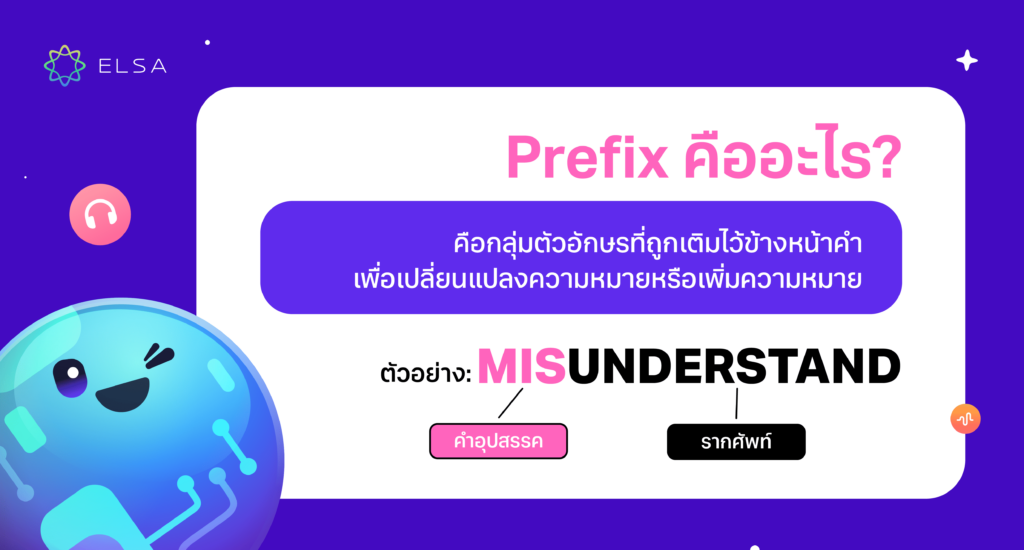
Suffix คืออะไร?
ตรงกันข้ามกับคำอุปสรรค (Prefix) คำปัจจัย (Suffix) คือกลุ่มตัวอักษรที่ถูกเติมไว้ท้ายคำของรากศัพท์เพื่อแสดงประเภทของคำศัพท์นั้น
ตัวอย่าง: คำปัจจัย -ion ถูกเติมหลังคำกริยา act เพื่อเปลี่ยนเป็นคำนาม action (การกระทำ)
นอกจากนี้ ผ่านคำปัจจัย (Suffix) เรายังสามารถทราบได้ว่าคำกริยาอยู่ในรูปแบบใด หรือคำนามเป็นรูปเอกพจน์หรือพหูพจน์ คำปัจจัย (Suffix) ที่พบได้บ่อยที่สุด ได้แก่ -er, -s, –es, -ed, -ing, -ly

Prefix Suffix ตัวอย่างประโยค
คำอุปสรรค (Prefix)
- Un + happy = Unhappy (ไม่มีความสุข)
ตัวอย่าง: She felt unhappy because of the bad news. (เธอรู้สึกไม่มีความสุขเพราะได้รับข่าวร้าย)
- Re + write = Rewrite (เขียนใหม่)
ตัวอย่าง: I had to rewrite the essay to meet the requirements. (ฉันต้องเขียนเรียงความใหม่เพื่อให้ตรงกับข้อกำหนด)
คำปัจจัย (Suffix)
- Play + er = Player (ผู้เล่น)
ตัวอย่าง: He is a talented football player. (เขาเป็นนักฟุตบอลที่มีพรสวรรค์)
- Kind + ness = Kindness (ความเมตตา)
ตัวอย่าง: Her kindness towards strangers was heartwarming. (ความเมตตาของเธอต่อคนแปลกหน้าช่างน่าอบอุ่นหัวใจ)

หน้าที่ของ Prefix ในภาษาอังกฤษ
หน้าที่ของ Prefix (คำอุปสรรค)
คำอุปสรรคมีหน้าที่เปลี่ยนแปลงความหมายของรากศัพท์ (เช่น จากความหมายเชิงบวกเป็นเชิงลบ) หรือเพื่อแสดงมุมมองต่าง ๆ
ตัวอย่าง:
- Moral (มีศีลธรรม) – Amoral (ไม่มีศีลธรรม)
- Comfortable (สบาย) – Uncomfortable (ไม่สบาย)
- Logical (สมเหตุสมผล) – Illogical (ไม่สมเหตุสมผล)
เมื่อเติมคำอุปสรรคในคำศัพท์ การออกเสียงของรากศัพท์จะยังคงเดิม โดยทั่วไป ผู้ใช้สามารถใช้เครื่องหมายขีดกลาง (-) เชื่อมระหว่างคำอุปสรรคและรากศัพท์ การใช้เครื่องหมายขีดกลางจะช่วยหลีกเลี่ยงการอ่านผิด การออกเสียงผิด หรือการสับสนกับคำอื่น
หน้าที่ของ Suffix (คำปัจจัย)
คำปัจจัย Suffix verb, noun, adjective มีหน้าที่เปลี่ยนแปลงประเภทของคำจากรากศัพท์ เช่น เปลี่ยนคำนามเป็นคำกริยาหรือคำคุณศัพท์
ví dụ:
- Relate (Verb) – Relation (noun) – Relatable (adjective)
- Continue (verb) – Continuity (noun) – Continuous (adjective)
- Happy (adjective) – Happiness (noun)
เมื่อเติมคำปัจจัยไว้หลังคำศัพท์ การออกเสียงของรากศัพท์จะยังคงเดิม อย่างไรก็ตาม ต่างจากคำอุปสรรค คำปัจจัยจะเชื่อมติดกับรากศัพท์โดยตรงและไม่มีการใช้เครื่องหมายขีดกลาง (-)
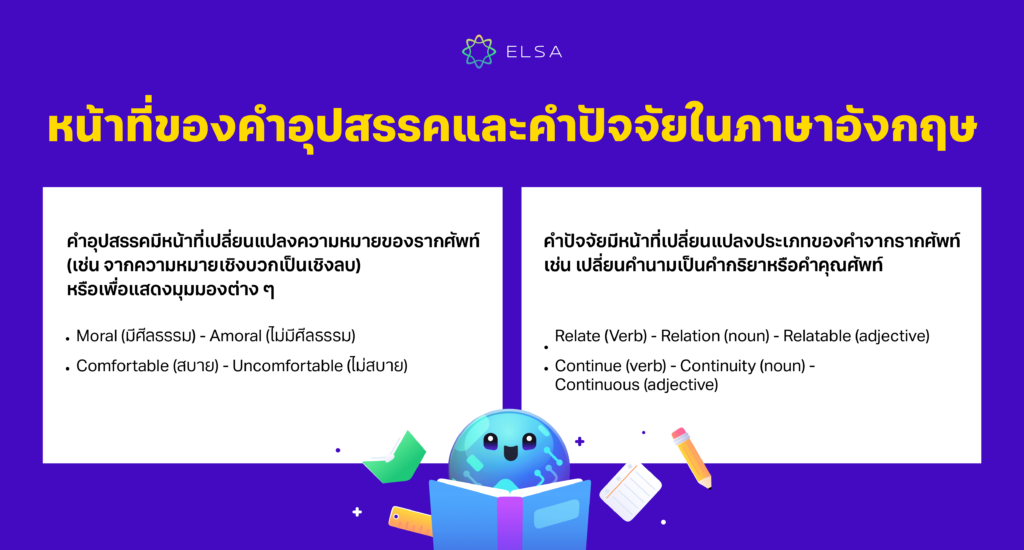
รวม Prefix (คำอุปสรรค) ที่พบบ่อยในภาษาอังกฤษ
คำอุปสรรคแสดงความปฏิเสธ
| Prefix คําศัพท์ | ความหมาย | ตัวอย่าง |
| a-, an- | ไม่ ไม่มี | Atypical (ผิดปกติ) Anemia (ภาวะโลหิตจาง) |
| anti- | ต่อต้าน ขัดแย้ง | Antibiotic (ยาปฏิชีวนะ) Antifreeze (สารป้องกันการแข็งตัว) |
| de- | เอาออก ลดลง | Deconstruct (รื้อถอน) Detoxify (ล้างพิษ) |
| dis- | หยุด ทำตรงข้าม | Discredit (ทำลายความน่าเชื่อถือ) Disconnect (ตัดการเชื่อมต่อ) |
| il-, im-, in-, ir- | ไม่ ไม่มี | Illogical (ไม่มีเหตุผล) Imperfect (ไม่สมบูรณ์) Insecure (ไม่ปลอดภัย) Irregular (ไม่ปกติ) |
| non- | ไม่ ไม่ใช่ | Nonexistent (ไม่มีอยู่) Nontraditional (ไม่ดั้งเดิม) |
| un- | ไม่ ตรงข้าม | Unpredictable (คาดเดาไม่ได้) Unreliable (ไม่น่าเชื่อถือ) |
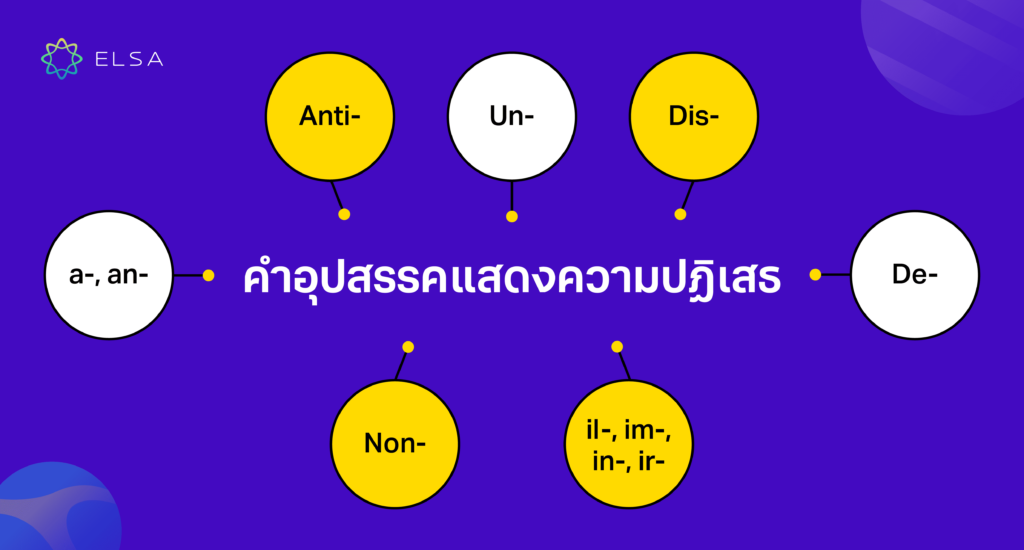
>>> Read more: Negative sentence (ประโยคปฏิเสธ): ตัวอย่าง และโครงสร้างประโยค
คำอุปสรรคที่แสดงเวลา
| คำอุปสรรค | ความหมาย | ตัวอย่าง |
| ante- | ก่อน | Antedate (วันที่ก่อนหน้า) Antebellum (ก่อนสงคราม) |
| post- | หลัง | Posthumous (หลังความตาย) Postgraduate (หลังระดับมหาวิทยาลัย) |
| pre- | ก่อน | Preemptive (ล่วงหน้า) Prepay (ชำระล่วงหน้า) |
| re- | อีกครั้ง | Rebuild (สร้างใหม่) Renew (ต่ออายุ) |
| retro- | ย้อนกลับไปในอดีต | retrospective (มองย้อนกลับ) Retroactive (มีผลย้อนหลัง) |

คำอุปสรรคที่แสดงตำแหน่ง
| คำอุปสรรค | ความหมาย | ตัวอย่าง |
| circum- | ข้าม ผ่าน | Circumvent (หลีกเลี่ยง เลี่ยงกฎหมาย) Circumstance (สถานการณ์) |
| epi- | บน ภายนอก | Epitome (ตัวอย่างที่ดี) Epiphany (การตระหนักรู้ เหตุการณ์สำคัญ) |
| inter- | ระหว่าง เชื่อมโยง | Intervene (แทรกแซง) International (ระหว่างประเทศ) |
| intra- | ภายใน | Intramural (ในเขต) Intranet (เครือข่ายภายในองค์กร) |
| para- | ข้าง ๆ ขนานกัน | Paralegal (ผู้ช่วยทนาย) Parasite (ปรสิต) |
| peri- | รอบ ๆ | Periscope (กล้องส่องทางไกล) Periodic (เป็นระยะ เป็นช่วง) |
| sub- | ใต้ รอง | Substitute (แทนที่) Subordinate (อยู่ใต้บังคับบัญชา) |
| super- | เหนือ ยิ่งใหญ่กว่า | Supernatural (เหนือธรรมชาติ) Supervision (การควบคุมดูแล) |
| trans- | ข้าม ผ่าน | Transcend (เหนือกว่า เลิศกว่า) Transport (ขนส่ง) |
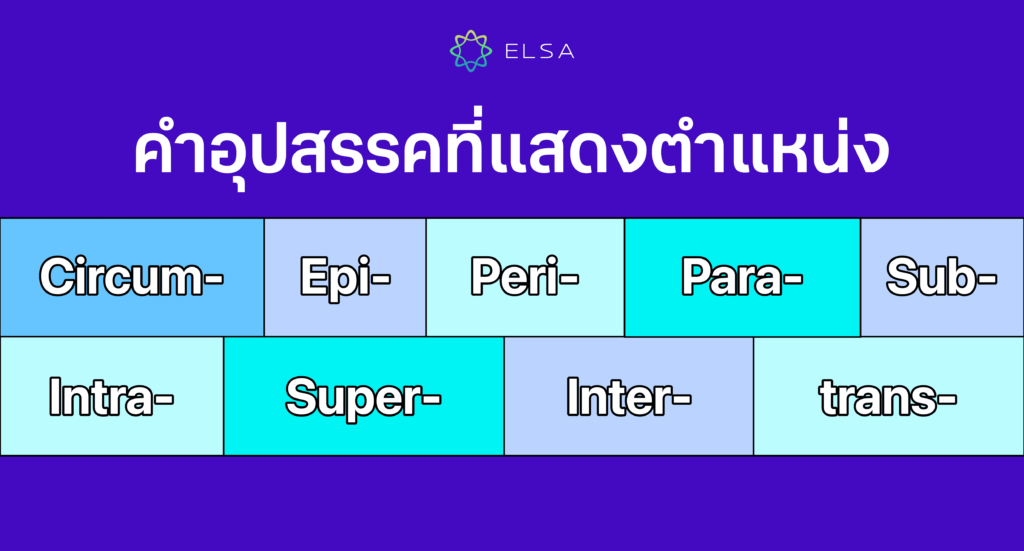
คำอุปสรรคที่แสดงจำนวน
| คำอุปสรรค | ความหมาย | ตัวอย่าง |
| bi- | สอง คู่ | Bicycle (จักรยานสองล้อ) Bisect (แบ่งครึ่ง) |
| Duo-, Du | สอง คู่ | Duopoly (ตลาดที่มีผู้ขายสองราย) Duplex (บ้านสองชั้น) |
| hemi- | ครึ่ง | Hemiparesis (อาการอ่อนแรงครึ่งซีก) Hemipod (ครึ่งหนึ่งของโครงสร้างทรงกรวย) |
| mono- | หนึ่ง เดี่ยว | Monopoly (การผูกขาด) Monotone (เสียงราบเรียบ) |
| multi- | หลาย มาก | Multimedia (สื่อหลายรูปแบบ)) Multicultural (หลายวัฒนธรรม) |
| poly- | หลาย มาก | Polygraph (เครื่องจับเท็จ) Polytheism (ความเชื่อในพระเจ้าหลายองค์) |
| semi- | ครึ่ง | Seminar (การประชุมสัมมนา) Semiannual (ครึ่งปี) |
| tri- | สาม | Triathlon (ไตรกีฬา) Trilogy (สามภาค) |
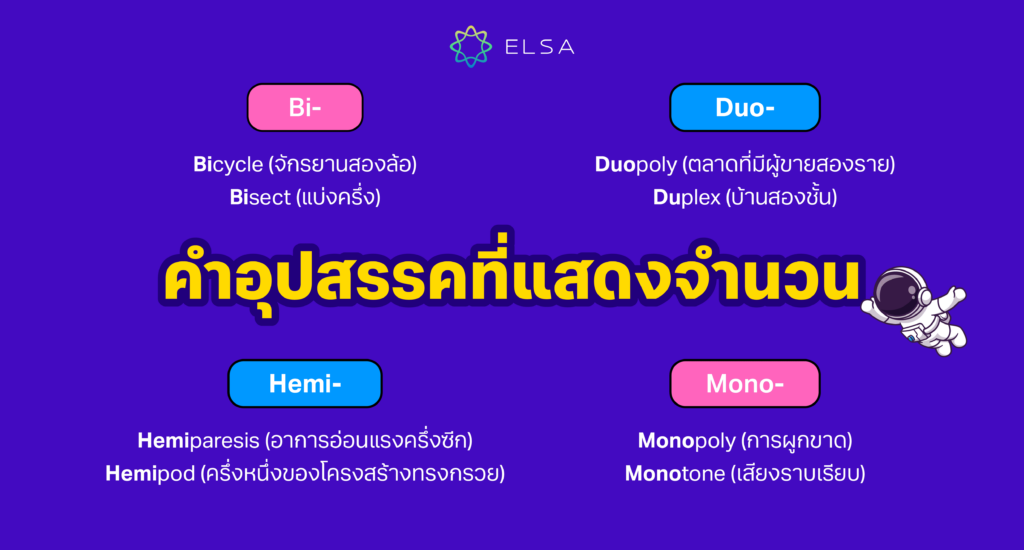
คำอุปสรรคอื่น ๆ
| คำอุปสรรค | ความหมาย | ตัวอย่าง |
| auto- | อัตโนมัติ | Autonomous (ปกครองตนเอง) Autopilot (ระบบขับเคลื่อนอัตโนมัติ) |
| bio- | เกี่ยวกับชีวิต | Biodegradable (ย่อยสลายได้ทางชีวภาพ) Biosphere (ชีวมณฑล) |
| ex- | อดีต เคยเป็น | Ex-girlfriend (แฟนเก่า) Ex-wife (อดีตภรรยา) |
| hyper- | เกินไป มากเกินไป | Hypertension ความดันโลหิตสูง) Hypersensitive (ไวต่อสิ่งเร้ามากเกินไป) |
| macro- | ใหญ่ กว้าง | Macrocosm (จักรวาล ภาพรวม) Macronutrient (สารอาหารหลัก) |
| micro- | เล็ก | Microphone (ไมโครโฟน) Microbe (จุลินทรีย์) |
| mis- | ผิด ไม่ถูกต้อง | Misbehave (ประพฤติตัวไม่ดี) Mismanage (จัดการผิดพลาด) |
| pseudo- | เทียม ปลอม | Pseudocode (รหัสปลอม) Pseudoclassical (เลียนแบบคลาสสิก) |
รวม Suffix (คำปัจจัย) ที่พบบ่อยในภาษาอังกฤษ
คำปัจจัยที่ทำให้เป็นคำนาม
| คำปัจจัย | ความหมาย | ตัวอย่าง |
| -acy | สถานะ สภาพ | Diplomacy (รากศัพท์: diplomatic) – การทูต Privacy (รากศัพท์: private) – ความเป็นส่วนตัว |
| -ance; -ence | สถานะ/คุณภาพ | Brilliance (รากศัพท์: brilliant) – ความยอดเยี่ยม Resistance (รากศัพท์: resist) – การต่อต้าน |
| -ity; -ty | คุณลักษณะของ… | Creativity (รากศัพท์: creative) – ความคิดสร้างสรรค์ Simplicity (รากศัพท์: simple) – ความเรียบง่าย |
| -al | การกระทำหรือกระบวนการ | Refusal (รากศัพท์: refuse) – การปฏิเสธ Arrival (รากศัพท์: arrive) – การมาถึง |
| -dom | สถานะ สภาพ | Kingdom (รากศัพท์: king) – อาณาจักร Boredom (รากศัพท์: bored) – ความเบื่อ |
| -ment | สภาพ | Development (รากศัพท์: develop) – การพัฒนา Enjoyment (รากศัพท์: enjoy) – ความสนุกสนาน |
| -ness | สถานะ สภาพ | Happiness (รากศัพท์: happy) – ความสุข Darkness (รากศัพท์: dark) – ความมืด |
| -sion; -tion | สถานะ | Attention (รากศัพท์: attend) – ความใส่ใจ Decision (รากศัพท์: decide) – การตัดสินใจ |
| -er; -or | บุคคล/สิ่งของ | Writer (รากศัพท์: write) – นักเขียน Director (รากศัพท์: direct) – ผู้กำกับ |
| -ist | บุคคลในอาชีพเฉพาะ | Journalist (รากศัพท์: journal) – นักข่าว Biologist (รากศัพท์: biology) – นักชีววิทยา |
| -ism | ลัทธิ/ความเชื่อ | Realism (รากศัพท์: real) – ลัทธิความจริง Socialism (รากศัพท์: social) – ลัทธิสังคมนิยม |
| -ship | ตำแหน่งหรือบทบาท | Leadership (รากศัพท์: leader) – ความเป็นผู้นำ Partnership (รากศัพท์: partner) – ความร่วมมือ |
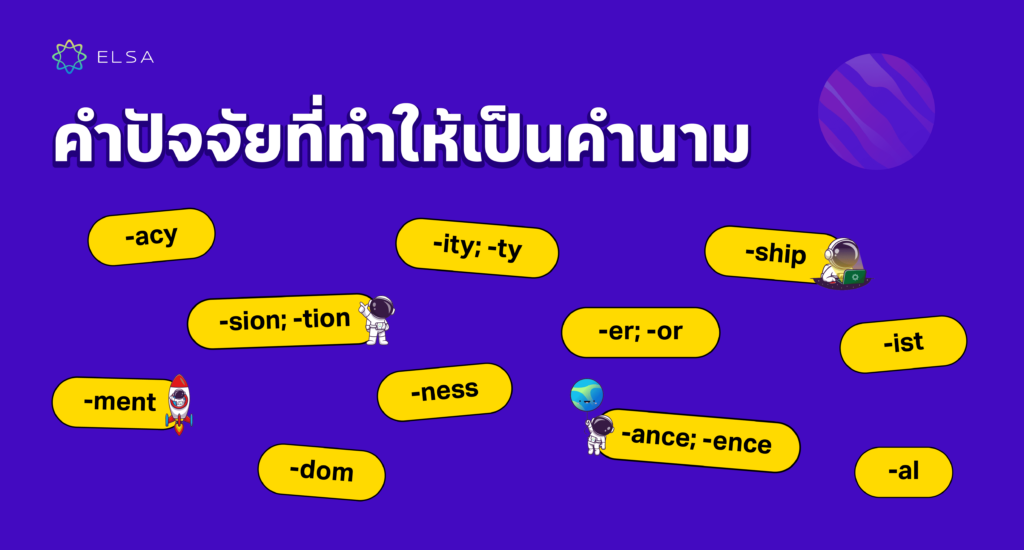
คำปัจจัยที่ทำให้เป็นคำคุณศัพท์
| คำปัจจัย | ความหมาย | ตัวอย่าง |
| -able; -ible | สามารถ…ได้ | Readable – อ่านได้ Perceptible – สังเกตได้ |
| -al | ลักษณะของ… | Natural – เกี่ยวกับธรรมชาติ Cultural – เกี่ยวกับวัฒนธรรม |
| -esque | คล้ายกับ… | Romanesque – ตามสไตล์ Romanesque (สถาปัตยกรรม) Statuesque – เหมือนรูปปั้น (สวย สง่างาม) |
| -ive | เกี่ยวข้องกับ มุ่งไปที่ | Sensitive – อ่อนไหว Active – กระตือรือร้น |
| -ic; -ical | มีรูปแบบ/ลักษณะของ… | Geographic – เกี่ยวกับภูมิศาสตร์ Critical – สำคัญ วิจารณ์ |
| -ious; -ous | เกี่ยวกับคุณสมบัติ/ลักษณะนิสัย | Dangerous – อันตราย Mysterious – ลึกลับ |
| -ish | มีคุณภาพของ… | Greenish – ออกสีเขียว Tallish – ค่อนข้างสูง |
| -ful | มาก | Beautiful – สวย Thoughtful – รอบคอบ |
| -less | ไม่มี | Hopeless – สิ้นหวัง Tireless – ไม่รู้จักเหน็ดเหนื่อย |
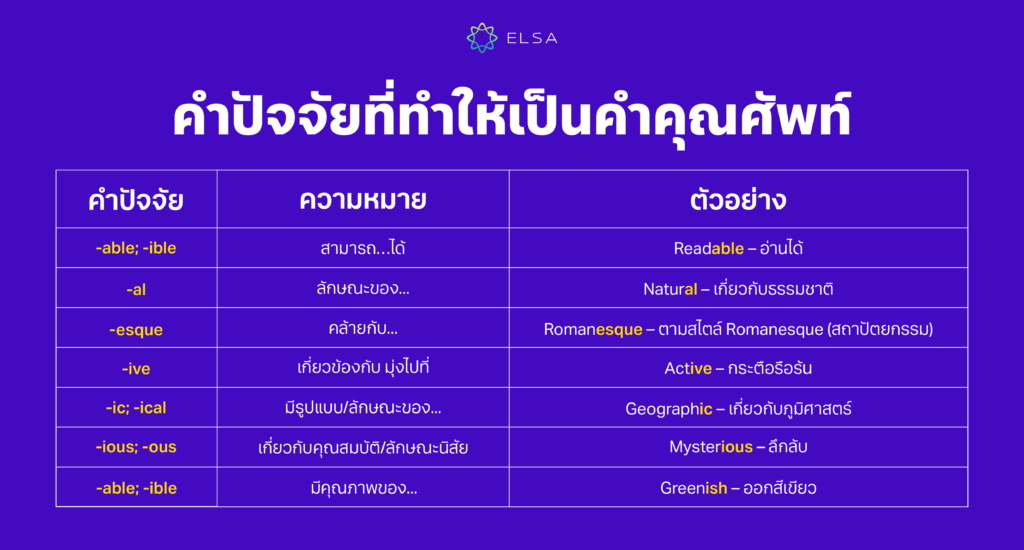
คำปัจจัยที่ทำให้เป็นคำกริยา
| คำปัจจัย | ความหมาย | ตัวอย่าง |
| -ate | กลายเป็น | Educate – ให้การศึกษา Formulate – สร้างขึ้น กำหนดขึ้น |
| -en | กลายเป็น | Widen – ทำให้กว้างขึ้น Hasten – เร่ง ทำให้เร็วขึ้น |
| -ify; -fy | กลายเป็น | Intensify –เสริมความเข้มข้น ทำให้แรงขึ้น Clarify – ทำให้ชัดเจน |
| -ise; -ize | กลายเป็น | Realise (British English) – ตระหนัก Organize (American English) – จัดระเบียบ |
| – ish | มีลักษณะ | Selfish – เห็นแก่ตัว Childish – เหมือนเด็ก |
| -ing | กำลังทำ | Acting – กำลังแสดง Making – กำลังทำGiving – กำลังให้ |
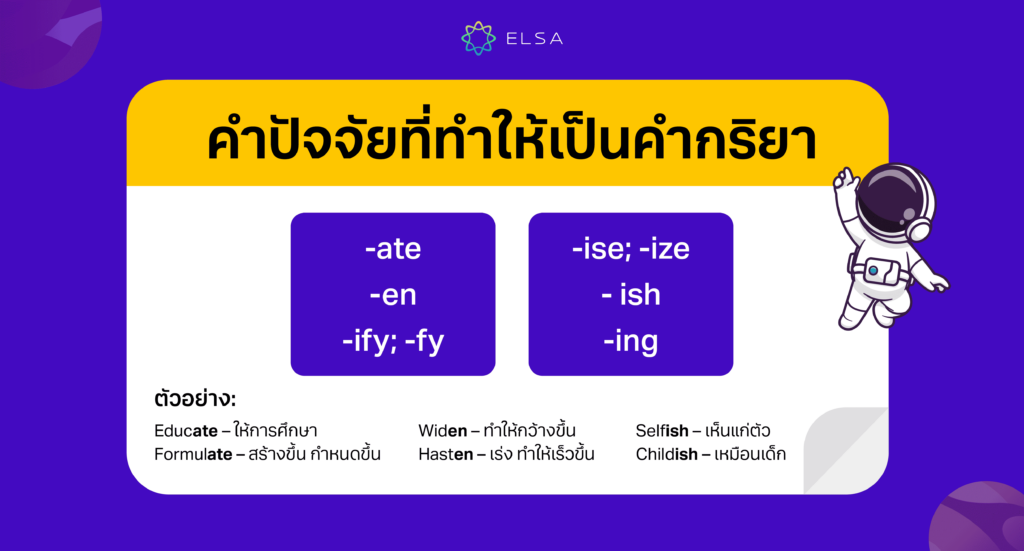
คำปัจจัยที่ทำให้เป็นคำวิเศษณ์
| คำปัจจัย | ความหมาย | ตัวอย่าง |
| -ly | เกี่ยวกับคุณภาพ | Happily – อย่างมีความสุข Easily – อย่างง่ายดาย |
| -ward; -wards | ทิศทาง | Upward – ขึ้นด้านบน Forward – ไปข้างหน้า |
| -wise | เกี่ยวข้องกับ | Clockwise – ตามเข็มนาฬิกา Lengthwise – ตามความยาว |
| -free | ไม่มี ปราศจาก | Sugar-free – ปราศจากน้ำตาล Allergy-free – ปราศจากสารก่อภูมิแพ้ |
| -style | ตามสไตล์ | Casual-style – สไตล์ลำลอง Vintage-style – สไตล์วินเทจ |
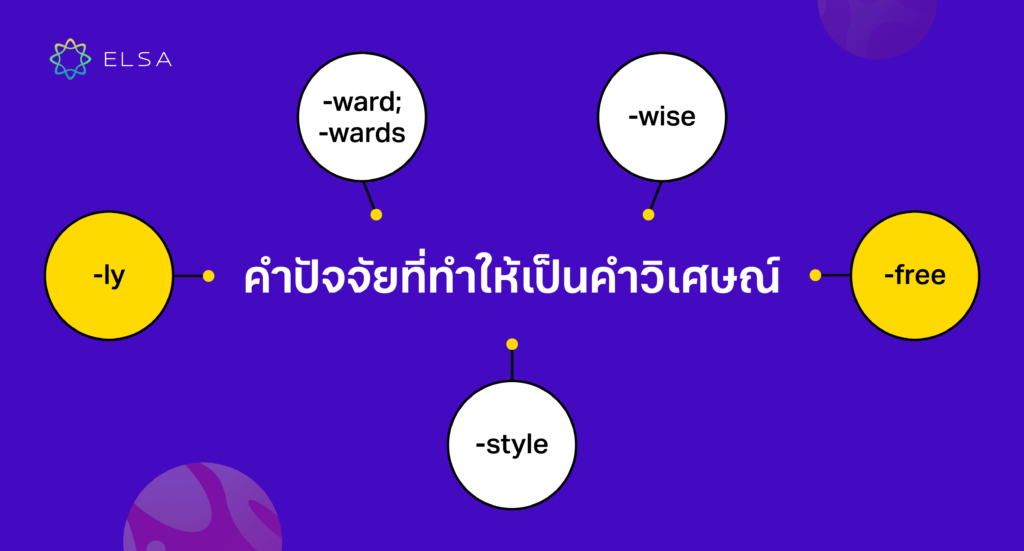
ข้อควรระวังสำคัญเกี่ยวกับ Prefix และ Suffix
ข้อควรระวังเกี่ยวกับ Prefix (คำอุปสรรค)
- คำอุปสรรคในภาษาอังกฤษสามารถมีความหมายเหมือนกันได้ เช่น un-, in-, และ non- ต่างก็มีความหมายว่า “ไม่” หรือ “ตรงข้าม”
- อาจมีการซ้ำของตัวอักษร เช่น เมื่อเติม im- หน้าคำที่ขึ้นต้นด้วยตัว m จะได้ตัว m ซ้ำ เช่น immeasurable เป็นต้น
- การเติมคำอุปสรรคจะไม่เปลี่ยนการสะกดของรากศัพท์ เช่น การเติมคำอุปสรรค un- อยู่ข้างหน้า happy จะไม่เปลี่ยนการสะกดหรือการออกเสียงของคำ happy
- ระวังคำที่ดูเหมือนมีคำอุปสรรค (Prefix) แต่แท้จริงแล้วไม่ใช่ เช่น คำว่า uncle, reach, real เป็นต้น
ข้อควรระวังเกี่ยวกับ Suffix (คำปัจจัย)
- คำปัจจัยบางคำสามารถมีหลายความหมาย เช่น คำที่ลงท้ายด้วย -er นอกจากจะหมายถึง “ผู้ที่ทำบางสิ่ง” (เช่น painter, singer) ยังใช้ในความหมาย “เปรียบเทียบความเหนือกว่าหรือน้อยกว่า” (เช่น faster, quicker)
- การสะกดของรากศัพท์อาจเปลี่ยนไปเมื่อเติมคำปัจจัย โดยเฉพาะคำที่ลงท้ายด้วย -y เช่น เมื่อเติม -ness หลังคำว่า crazy จะเปลี่ยน y เป็น i กลายเป็น craziness
- การเติมคำปัจจัย -able เข้ากับคำพื้นฐานที่ลงท้ายด้วย -e อาจต้องตัดตัว e ท้ายรากศัพออกในบางกรณี (เช่น usable) แต่ในบางกรณีอาจต้องคงตัว e ไว้ (เช่น changeable, loveable)
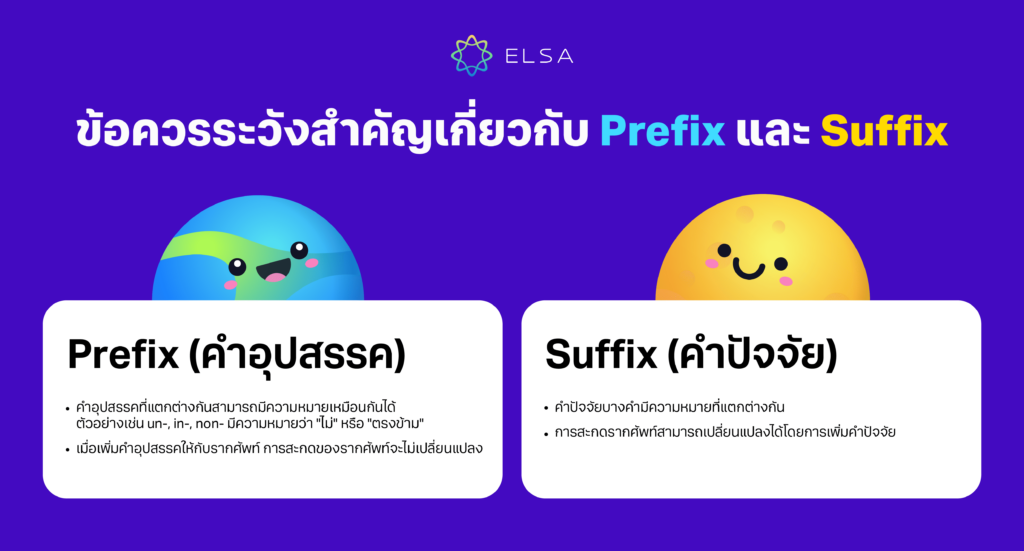
รวมคำศัพท์ที่มี Prefix และ Suffix ที่ใช้บ่อย
| คำอุปสรรค (Prefix) | รากศัพท์ (Root Word) | คำปัจจัย (Suffix) | คำศัพท์ (Word) |
| Un | Accept | able | Unacceptable |
| Dis | Respect | ful | Disrespectful |
| Un | Like | ly | Unlikely |
| A | Theist | ic | Atheistic |
| Im | Possible | ible | Impossible |
| In | Accurate | ly | Inaccurately |
| Re | Act | ive | Reactive |
| Mis | Interpret | ation | Misinterpretation |
| Over | Cook | ed | Overcooked |
| Under | Estimate | ion | Underestimation |
| Dis | Connect | ed | Disconnected |
| Anti | Social | able | Antisocial |
| De | Activate | ion | Deactivation |
| Pro | Motive | ate | Promote |
| Trans | Form | ation | Transformation |
| Pre | Determine | ed | Predetermined |
| Inter | National | al | International |
| Non | Fiction | al | Nonfictional |
| Post | War | like | Postwar-like |
| Bi | Weekly | ly | Biweekly |
| Multi | Task | ing | Multitasking |
| Hyper | Active | ity | Hyperactivity |
| Semi | Circle | ar | Semicircular |
| Super | Natural | ly | Supernaturally |
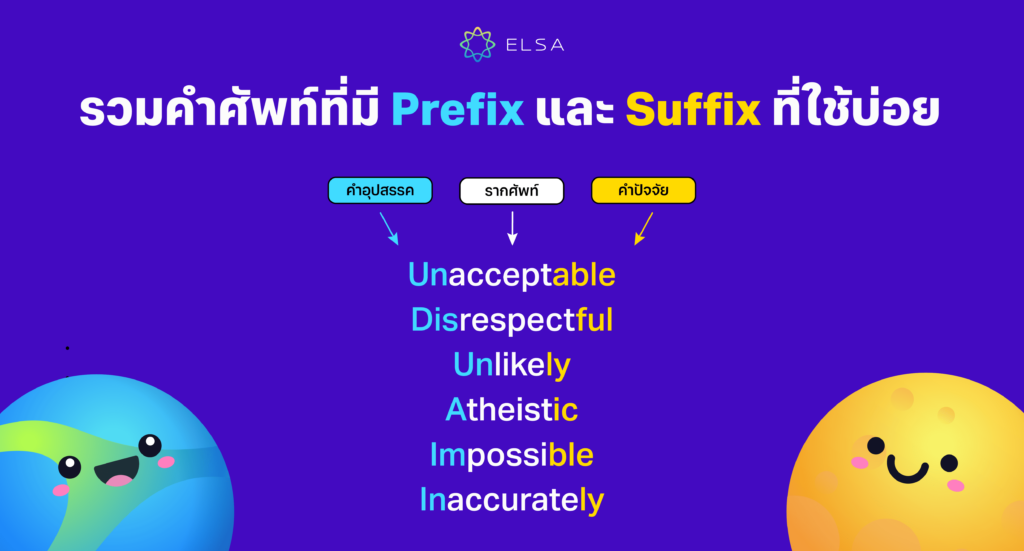
แบบฝึกหัด
แบบฝึกหัด
แบบฝึกหัดที่ 1: เติมคำในวงเล็บลงในช่องว่างด้วยการเติม Prefix หรือ Suffix ให้เหมาะสมที่สุด
1. He was acting in a very ….. way. (child)
2. She looked ….. .She started to cry. (happy)
3. He passed his exam. He was ….. for the second time. (succeed)
4. The team that he supported was able to win the ….. . (champion)
5. I couldn’t find any ….. in his theory. (weak)
6. He wants to be a ….. when he grows up. (mathematics)
7. There were only a ….. of people at the match. (hand)
8. The road was too narrow, so they had to ….. it. (wide)
9. I think that you should ….. your decision. It may not be the best thing to do. (consider)
10. You need a ….. of motivation, organization, and hard work to realize your dreams. (combine)
แบบฝึกหัดที่ 2: เติม Prefix หรือ Suffix ที่เหมาะสมลงในช่องว่างเพื่อให้ประโยคสมบูรณ์
1. You can’t _____ (do) what’s already been done.
2. His support gives the case _____ (legitimate).
3. The lesson is full of mistakes, we will have to _____ (write) it.
4. Jane is the most _____ (grace) dancer in the group.
5. The situation is not as _____ (help) as you think. There are some options.
6. My son is much more _____ (responsible) than my daughter. He never does his homework.
7. I might not like it, but I don’t _____ (approve).
8. To me, there is nothing worse than _____ (bore).
9. Dogs are great for those looking for _____ (companion).
10. She has a very _____ (regular).
เฉลย
แบบฝึกหัดที่ 1:
| 1. childish | 2. unhappy | 3. successful | 4. championship | 5. weakness |
| 6. mathematician | 7. handful | 8. widen | 9. reconsider | 10. combination |
แบบฝึกหัดที่ 2:
| 1. undo | 2. legitimacy | 3. rewrite | 4. graceful | 5. helpless |
| 6. irresponsible | 7. disapprove | 8. boredom | 9. companionship | 10. irregular |
นี่คือความรู้ทั้งหมดเกี่ยวกับ Prefix และ Suffix ในภาษาอังกฤษที่คุณสามารถใช้ศึกษาเพิ่มเติม หวังว่าข้อมูลเหล่านี้จะช่วยพัฒนาคลังคำศัพท์ของคุณได้อย่างมีประสิทธิภาพมากยิ่งขึ้น และอย่าลืมเข้าชม ELSA Speak เป็นประจำเพื่ออัปเดตความรู้ภาษาอังกฤษใหม่ ๆ ทุกวันนะ!